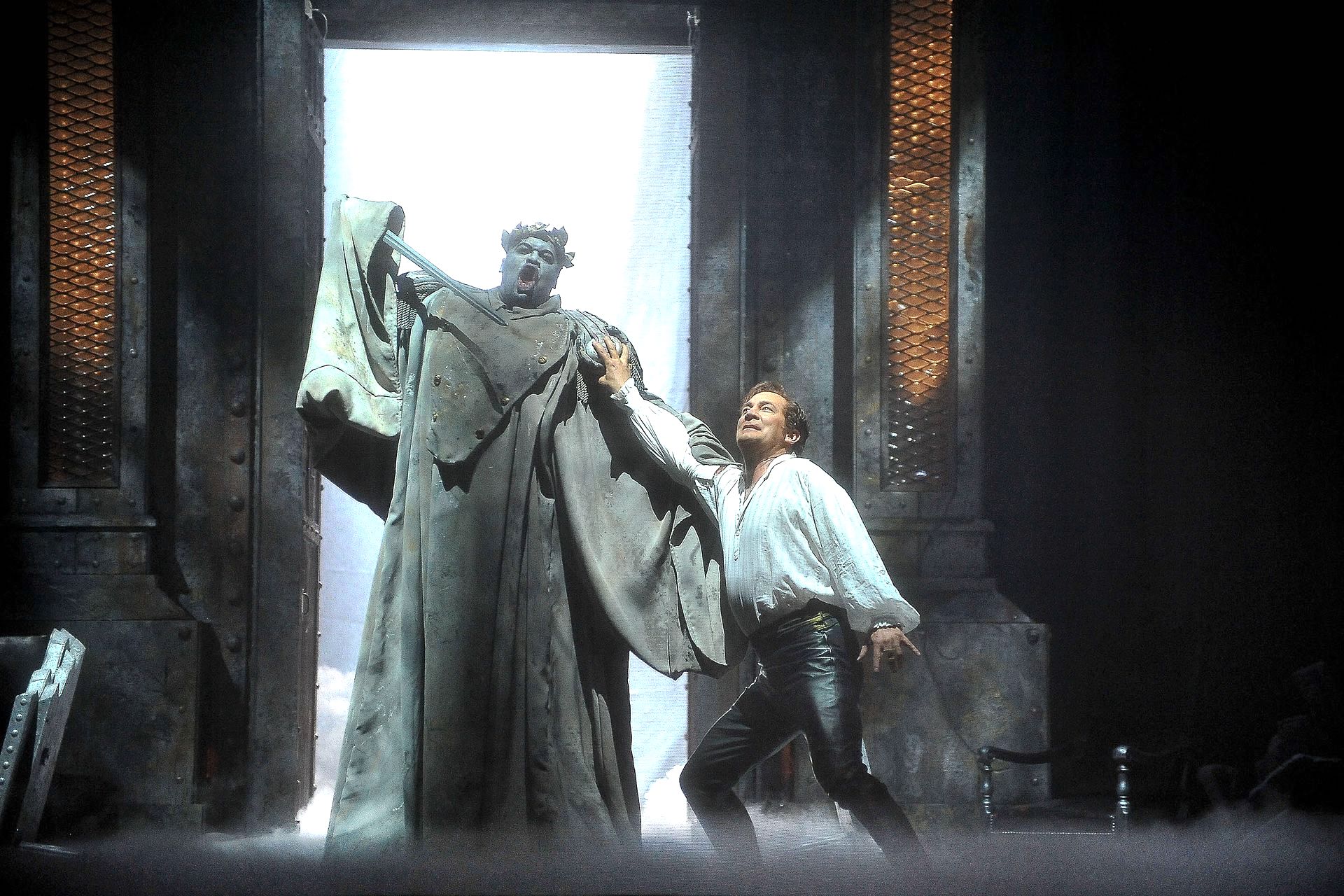
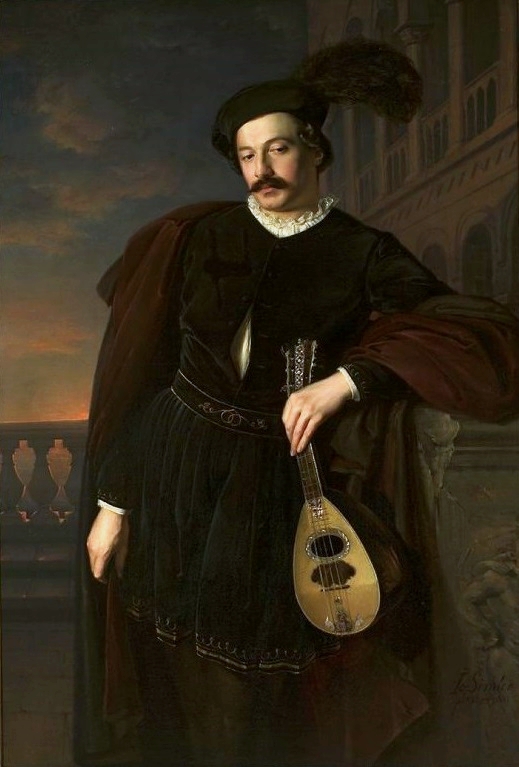
女たらしドン・ファンは罰せられるべきか?
Should the Lady killer Don Juan be
punished?


左:
モリス・ロビンソンとデヴィッド・ピットシンガー(2011年)/ Portrait of Wilhelm Troszel as Don
Juan, by Józef Simmler, 1846
★ドン・ファン(Don Juan)は、17世紀スペインのフィクションあるいは説教物語における架空の人物像である。ティルソ・デ・モリーナによる戯曲「セビリアの色事師 (El burlador de Sevilla y convidado de piedra)」が原型。好色放蕩な美男として多くの文学作品に描写されている。プレイボーイ、女たらしの代名詞としても使われている。
★ティルソ・デ・モリーナによる戯曲やモリエールの戯曲「ドン・ジュアン、またの名を石像の宴」、あるいは作曲家モーツアルトと台本作家ダ・ポンテによる「ドン・ジョバンニ」によると、女たらし(プレイボーイ)の 主人公は下僕を連れて各地を遍歴し、女とみれば身分の上下や美醜とは無関係に女性を籠絡し、自分の手に入れば、捨ててしまい、また新たな女あさりに勤し む、ドン・ファン(ドン・ジュアン/ドン・ジョバンニ)は、あることを契機に人を殺めてしまう。そのことを改心せずに、ひきつづき女漁りを続けるうちに、 (殺された紳士の亡霊を象徴する)墓場の石像に出会い、晩餐を招待すると、次の機会に招待される。主人の身の安全を危惧する下僕の忠告をきかずに晩餐の招 待を受けて、主人公は、地獄に引きずられ、その生涯を終える、という物語展開を遂げる。
★ 主人公は墓場の石像と晩餐を共にしても恐る様子がなく、あるいは女漁りへの反省もないために、地獄に連れていかれて罰せられる、という勧善懲悪の物語展開 をとげる(→悪に関するショートレクチャー)勧善懲悪の技法は「詩的正義(Poetic justice)」と 呼ばれる。詩的正義は詩的皮肉とも呼ばれ、最終的に美徳が報われ、悪行が罰せられる文学的装置である。
★
審問(このページの末尾で再度掲示します):
(1)
「女たらしドン・ファンは、その悪業のゆえに罰せられるべきか?」
・
全面的イエス:どうしてか、その理由
・
部分的イエス/部分的ノー:どうしてか、その理由
・
全面的ノー:どうしてか、その理由
(2) 女たらしドン・ファンの歴史は、もはや過去のものか?
・イエス:だったら、現在の男女のセクシュアリティと「騙しや籠絡」とはどのようなものか?
・
ノー:だったら、現在の男女のセクシュアリティと「騙しや籠絡」は変わっていないことに同意するか?
(3)
ドン・ファン的気分にある男性を、逆にカモにする美人局(つつもたせ)を知っているか?
・
イエス:つつもたせとはなにか?
・
ノー:美人局の英語は、Beauty Bureauや Badger gameといいます。
| 「悪ないしは邪悪に関するポータルサイト」より まとめ 1. 悪とは、道徳的に正しくないこと、不必要な心身の痛みや苦しみを引き起こすこと、と定義できる。 2. 善よりも悪のほうが我々の生活のなかで衝撃的である。悪の存在は、我々の倫理的生活を(反面教師の形で)形づくることに形成している。 3. 悪への考察を通して、人類は悪の本質を解明しようと努力してきており、この探求は今後も続くだろう。 4. 悪は無くならないという古来から続く悲観的な見解と、悪は厄介ではあるが、反省と分析を通して、以前よりも軽減するための努力は必要であり、実際にそうな りつつあるという現代的な楽観的な見解の2つがある。 |
|
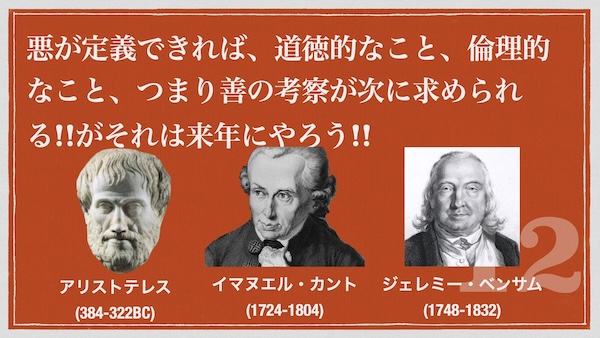 |
12 悪が定義できれば、道徳的なこと、倫理的なこと、つまり善の考察が次に求められる!!がそれは来年にやろう!! |
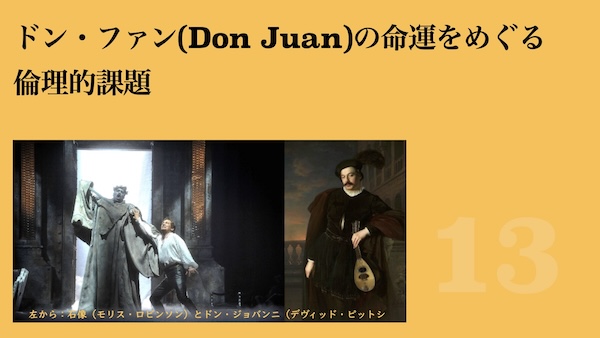 |
13 ドン・ファン(Don Juan)の命運をめぐる 倫理的課題 |
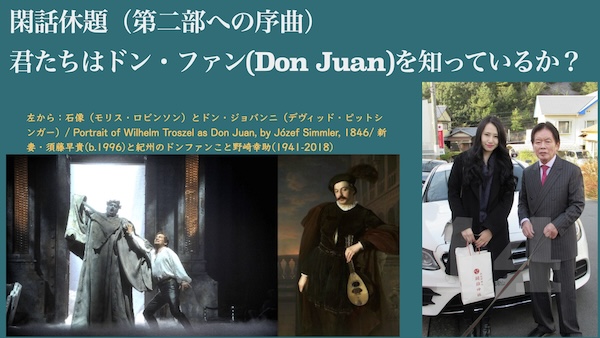 |
14 閑話休題(第二部への序曲) 君たちはドン・ファン(Don Juan)を知っているか? 左から:石像(モリス・ロビンソン)とドン・ジョバンニ(デヴィッド・ピットシンガー)/ Portrait of Wilhelm Troszel as Don Juan, by Józef Simmler, 1846/ 新妻・須藤早貴(b.1996)と紀州のドンファンこと野崎幸助(1941-2018) |
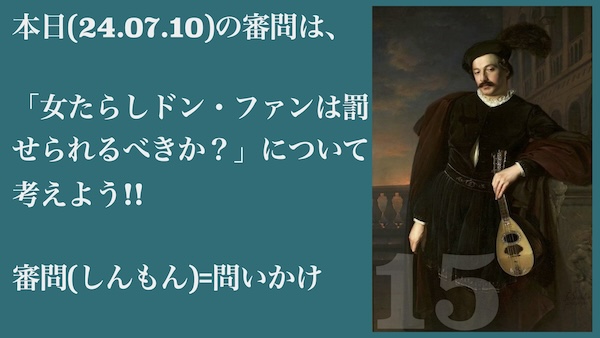 |
15 本日(24.07.10)の審問は、 「女たらしドン・ファンは罰せられるべきか?」について考えよう!! 審問(しんもん)=問いかけ |
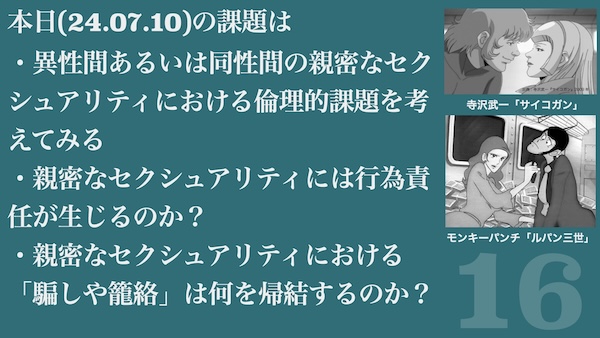 |
16 本日(24.07.10)の課題は ・異性間あるいは同性間の親密なセクシュアリティにおける倫理的課題を考えてみる ・親密なセクシュアリティには行為責任が生じるのか? ・親密なセクシュアリティにおける「騙しや籠絡」は何を帰結するのか? |
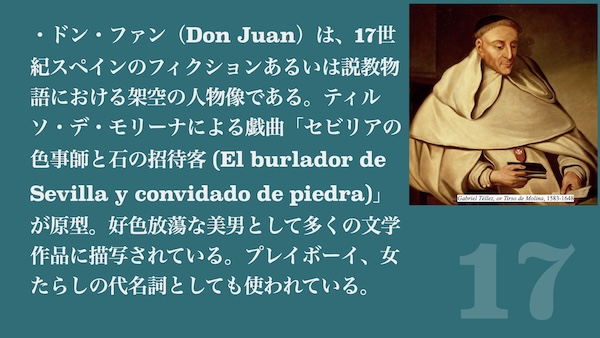 |
17 ・ドン・ファン(Don Juan)は、17世紀スペインのフィクションあるいは説教物語における架空の人物像である。ティルソ・デ・モリーナによる戯曲「セビリアの色事師と石の 招待客 (El burlador de Sevilla y convidado de piedra)」が原型。好色放蕩な美男として多くの文学作品に描写されている。プレイボーイ、女たらしの代名詞としても使われている。 |
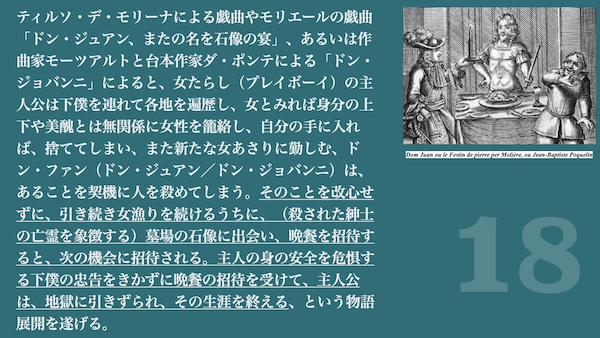 |
18 ティルソ・デ・モリーナによる戯曲やモリエールの戯曲「ドン・ジュアン、またの名を石像の宴」、あるいは作曲家モーツアルトと台本作家ダ・ポンテによる 「ドン・ジョバンニ」によると、女たらし(プレイボーイ)の主人公は下僕を連れて各地を遍歴し、女とみれば身分の上下や美醜とは無関係に女性を籠絡し、自 分の手に入れば、捨ててしまい、また新たな女あさりに勤しむ、ドン・ファン(ドン・ジュアン/ドン・ジョバンニ)は、あることを契機に人を殺めてしまう。 そのことを改心せずに、引き続き女漁りを続けるうちに、(殺された紳士の亡霊を象徴する)墓場の石像に出会い、晩餐を招待すると、次の機会に招待される。 主人の身の安全を危惧する下僕の忠告をきかずに晩餐の招待を受けて、主人公は、地獄に引きずられ、その生涯を終える、という物語展開を遂げる。 |
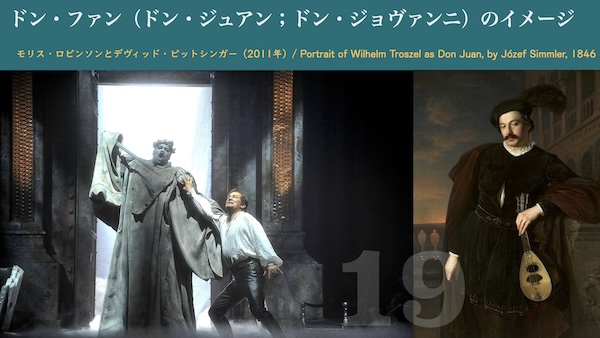 |
19 ドン・ファン(ドン・ジュアン;ドン・ジョヴァンニ)のイメージ モリス・ロビンソンとデヴィッド・ピットシンガー(2011年)/ Portrait of Wilhelm Troszel as Don Juan, by Józef Simmler, 1846 |
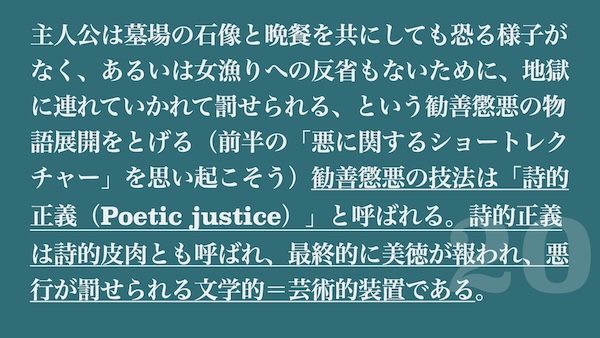 |
20 主人公は墓場の石像と晩餐を共にしても恐る様子がなく、あるいは女漁りへの反省もないために、地獄に連れていかれて罰せられる、という勧善懲悪の物語展開 をとげる(前半の「悪に関するショートレクチャー」を思い起こそう)勧善懲悪の技法は「詩的正義(Poetic justice)」と呼ばれる。詩的正義は詩的皮肉とも呼ばれ、最終的に美徳が報われ、悪行が罰せられる文学的=芸術的装置である。 |
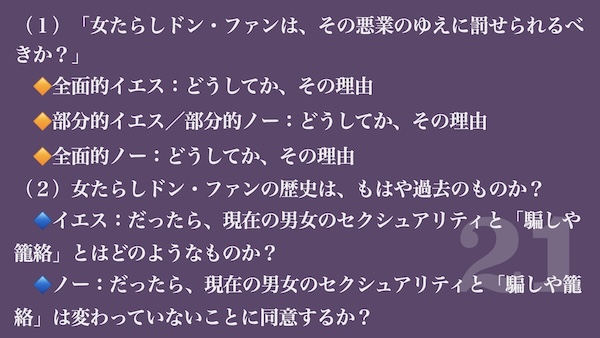 |
21 (1)「女たらしドン・ファンは、その悪業のゆえに罰せられるべきか?」 🔶全面的イエス:どうしてか、その理由 🔶部分的イエス/部分的ノー:どうしてか、その理由 🔶全面的ノー:どうしてか、その理由 (2)女たらしドン・ファンの歴史は、もはや過去のものか? 🔷イエス:だったら、現在の男女のセクシュアリティと「騙しや籠絡」とはどのようなものか? 🔷ノー:だったら、現在の男女のセクシュアリティと「騙しや籠絡」は変わっていないことに同意するか? |
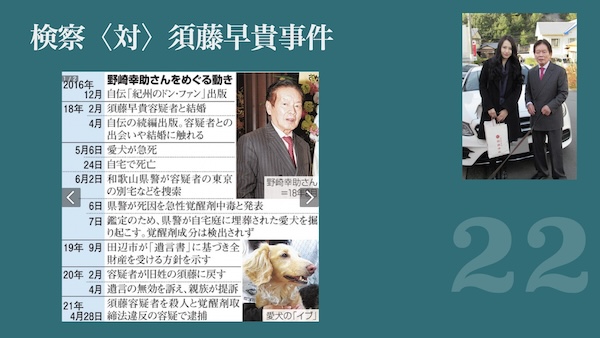 |
22 検察〈対〉須藤早貴事件 |
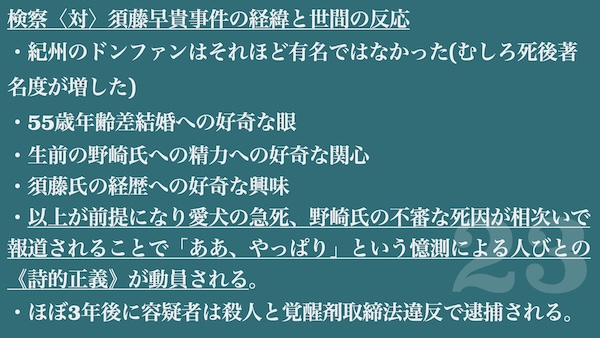 |
23 検察〈対〉須藤早貴事件の経緯と世間の反応 ・紀州のドンファンはそれほど有名ではなかった(むしろ死後著名度が増した) ・55歳年齢差結婚への好奇な眼 ・生前の野崎氏への精力への好奇な関心 ・須藤氏の経歴への好奇な興味 ・以上が前提になり愛犬の急死、野崎氏の不審な死因が相次いで報道されることで「ああ、やっぱり」という憶測による人びとの《詩的正義》が動員される。 ・ほぼ3年後に容疑者は殺人と覚醒剤取締法違反で逮捕される。 |
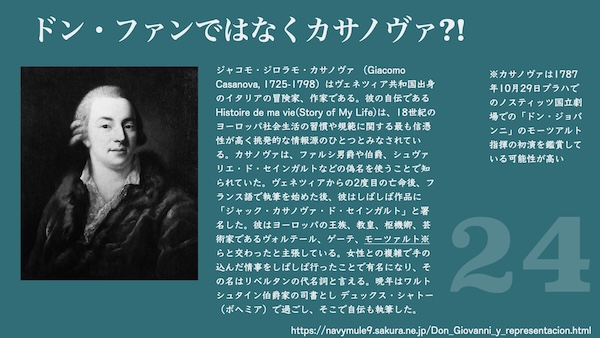 |
24 ドン・ファンではなくカサノヴァ?! ジャコモ・ジロラモ・カサノヴァ (Giacomo Casanova, 1725-1798)はヴェネツィア共和国出身のイタリアの冒険家、作家である。彼の自伝であるHistoire de ma vie(Story of My Life)は、18世紀のヨーロッパ社会生活の習慣や規範に関する最も信憑性が高く挑発的な情報源のひとつとみなされている。カサノヴァは、ファルシ男爵 や伯爵、シュヴァリエ・ド・セインガルトなどの偽名を使うことで知られていた。ヴェネツィアからの2度目の亡命後、フランス語で執筆を始めた後、彼はしば しば作品に「ジャック・カサノヴァ・ド・セインガルト」と署名した。彼はヨーロッパの王族、教皇、枢機卿、芸術家であるヴォルテール、ゲーテ、モーツァル ト※らと交わったと主張している。女性との複雑で手の込んだ情事をしばしば行ったことで有名になり、その名はリベルタンの代名詞と言える。晩年はワルト シュタイン伯爵家の司書とし デュックス・シャトー(ボヘミア)で過ごし、そこで自伝も執筆した。 ※カサノヴァは1787年10月29日プラハでのノスティッツ国立劇場での「ドン・ジョバンニ」のモーツアルト指揮の初演を鑑賞している可能性が高い |
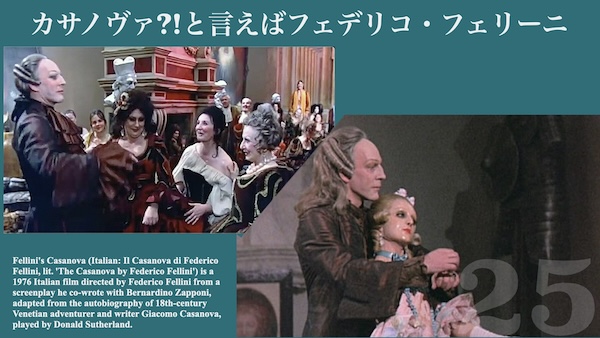 |
25 カサノヴァ?!と言えばフェデリコ・フェリーニ Fellini's Casanova (Italian: Il Casanova di Federico Fellini, lit. 'The Casanova by Federico Fellini') is a 1976 Italian film directed by Federico Fellini from a screenplay he co-wrote with Bernardino Zapponi, adapted from the autobiography of 18th-century Venetian adventurer and writer Giacomo Casanova, played by Donald Sutherland. |
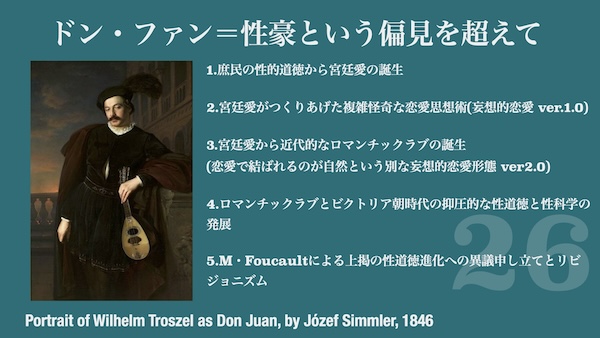 |
26 ドン・ファン=性豪という偏見を超えて 1.庶民の性的道徳から宮廷愛の誕生 2.宮廷愛がつくりあげた複雑怪奇な恋愛思想術(妄想的恋愛 ver.1.0) 3.宮廷愛から近代的なロマンチックラブの誕生 (恋愛で結ばれるのが自然という別な妄想的恋愛形態 ver2.0) 4.ロマンチックラブとビクトリア朝時代の抑圧的な性道徳と性科学の発展 5.M・Foucaultによる上掲の性道徳進化への異議申し立てとリビジョニズム |
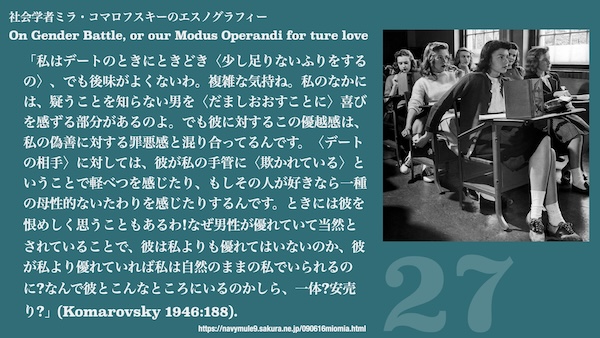 |
27 社会学者ミラ・コマロフスキーのエスノグラフィー On Gender Battle, or our Modus Operandi for ture love 「私はデートのときにときどき〈少し足りないふりをするの〉、でも後味がよくないわ。複雑な気持ね。私のなかには、疑うことを知らない男を〈だましおおす ことに〉喜びを感ずる部分があるのよ。でも彼に対するこの優越感は、私の偽善に対する罪悪感と混り合ってるんです。〈デートの相手〉に対しては、彼が私の 手管に〈欺かれている〉ということで軽べつを感じたり、もしその人が好きなら一種の母性的ないたわりを感じたりするんです。ときには彼を恨めしく思うこと もあるわ!なぜ男性が優れていて当然とされていることで、彼は私よりも優れてはいないのか、彼が私より優れていれば私は自然のままの私でいられるのに?な んで彼とこんなところにいるのかしら、一体?安売り?」(Komarovsky 1946:188). |
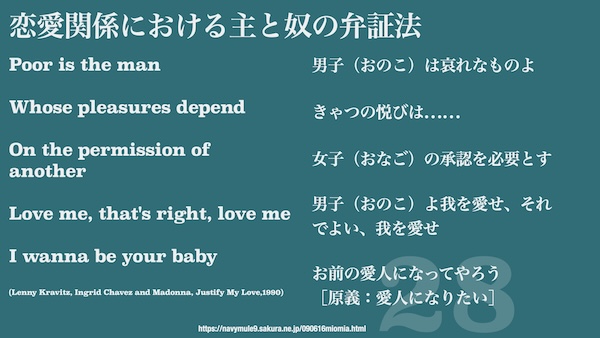 |
28 恋愛関係における主と奴の弁証法 Poor is the man Whose pleasures depend On the permission of another Love me, that's right, love me I wanna be your baby (Lenny Kravitz, Ingrid Chavez and Madonna, Justify My Love,1990) 男子(おのこ)は哀れなものよ きゃつの悦びは…… 女子(おなご)の承認を必要とす 男子(おのこ)よ我を愛せ、それでよい、我を愛せ お前の愛人になってやろう [原義:愛人になりたい] |
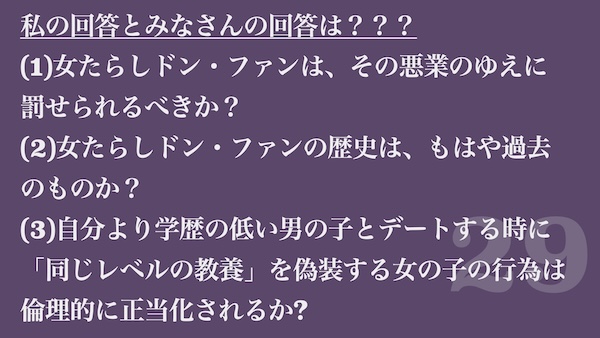 |
29 私の回答とみなさんの回答は??? (1)女たらしドン・ファンは、その悪業のゆえに罰せられるべきか? (2)女たらしドン・ファンの歴史は、もはや過去のものか? (3)自分より学歴の低い男の子とデートする時に「同じレベルの教養」を偽装する女の子の行為は倫理的に正当化されるか? |
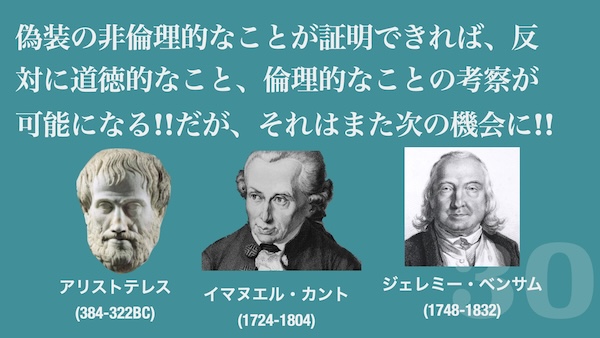 |
30 偽装の非倫理的なことが証明できれば、反対に道徳的なこと、倫理的なことの考察が可能になる!!だが、それはまた次の機会に!! |
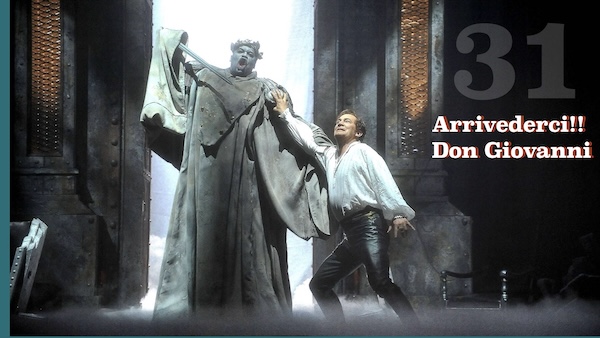 |
Arrivederci!! Don Giovanni |
☆ 「セ ビリアの色事師 (El burlador de Sevilla y convidado de piedra)」と詩的正義とコントラバッソについて
| El burlador de
Sevilla y convidado de piedra es una obra de teatro que recoge el mito
de don Juan, sin duda el personaje más universal del teatro español. De
autoría discutida, se atribuye tradicionalmente a Tirso de Molina y se
conserva en una publicación de 1630, aunque tiene como precedente la
versión conocida como Tan largo me lo fiais representada en Córdoba en
1617 por la compañía de Jerónimo Sánchez.2 Alfredo Rodríguez
López-Vázquez señala al dramaturgo Andrés de Claramonte como autor de
la obra en función de pruebas de carácter métrico, estilístico e
histórico.34 Sin embargo, tanto Luis Vázquez como José María Ruano de
la Haza la dan sin dudar como obra de Tirso y otros críticos concluyen
que tanto El burlador como el Tan largo me lo fiais descienden de un
arquetipo común del Burlador de Sevilla escrito por Tirso entre 1612 y
1625.5 |
El burlador de Sevilla y
convidado de
piedra』は、スペイン演劇界で最も普遍的なキャラクターであるドン・ファンの神話を取り上げた戯曲である。作者については議論があり、伝統的には
ティルソ・デ・モリーナの作とされ、1630年の出版物に残されているが、その前例は、1617年にコルドバで上演されたジェロニモ・サンチェスの劇団に
よる「Tan largo me lo fiais」として知られるバージョンである2。
4しかし、ルイス・バスケスもホセ・マリア・ルアノ・デ・ラ・ハサも、迷うことなくティルソの作品とし、他の批評家も、『エル・ブルラドール』と『タン・
ラルゴ・メ・ロ・フィアイス』の両方が、1612年から1625年の間にティルソによって書かれた『セビリアのブルラドール』という共通の原型に由来する
と結論付けている5。 |
| Contexto Don Juan personifica una leyenda sevillana que inspiró a Molière, Antonio de Zamora, Carlo Goldoni, Lorenzo da Ponte (autor del libreto de Don Giovanni de Mozart), lord Byron, Espronceda, Pushkin, Zorrilla, Azorín, Marañón y a muchos otros autores. Es un libertino que cree en la justicia divina («no hay plazo que no se cumpla ni deuda que no se pague») pero que confía en que podrá arrepentirse y ser perdonado antes de comparecer ante Dios («¡Cuán largo me lo fiais!»). Si además recordamos que El burlador de Sevilla se publicó en 1630, podemos concluir que se trata de una obra cuya vocación es moralizante, y que podría haber sido concebida como respuesta a la teoría de la predestinación de Don Juan, según la cual la salvación y la entrada en el reino de los cielos ya ha sido determinada por Dios desde el nacimiento de uno, dado por gracia a través de Cristo y recibido solamente por fe, por lo que los actos no son determinantes para la salvación de las almas. Se ha especulado mucho sobre la posible inspiración en un personaje real, y se ha señalado a Miguel Mañara como principal candidato. Sin embargo, si aceptamos la opinión mayoritaria respecto a la autoría y la fecha, no podrá considerarse el personaje de don Juan inspirado en la vida de Mañara, ya que este nació en 1627 y la obra se editó solo tres años después. Más aún, una versión precedente del Burlador, el Cuán largo me lo fiais, con el mismo argumento, podría datar de 1617. 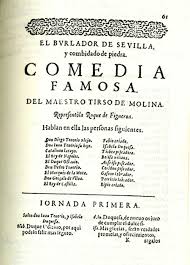 |
文脈[編集] ドン・ファンは、モリエール、アントニオ・デ・ザモラ、カルロ・ゴルドーニ、ロレンツォ・ダ・ポンテ(モーツァルトの『ドン・ジョヴァンニ』のリブレット の作者)、バイロン卿、エスプロンセダ、プーシキン、ゾリージャ、アゾリン、マラニョン、その他多くの作家に影響を与えたセビリアの伝説を擬人化したもの である。彼は、神の正義を信じ(「守られない期限はなく、払われない負債もない」)、神の前に現れる前に悔い改めて赦されることを信じる自由人である (「いつまで私を信じてくれるの!」)。この作品は、救いと天の御国への参入は、生まれたときから神によってすでに決定されており、キリストによる恵みに よって与えられ、信仰のみによって受け取られる。 実在の人物からインスピレーションを受けた可能性について多くの憶測が飛び交い、ミゲル・マニャラがその有力候補に挙げられている。しかし、作者や年代に 関する多数説を受け入れるなら、ドン・ファンのキャラクターはマニャラの生涯から着想を得たとは考えられない。彼は1627年に生まれ、この作品が出版さ れたのはそのわずか3年後だからだ。さらに、同じ筋書きの『ブルラドール』の初期版『Cuán largo me lo fiais』は、1617年の作品かもしれない。  |
| Argumento Un joven noble español llamado don Juan, el gran seductor y libertino, seduce en Nápoles a la duquesa Isabela haciéndose pasar por su prometido, el duque Octavio, lo que ella descubre al querer alumbrarlo con el farol. Tras esto, en la huida mientras gritaba fue de pato va a parar a la habitación del rey, quien encarga a la guardia y a don Pedro Tenorio (pariente del protagonista y embajador de España) que atrape al hombre que ha deshonrado a la joven. Al entrar don Pedro en la habitación y descubrir que el burlador es su sobrino, decide escucharlo y ayudarle a escapar, para alegar más tarde que no pudo alcanzarlo debido a su agilidad al saltar desde la habitación a los jardines. Tras esto, don Juan viaja a España y naufraga en la costa de Tarragona; Catalinón (su criado) consigue llevarlo hasta la orilla, donde los aguarda la pescadora Tisbea, que ha oído su grito de socorro. Tisbea manda a Catalinón a buscar a los pescadores a un lugar no muy lejano y en el tiempo que están ellos solos don Juan la seduce y esa misma noche la goza en su cabaña, de la que más tarde huirá con las dos yeguas que Tisbea había criado. Cuando don Juan y Catalinón regresan a Sevilla, el escándalo de Nápoles llega a oídos del rey Alfonso XI, quien busca solucionarlo comprometiéndolo con Isabela (el padre de don Juan trabaja para el rey). Mientras, don Juan se encuentra con su conocido, el marqués de la Mota, el cual le habla sobre su amada, doña Ana de Ulloa, tras hablar de burlas, “ranas” y mujeres en todos los aspectos; y como el marqués de la Mota dice de Ana que es la más bella sevillana llegada desde Lisboa, don Juan tiene la imperiosa necesidad de gozarla y, afortunadamente para él, recibe la carta destinada al Marqués, al que luego informará de la cita pero con un retraso de una hora para así él gozar a Ana. Por la noticia de la carta de Ana de Ulloa, Mota le ofrece una burla a don Juan, para lo cual este ha de llevar la capa del marqués, que se la presta sin saber que la burla no iba a ser la estipulada, sino la deshonra de Ana al estilo de la de Isabela. Don Juan consigue engañar a la dama, pero es descubierto por el padre de esta, don Gonzalo de Ulloa, con quien se enfrenta en un combate en el que don Gonzalo muere. Entonces don Juan huye en dirección a Dos Hermanas. Mientras se encuentra lejos de Sevilla, lleva a cabo otra burla, interponiéndose en el matrimonio de dos plebeyos, Arminta y Batricio, a los que engaña hábilmente: en la noche de bodas, don Juan llega a parecer interesado en un casamiento con Arminta, Batricio le cree y se deja llevar por el engaño. Arminta una vez en el cuarto, don Juan se presenta con ella, y la seduce diciéndole sobre su amor y prometido matrimonio con ella misma, para poder gozarla. Don Juan vuelve a Sevilla, donde se topa con la tumba de don Gonzalo y se burla del difunto, invitándolo a cenar. Sin embargo, la estatua de este llega a la cita (el convidado de piedra) cuando realmente nadie esperaba que un muerto fuera a hacer cosa semejante. Luego, el mismo don Gonzalo convida a don Juan y a su lacayo Catalinón a cenar a su capilla, y don Juan acepta la invitación acudiendo al día siguiente. Allí, la estatua de don Gonzalo de Ulloa se venga arrastrándolo a los infiernos sin darle tiempo para el perdón de los pecados de su «Tan largo me lo fiais», famosa frase del Burlador que significa que la muerte y el castigo de Dios están muy lejanos y que por el momento no le preocupa la salvación de su alma. Tras esto se recupera la honra de todas aquellas mujeres que habían sido deshonradas, y puesto que no hay causa de deshonra, todas ellas pueden casarse con sus pretendientes. El mito de don Juan Artículo principal: Don Juan Protagonista de la obra, El burlador de Sevilla, y personaje en torno al cual gira la obra entera, que durante toda la obra se dedica a burlar a todas aquellas damas que encuentra en estado de gracia para así él poseerlas, haciendo uso de trucos, engaños y burlas y deshonrando de esta forma a la mujer y perdiendo el honor del hombre con el que ella realmente deseaba gozar. Orígenes Los orígenes de don Juan son difíciles de determinar. Según Youssef Saad, el don Juan de España es una figura auténticamente española, pero tiene muchas semejanzas con una figura árabe, Imru al-Qays, quien vivió en Arabia durante el quinto siglo: como don Juan, era un burlador y un seductor famoso de mujeres; como el don Juan de Zorrilla, fue rechazado por su padre por sus burlas y también desafió abiertamente a la ira divina. Según Víctor Said Armesto, las raíces literarias de don Juan se pueden encontrar en los romances gallegos y leoneses medievales. Su precursor típicamente llevaba el nombre de “Don Galán” y este hombre también trata de engañar y seducir a las mujeres, pero tiene una actitud más piadosa hacia Dios. Evolución Tras esta acuñación del personaje de don Juan Tenorio, El Burlador de Sevilla como llega él a llamarse, se dan varias reinterpretaciones del mito, como el Don Juan de Molière, cuyo Don Juan no solo roza los límites de la más cínica arrogancia, sino que también nos muestra un personaje con un gran escepticismo religioso, lo que es una gran distinción con el del dramaturgo español. A la mentalidad del siglo xviii corresponden tres obras sobre don Juan: la española de Antonio de Zamora, No hay plazo que no se cumpla, la italo-austriaca, Don Giovanni con libreto de Lorenzo da Ponte y música de Mozart y la italiana de Carlo Goldoni, titulada Don Juan o el castigo del libertino. En el romanticismo se dio un nuevo rumbo al mito; unas veces se une al tipo primitivo y otras a la expresión de la vivencia personal de creadores cuya vida tuvo que ver con la del seductor. Como el Don Juan de Byron, y el protagonista de El estudiante de Salamanca, de Espronceda. Y en relación con los primitivos están la versión de Zorrilla, Don Juan Tenorio, y las francesas de Merimée y Alejandro Dumas. Aunque el don Juan romántico pierde con respecto al primitivo ya que a veces llega a mostrarse como un simple juguete del destino y hasta se enamora sinceramente, dejando de ser el mito eterno del cínico seductor que fácilmente olvidaba para volver a seducir. |
プロット[編集]。 スペイン貴族のドン・ファンという青年が、ナポリのイサベラ公爵夫人の婚約者オクタビオ公爵になりすまし、ナポリのイサベラ公爵夫人を誘惑する。その後、 "フエ・デ・パト "と叫びながら逃走した彼は国王の部屋に辿り着き、国王は衛兵とドン・ペドロ・テノリオ(主人公の親戚でスペイン大使)に若い女性の名誉を傷つけた男を捕 まえるよう指示する。部屋に入ったドン・ペドロは、あざ笑う男が自分の甥であることを知ると、彼の話を聞くことにして逃走を助けるが、後に、部屋から庭園 に飛び移る彼の機敏さのために捕まえることができなかったと主張する。 この後、ドン・ファンはスペインに渡り、タラゴナの海岸で難破する。カタリノン(彼の召使い)は何とか彼を岸に上げることに成功し、助けを求める彼の叫び を聞いた漁師のティスベアが二人を待っていた。ティスベアはカタリノンに漁師を探しに行かせ、二人きりになったその夜、ドン・ファンはカタリノンを誘惑 し、自分の小屋で彼女を楽しませる。 ドン・ファンとカタリノンがセビーリャに戻ると、ナポリのスキャンダルがアルフォンソ11世の耳に入り、アルフォンソ11世はドン・ファンとイサベラ(ド ン・ファンの父は王に仕えている)を婚約させることで解決しようとする。一方、ドン・ファンは知り合いのラ・モタ侯爵に会い、嘲笑、「蛙」、女性のあらゆ る面について話した後、彼の最愛の女性ドニャ・アナ・デ・ウジョアについて話す。ラ・モタ侯爵が、アナはリスボンから来たセビリアの女性の中で最も美しい と言うので、ドン・ファンは彼女を楽しませなければならないという衝動に駆られ、幸運にも侯爵宛ての手紙を受け取る。アナ・デ・ウジョアの手紙を聞いたモ タは、ドン・ファンに嘲笑を申し入れる。そのために侯爵の外套を持ってこなければならなかったが、侯爵は、嘲笑が定められたものではなく、イサベラ風にア ナの名誉を傷つけるものだと知らずに貸してくれた。 ドン・フアンは、何とか女性を欺くことに成功するが、彼女の父、ドン・ゴンサロ・デ・ウジョアに見つかってしまい、ドン・ゴンサロと一騎打ちとなり、ド ン・ゴンサロは死んでしまう。その後、ドン・フアンはドス・エルマナス方面へ逃げる。 セビーリャから遠く離れている間に、彼はもう一つの策略を実行する。二人の平民、アルミンタとバトリシオの結婚を邪魔し、巧みに騙すのだ。結婚初夜、ド ン・ファンはアルミンタとの結婚に興味があるように見せかけ、バトリシオは彼を信じ、騙される。アルミンタが部屋に入ると、ドン・ファンは彼女に自己紹介 し、彼女を楽しませるために、自分への愛と結婚の約束を告げて誘惑する。 セビーリャに戻ったドン・ファンは、偶然ドン・ゴンザロの墓を見つけ、故人をあざ笑って夕食に誘う。しかし、誰も死人がそんなことをするとは思っていな かったのに、故人の像が待ち合わせの場所(石の客)にやってくる。その後、ドン・ゴンサロ自身がドン・フアンとその下僕カタリノンを礼拝堂での食事に招待 し、ドン・フアンはその招待を受け、翌日出席する。そこで、ドン・ゴンサロ・デ・ウジョア像は、彼の罪を許す暇も与えず、彼を地獄に引きずり込んで復讐を 果たす。"Tan largo me lo fiais "とは、死と神の罰は遥か彼方にあり、当分の間は魂の救済には関心がないことを意味するブルラドールの有名な言葉である。 この後、不名誉な扱いを受けていた女性たちの名誉は回復し、不名誉な扱いを受ける理由がなくなったため、彼女たちは皆求婚者と結婚できるようになる。 ドン・ファン神話[編集] 主な記事:ドン・ファン 戯曲の主人公で、劇全体がこの人物を中心に展開される。劇中では、優美な状態にある女性たちをすべてあざ笑い、自分がその女性を所有できるようにすること に専心し、策略、欺瞞、嘲笑を駆使し、その結果、女性の名誉を傷つけ、女性が本当に楽しみたいと願った男性の名誉を失う。 起源[編集] ドン・ファンの起源を特定するのは難しい。ユセフ・サードによれば、スペインのドン・ファンは正真正銘のスペイン人だが、5世紀にアラビアに住んでいたイ ムル・アル・カイーズというアラブの人物と多くの類似点があるという。ドン・ファンのように、彼はあざ笑う男であり、有名な女性の誘惑者であった。ビクト ル・シド・アルメストによれば、ドン・ファンの文学的ルーツは中世ガリシアとレオンのロマンスにあるという。彼の前身は一般的に「ドン・ガラン」という名 前で、この男もまた女性を欺き誘惑しようとするが、神に対してはより敬虔な態度をとる。 進化[編集] ドン・フアン・テノリオ、エル・ブルラドール・デ・セビージャと呼ばれるようになったこの人物の造語の後、モリエールの『ドン・フアン』のように、この神 話を再解釈したものがいくつかある。 アントニオ・デ・サモーラのスペイン語劇『No hay plazo que no se cumpla』、ロレンツォ・ダ・ポンテの台本とモーツァルトの音楽によるイタリア・オーストリアの『ドン・ジョヴァンニ』、カルロ・ゴルドーニのイタリ ア語劇『ドン・ファン o el castigo del libertino』である。 ロマン主義では、神話は新たな方向性を与えられた。ある時は原始的なタイプに結びつき、またある時は、誘惑者の人生と関係していた創作者たちの個人的な経 験の表現に結びつく。バイロンの『ドン・ファン』やエスプロンセダの『サラマンカの学生』の主人公がそうである。また、原始人たちとの関係では、ゾリー リャ版『ドン・ファン・テノリオ』、メリメや アレクサンドル・デュマのフランス版などがある。ロマンチックなドン・ファンは原始的なドン・ファンには負けるが、彼は時に運命に翻弄され、心から恋に落 ちることもある。 |
| https://es.wikipedia.org/wiki/El_burlador_de_Sevilla_y_convidado_de_piedra |
|
| Poetic justice,
also called poetic irony, is a literary device with which ultimately
virtue is rewarded and misdeeds are punished. In modern literature,[1]
it is often accompanied by an ironic twist of fate related to the
character's own action, hence the name poetic irony.[2] |
詩的正義は
詩的皮肉とも呼ばれ、最終的に美徳が報われ、悪行が罰せられる文学的装置である。現代文学では[1]、登場人物自身の行動に関連した運命の皮肉な展開を伴
うことが多く、それゆえ詩的皮肉と呼ばれる[2]。 |
| Etymology English drama critic Thomas Rymer coined the phrase in The Tragedies of the Last Age Consider'd (1678) to describe how a work should inspire proper moral behaviour in its audience by illustrating the triumph of good over evil. The demand for poetic justice is consistent in Classical authorities and shows up in Horace, Plutarch, and Quintillian, so Rymer's phrasing is a reflection of a commonplace. Philip Sidney, in The Defence of Poesy (1595) argued that poetic justice was, in fact, the reason that fiction should be allowed in a civilized nation. |
語源[編集] イギリスの戯曲批評家トーマス・ライマーは、『The Tragedies of the Last Age Consider'd』(1678年)の中で、作品が悪に対する善の勝利を描くことによって、観客に適切な道徳的行動を促すべきことを説明するために、こ の言葉を作った。詩的正義の要求は古典的権威に一貫しており、ホレス、プルターク、キンティリアヌスにも見られるので、ライマーの言い回しはありふれたも のの反映である。フィリップ・シドニーは 『ポエジーの弁明』(1595年)の中で、詩的正義こそが、文明国家においてフィクションが許されるべき理由であると主張した。 |
| History Notably, poetic justice does not merely require that vice be punished and virtue rewarded, but also that logic triumph. If, for example, a character is dominated by greed for most of a romance or drama, they cannot become generous. The action of a play, poem, or fiction must obey the rules of logic as well as morality. During the late 17th century, critics pursuing a neo-classical standard criticized William Shakespeare in favor of Ben Jonson precisely on the grounds that Shakespeare's characters change during the course of the play.[3] When Restoration comedy, in particular, flouted poetic justice by rewarding libertines and punishing dull-witted moralists, there was a backlash in favor of drama, in particular, of more strict moral correspondence. |
歴史[編集] 特筆すべきは、詩的正義は単に悪を罰し、徳に報いることを要求するだけでなく、論理が勝利することも要求するということだ。例えば、ロマンスやドラマの大 半で登場人物が欲に支配されている場合、彼らは寛大になることはできない。戯曲、詩、小説の行動は、道徳だけでなく論理のルールにも従わなければならな い。17世紀後半、新古典主義の基準を追求する批評家たちは、ウィリアム・シェイクスピアを批判し、ベン・ジョンソンを支持したが、それはまさに、シェイ クスピアの登場人物が戯曲の途中で変化するという理由によるものであった[3]。特に王政復古期の喜劇が、詩的正義に背き、自由主義者に報酬を与え、頭の 鈍い道徳主義者を罰するものであったため、戯曲、特により厳格な道徳的対応を支持する反発が起こった。 |
| Contrapasso Karma Unintended consequences Irony |
コントラパッソ カルマ 意図しない結果 皮肉 |
| https://en.wikipedia.org/wiki/Poetic_justice |
|
| In Dante's Inferno, contrapasso
(or, in modern Italian,[1] contrappasso, from Latin contra and patior,
meaning "suffer the opposite") is the punishment of souls "by a process
either resembling or contrasting with the sin itself."[2] A similar
process occurs in the Purgatorio.[2] One of the examples of contrapasso occurs in the fourth Bolgia of the eighth circle of Hell, where the sorcerers, astrologers, and false prophets have their heads turned back on their bodies such that it is "necessary to walk backward because they could not see ahead of them."[3] This alludes to the consequences of predicting the future by evil means and displays the twisted nature of magic in general.[4] This example of contrapasso "functions not merely as a form of divine revenge, but rather as the fulfillment of a destiny freely chosen by each soul during his or her life."[5] The word contrapasso can be found in Inferno, in which the decapitated Bertran de Born declares: Così s'osserva in me lo Contrapasso (XXVIII.142),[6] which was translated by Longfellow as "thus is observed in me the counterpoise",[7] and by Singleton as "thus is the retribution observed in me."[8] Dante believes that De Born is in the ninth Bolgia of schismatics for causing Henry the Young King's rebellion against his father, Henry II of England.[9] De Born is decapitated as a contrapasso for his supposed act of political decapitation in undermining a rightful head of the state.[9] Dante inherited the idea of "contrapasso" from various theological and literary sources. These include Thomas Aquinas' Summa Theologica as well as medieval ‘visions’ such as Visio Pauli, Visio Alberici, and Visio Tnugdali.[1] 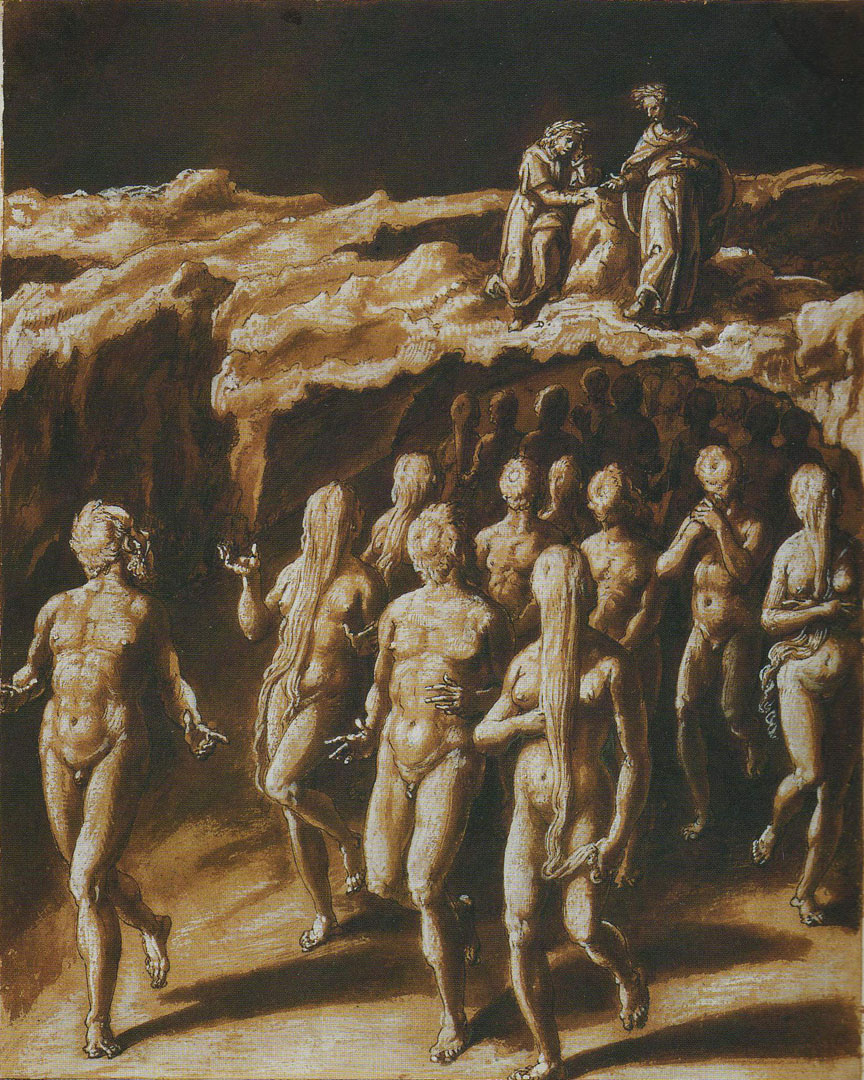 The Contrapasso of the sorcerers, astrologers, and false prophets, illustrated by Stradanus |
ダンテの『地獄篇』において、コントラパッソ(現代イタリア語では
[1] コントラッパッソ、ラテン語の contraと
patiorに由来し、「正反対の苦しみを受ける」を意味する)とは、「罪そのものに似ているか対照的な過程」[2]によって魂を罰することである。同様
の過程が『プルガトリオ』にもある[2]。 魔術師、占星術師、偽預言者たちは、「前が見えないので、後ろ向きに歩かなければならない」ように、頭を後ろに向けられる。 「このコントラパッソの例は、「単に神の復讐としてではなく、むしろ、それぞれの魂が生前に自由に選んだ運命の成就として機能している」[5]。 コントラパッソという言葉は、『インフェルノ』の中で、首を切られたベルトラン・ド・ボルンがこう宣言している: と宣言している(XXVIII.142)[6]。 ダンテは、デ・ボルンが幼王ヘンリーの父であるイングランド王ヘンリー2世に対する反乱を引き起こしたことで、分裂主義者の9番目のボルジアにいると考え ている[9]。デ・ボルンは、正当な国家元首を貶めるという政治的な断末魔の行為のために、コントラパッソとして断頭される[9]。 ダンテは様々な神学的・文学的資料から「コントラパッソ」の思想を受け継いだ。その中には、トマス・アクィナスの『スンマ・テオロジカ』や、『ヴィジオ・ パウリ』、『ヴィジオ・アルベリチ』、『ヴィジオ・トゥヌグダリ』といった中世の「ヴィジョン」が含まれる[1]。  魔術師、占星術師、偽預言者たちのコントラパッソ』(ストラダヌス画 |
| https://en.wikipedia.org/wiki/Contrapasso |
★ ドン・ファン伝説が受容される社会的条件
・ セクシュアリティの「欲望」を秘匿したり、節制したりすることがノーマルとみなされる、性道徳と性道徳秩序の存在
・ セックスや恋愛は、男性がイニシアチブをとるべきだという伝統。ドン・ファンはそれが「過剰」な状態にある
・ ドン・ファン的ふるまいを可能にする、経済的あるいは身分的特権階級であること
・ モーツアルト「ドン・ジョヴァンニ」のレポレッロの「カタログのアリア」のように、モノにした女性の数の地域や数を綿密に数え上げる、記録フェチあるいは 記号化される獲物の存在
・仮に不誠実でも魅力ある男性により籠絡されるという「女性の天性(Women's
nature)」の容認
☆ ドン・ファン伝説
| Don Juan (Spanish:
[doŋ ˈxwan]), also known as Don Giovanni (Italian), is a legendary,
fictional Spanish libertine who devotes his life to seducing women. The original version of the story of Don Juan appears in the 1630 play El burlador de Sevilla y convidado de piedra (The Trickster of Seville and the Stone Guest) by Tirso de Molina. The play includes most of the elements found and later adapted in subsequent works, including the setting (Seville), the characters (Don Juan, his servant, his love interest, and her father, whom he kills), moralistic themes (honor, violence and seduction, vice and retribution), and the dramatic ending in which Don Juan dines with and is then dragged down to hell by the stone statue of the father he had previously slain. Tirso de Molina's play was subsequently adapted into numerous plays and poems, of which the most famous include a 1665 play, Dom Juan, by Molière, a 1787 opera, Don Giovanni, with music by Mozart and a libretto by Lorenzo da Ponte largely adapting Tirso de Molina's play, a satirical and epic poem, Don Juan, by Lord Byron, and Don Juan Tenorio, a romantic play by José Zorrilla. By linguistic extension, from the name of the character, "Don Juan" has become a generic expression for a womanizer, and stemming from this, Don Juanism is a non-clinical psychiatric descriptor. |
ドン・ファン(スペイン語:[doŋ
ˈwan])は、ドン・ジョヴァンニ(イタリア語)としても知られる、伝説上の架空のスペインの 自由人で、女性を誘惑することに生涯を捧げる。 ドン・ファンの物語の原作は、ティルソ・デ・モリーナによる1630年の戯曲『セビリアのトリックスターと石の客』に登場する。この戯曲には、舞台設定 (セビリア)、登場人物(ドン・ファン、使用人、恋敵、彼が殺した彼女の父親)、道徳的テーマ(名誉、暴力と誘惑、悪徳と報復)、ドン・ファンが以前に殺 した父親の石像と一緒に食事をし、その後地獄に引きずり込まれるという劇的な結末など、その後の作品で発見され、脚色された要素のほとんどが含まれてい る。ティルソ・デ・モリーナの戯曲はその後、数多くの戯曲や詩に翻案されたが、最も有名なものには、モリエールによる1665年の戯曲『ドン・ジュア ン』、ティルソ・デ・モリーナの戯曲を大きく脚色したロレンツォ・ダ・ポンテの 台本と モーツァルトの音楽による1787年のオペラ『ドン・ジョヴァンニ』、バイロン卿による風刺的で叙事詩的な詩『ドン・ジュアン』、ホセ・ゾリーリャによる ロマンチックな戯曲『ドン・ジュアン・テノリオ』などがある。 ドン・ファン」は、その登場人物の名前から言語学的に拡張され、女たらしの総称となり、これに由来するドン・ジュアニズムは、非臨床的な精神医学的記述語 である。 |
| Pronunciation In Spanish, it is pronounced [doŋˈxwan]. The usual English pronunciation is /ˌdɒnˈwɑːn/, with two syllables and a silent "J", but today, as more English-speakers are becoming influenced by Spanish, the pronunciation /ˌdɒnˈhwɑːn/ is becoming more common. However, in Lord Byron's verse version the name rhymes with ruin and true one, and traditionally the name was pronounced with three syllables, possibly /ˌdɒnˈʒuːən/ or /ˌdɒnˈdʒuːən/, in England at the time and by later critics. This would have been characteristic of English literary precedent, where English pronunciations were often imposed on Spanish names, such as Don Quixote /ˌdɒnˈkwɪksət/. |
発音 スペイン語では[doŋˈxwan] と発音する。 しかし、バイロン卿の詩編では、この名前は破滅と 真の1つと韻を踏んでおり、伝統的にこの名前は3音節で発音されていた。これは、ドン・キホーテ /ˌdɪksət/のようなスペイン語の名前に英語の発音がしばしば押し付けられる、イギリス文学の先例の特徴であったろう。 |
| Synopsis There have been many versions of the Don Juan story, but the basic outline remains the same: Don Juan is a wealthy Andalusian libertine who devotes his life to seducing women. He takes great pride in his ability to seduce women of all ages and stations in life, and he often disguises himself and assumes other identities in order to seduce women. The aphorism that Don Juan lives by is: "Tan largo me lo fiáis" (translated as "What a long term you are giving me!"[1]). This is his way of indicating that he is young and that death is still distant—he thinks he has plenty of time to repent later for his sins.[2] His life is also punctuated with violence and gambling, and in most versions he kills a man: Don Gonzalo (the Commendatore), the father of Doña Ana, a girl he has seduced. This murder leads to the famous "last supper" scene, where Don Juan invites a statue of Don Gonzalo to dinner. There are different versions of the outcome: in some versions Don Juan dies, having been denied salvation by God; in other versions he willingly goes to Hell, having refused to repent; in some versions Don Juan asks for and receives a divine pardon. |
あらすじ[編集]。 ドン・ファンはアンダルシアの裕福な自由人で、女性を誘惑することに人生を捧げている。彼は、あらゆる年齢や身分の女性を誘惑する能力に誇りを持ってお り、女性を誘惑するためにしばしば変装したり、別の身分になりすましたりする。ドン・ファンの口癖はこうだ: "Tan largo me lo fiáis"(直訳すると、「なんて長い期間、私に尽くしてくれるんだ!」[1])である。これは彼がまだ若く、死はまだ遠いことを示すもので、自分の罪 を後で悔い改める時間は十分にあると考えている[2]。 また、彼の人生は暴力とギャンブルに彩られており、ほとんどの版で彼は人を殺している: ドン・ゴンサロ(コメンダトーレ)は、彼が誘惑した少女ドニャ・アナの父親である。この殺人は、ドン・ファンがドン・ゴンザロの像を夕食に招待する有名な 「最後の晩餐」のシーンにつながる。あるバージョンではドン・ファンは神に救いを拒否されて死ぬが、別のバージョンでは悔い改めることを拒否した彼は自ら 進んで地獄に落ちる。 |
| Earliest written version The first written version of the Don Juan story was a play, El burlador de Sevilla y convidado de piedra (The Trickster of Seville and the Stone Guest), published in Spain around 1630 by Tirso de Molina (pen name of Gabriel Téllez).[3] In Tirso de Molina's version Don Juan is portrayed as an evil man who seduces women thanks to his ability to manipulate language and disguise his appearance. This is a demonic attribute, since the devil is known for shape-shifting or taking other peoples' forms.[2] In fact Tirso's play has a clear moralizing intention. Tirso felt that young people were throwing their lives away, because they believed that as long as they made an Act of Contrition before they died, they would automatically receive God's forgiveness for all the wrongs they had done, and enter into heaven. Tirso's play argues in contrast that there is a penalty for sin, and there are even unforgivable sins. The devil himself, who is identified with Don Juan as a shape-shifter and a "man without a name", cannot escape eternal punishment for his unforgivable sins. As in a medieval Danse Macabre, death makes us all equal in that we all must face eternal judgment.[2] Tirso de Molina's theological perspective is quite apparent through the dreadful ending of his play.[2] Another aspect of Tirso's play is the cultural importance of honor in Spain of the golden age. This was particularly focused on women's sexual behavior, in that if a woman did not remain chaste until marriage, her whole family's honor would be devalued.[4][2] |
最古の文書版[編集] ドン・ファンの物語が最初に書かれたのは、ティルソ・デ・モリーナ(ガブリエル・テレスのペンネーム)によって1630年頃にスペインで出版された戯曲 『セビリアの詐欺師と石の客』(El burlador de Sevilla y convidado de piedra)である[3]。 ティルソ・デ・モリーナの版では、ドン・ファンは、言葉を操り、姿を偽る能力のおかげで女性を誘惑する悪人として描かれている。悪魔は変身したり他人の姿 になったりすることで知られているため、これは悪魔的な性質である[2]。ティルソは、若者が自分の人生を投げ出していると感じていた。というのも、死ぬ 前に「悔悛の儀式」を行いさえすれば、自分が行ったすべての過ちを自動的に神から赦され、天国に行けると信じていたからである。ティルソの戯曲はこれとは 対照的に、罪には罰があり、許されざる罪さえ存在することを主張している。ドン・ジュアンと同一視される悪魔自身は、変幻自在の「名前のない男」であり、 許されざる罪のために永遠の罰を免れることはできない。中世のダンス・マカブルのように、死は私たちすべてを平等にし、私たちはみな永遠の裁きを受けなけ ればならないのだ[2]。ティルソ・デ・モリーナの神学的な視点は、彼の戯曲の恐ろしい結末を通してきわめて明白である[2]。 ティルソの戯曲のもう一つの側面は、黄金時代のスペインにおける名誉の文化的重要性である。これは特に女性の性行為に焦点を当てたもので、女性が結婚まで 貞節を守らなければ、一族全体の名誉が傷つけられるというものであった[4][2]。 |
| Later versions The original play was written in the Spanish Golden Age according to its beliefs and ideals. But as time passed, the story was translated into other languages, and it was adapted to accommodate cultural changes.[3] Other well-known versions of Don Juan are Molière's play Dom Juan ou le Festin de pierre (1665), Antonio de Zamora's play No hay plazo que no se cumpla, ni deuda que no se pague, y Convidado de piedra (1722), Goldoni's play Don Giovanni Tenorio (1735), José de Espronceda's poem El estudiante de Salamanca (1840), and José Zorrilla's romantic play Don Juan Tenorio (1844). Don Juan Tenorio is still performed throughout the Spanish-speaking world on 2 November ("All Souls Day", the Day of the Dead). Mozart's opera Don Giovanni has been called "the opera of all operas".[5] First performed in Prague in 1787, it inspired works by E. T. A. Hoffmann, Alexander Pushkin, Søren Kierkegaard, George Bernard Shaw, and Albert Camus. The critic Charles Rosen analyzes the appeal of Mozart's opera in terms of "the seductive physical power" of a music linked with libertinism, political fervor, and incipient Romanticism.[6] After seeing a performance of Mozart's opera, Pushkin wrote a story in the form of a play, not intended for the stage, "The Stone Guest" (Каменный гость) in a series "The Little Tragedies" (1830). Alexander Dargomyzhsky composed an opera using the exact text of Pushkin for the libretto (unfinished at the composer's death 1869, completed by César Cui, 1872). The first English version of Don Juan was The Libertine (1676) by Thomas Shadwell. A revival of this play in 1692 included songs and dramatic scenes with music by Henry Purcell. Another well-known English version is Lord Byron's epic poem Don Juan (1821). Don Juans Ende, a play derived from an unfinished 1844 retelling of the tale by poet Nikolaus Lenau, inspired Richard Strauss's orchestral tone poem Don Juan.[7] This piece premiered on 11 November 1889, in Weimar, Germany, where Strauss served as Court Kapellmeister and conducted the orchestra of the Weimar Opera. In Lenau's version of the story, Don Juan's promiscuity springs from his determination to find the ideal woman. Despairing of ever finding her, he ultimately surrenders to melancholy and wills his own death.[8] In the film Adventures of Don Juan starring Errol Flynn (1948), Don Juan is a swashbuckling lover of women who also fights against the forces of evil. Don Juan in Tallinn (1971) is an Estonian film version based on a play by Samuil Aljošin. In this version, Don Juan is a woman dressed in men's clothes. She is accompanied by her servant Florestino on her adventure in Tallinn, the capital of Estonia.[9] In Don Juan, or If Don Juan Were a Woman (1973), a French-Italian co-production, Brigitte Bardot plays a female version of the character.[10] Don Juan DeMarco (1995), starring Johnny Depp and Marlon Brando, is a film in which a mental patient is convinced he is Don Juan, and retells his life story to a psychiatrist. Don Jon (2013), a film set in New Jersey of the 21st century, features an attractive young man whose addiction to online pornography is compared to his girlfriend's consumerism. Donna Giovanna, l'ingannatrice di Salerno (2015), written by Menotti Lerro, is an innovative[11][12] female and bisexual version of the historical seducer published both as a play (first performed on 25 November 2017 at the Biblioteca Marucelliana)[13][14] and libretto. |
後のバージョン[編集]。 原作はスペイン黄金時代に、その信仰と理想に従って書かれた。しかし、時が経つにつれ、物語は他の言語に翻訳され、文化の変化に合わせて脚色された [3]。 ドン・ジュアンの他の有名なバージョンは、モリエールの戯曲『Dom Juan ou le Festin de pierre』(1665年)、アントニオ・デ・サモラの戯曲『No hay plazo que no se cumpla, ni deuda que no se pague、 y Convidado de piedra(1722)、ゴルドーニの戯曲Don Giovanni Tenorio(1735)、ホセ・デ・エスプロンセダの詩El estudiante de Salamanca(1840)、ホセ・ソリージャのロマンチックな戯曲Don Juan Tenorio(1844)などがある。ドン・ファン・テノリオは、今でもスペイン語圏で11月2日(「万霊節」、死者の日)に上演されている。 1787年にプラハで初演されたモーツァルトのオペラ『ドン・ジョヴァンニ』は、E・T・A・ホフマン、アレクサンドル・プーシキン、セーレン・キェルケ ゴール、ジョージ・バーナード・ショー、アルベール・カミュらの作品に影響を与えた。批評家のシャルル・ローゼンは、モーツァルトのオペラの魅力を、自由 主義、政治的熱狂、初期のロマン主義に結びついた音楽の「魅惑的な肉体的力」という観点から分析している[6]。モーツァルトのオペラの上演を観たプーシ キンは、『小悲劇』シリーズ(1830年)の中で、舞台用ではない戯曲の形の物語『石の客』(Каменный гость)を書いた。アレクサンドル・ダーゴミジスキーは、プーシキンのテクストをそのまま台本に使ったオペラを作曲した(作曲者の死後1869年に未 完成、1872年にセザール・キュイによって完成)。 ドン・ファン』の最初の英語版は、トマス・シャドウェルによる 『放蕩者』(1676年)である。この戯曲は1692年に再演され、ヘンリー・パーセルが音楽を担当し、歌と劇のシーンが盛り込まれた。もうひとつの有名 な英語版は、バイロン卿の叙事詩『ドン・ファン』(1821年)である。 ドン・ジュアン・エンデ』は、詩人ニコラウス・レナウが1844年に書いた未完の再話から生まれた戯曲で、リヒャルト・シュトラウスの管弦楽曲『ドン・ ファン』にインスピレーションを与えた[7]。レナウ版の物語では、ドン・ファンの乱交は、理想の女性を見つけようとする彼の決意から生まれている。彼女 を見つけることに絶望した彼は、最終的に憂鬱に身を任せ、自ら死を選ぶ[8]。 エロール・フリン主演の映画『ドン・ファンの冒険』(1948年)では、ドン・ファンは、悪の力とも戦う剣呑な女性の恋人である。 タリンのドン・ファン』(1971年)は、サムイル・アルジョシンの戯曲に基づくエストニア映画版である。このバージョンでは、ドン・ファンは男装した女 性である。彼女は召使いのフロレスティーノに連れられて、エストニアの首都タリンを冒険する[9]。 フランスとイタリアの合作映画『ドン・ファン、あるいはドン・ファンが女だったら』(1973年)では、ブリジット・バルドーが女性版のキャラクターを演 じている[10]。 ジョニー・デップと マーロン・ブランド主演の『ドン・ファン・デマルコ』(1995年)は、精神病患者が自分がドン・ファンであると確信し、自分の人生を精神科医に語り聞か せる映画である。 21世紀のニュージャージーを舞台にした映画『ドン・ジョン』(2013年)は、ネットポルノに溺れる魅力的な青年を主人公に、ガールフレンドの消費主義 になぞらえている。 メノッティ・レッロ原作の『Donna Giovanna, l'ingannatrice di Salerno』(2015)は、歴史上の誘惑者の革新的な[11][12]女性・バイセクシュアル版で、戯曲(2017年11月25日にマルセリアーナ 図書館で初演)[13][14]とリブレットの両方が出版されている。 |
Cultural influence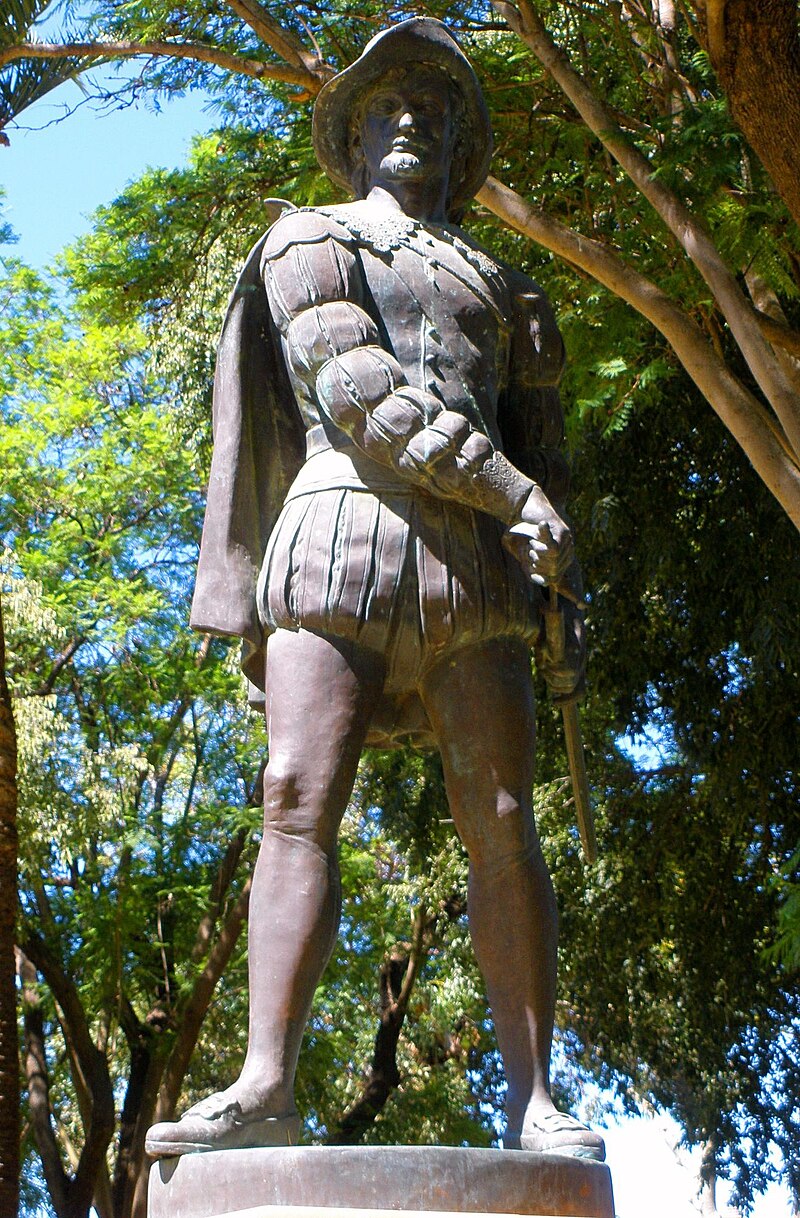 Monument to Don Juan Tenorio in Dos Hermanas, Seville Don Juan fascinated the 19th-century English novelist Jane Austen: "I have seen nobody on the stage who has been a more interesting Character than that compound of Cruelty and Lust".[15] The Danish philosopher Søren Kierkegaard discussed Mozart's version of the Don Juan story at length in his 1843 treatise Either/Or.[16] In 1901, Finnish composer Jean Sibelius wrote the second movement of his second symphony based on the climax of Don Juan. The piece begins with a representation of Death walking up the road to Don Juan's house, where Don Juan pleads with Death to let him live. Also, the 1905 novel The Song of the Blood-Red Flower by the Finnish author Johannes Linnankoski has been influenced by Don Juan along the protagonist of the story. The protagonist of Shaw's 1903 Man and Superman is a modern-day Don Juan named not Juan Tenorio but John Tanner. The actor playing Tanner morphs into his model in the mammoth third act, usually called Don Juan in Hell and often produced as a separate play due to its length. In it, Don Juan (played by Charles Boyer in a noted 1950s recording) exchanges philosophical barbs with the devil (Charles Laughton). In 1911, Ukrainian writer Lesya Ukrainka wrote poetic drama The Stone Host about Don Juan. As the author herself determined[citation needed], it's about the victory of the conservative principle[clarification needed] over the split soul of Donna Anna, and through her – over Don Juan. The traditional seducer of women became a victim of the woman who had broken his will. In Spain, the first three decades of the twentieth century saw more cultural fervor surrounding the Don Juan figure than perhaps any other period. In one of the most provocative pieces to be published, the endocrinologist Gregorio Marañón argued that, far from the paragon of masculinity he was often assumed to be, Don Juan actually suffered from an arrested psychosexual development.[17] During the 1918 influenza epidemic in Spain, the figure of Don Juan served as a metaphor for the flu microbe.[18] The mid-20th-century French author Albert Camus referred to Don Juan in his 1942 essay The Myth of Sisyphus. Camus describes Don Juan as an example of an "absurd hero", as he maintains a reckless abandon in his approach to love. His seductive lifestyle "brings with it all the faces in the world, and its tremor comes from the fact that it knows itself to be mortal". He "multiplies what he cannot unify ... It is his way of giving and vivifying".[19] In the 1956 Buddy Holly single "Modern Don Juan", the singer gains a reputation for being like the libertine in his pursuit of a romantic relationship. Swedish film director Ingmar Bergman wrote and directed a comic sequel in 1960 titled The Devil's Eye in which Don Juan, accompanied by his servant, is sent from Hell to contemporary Sweden to seduce a young woman before her marriage. Anthony Powell in his 1960 novel Casanova's Chinese Restaurant contrasts Don Juan, who "merely liked power" and "obviously did not know what sensuality was", with Casanova, who "undoubtedly had his sensuous moments".[20] Stefan Zweig observes the same difference between both characters in his biography of "Casanova".[21] in 1970 Faroese author William heinesen released his short story "Don Juan fra Tranhuset", in which a character embodying Don Juan is washed up on the Faroe Islands in Torshavn and begins to seduce the women of that town. In the 1910 French novel The Phantom of the Opera by Gaston Leroux, the titular character (also known as Erik) had spent much of his life writing an opera, Don Juan Triumphant, refusing to play it for Christine Daaé and telling her that it was unlike any music she ever heard and that when it was complete, he would die with it, never sharing it with mankind. Following the unmasking scene, Erik refers to himself as Don Juan as he confronts Christine, verbally and physically abusing her as he uses her hands to gouge his face, exclaiming "When a woman has seen me – as you have – she becomes mine ... I'm a real Don Juan ... Look at me! I'm Don Juan Triumphant!" Don Juan is also a plot point in Susan Kay's novel Phantom, which expands on Gaston Leroux's novel The Phantom of the Opera. The titular character was referred to as "Don Juan" in his childhood, a nickname given to him by Javert, a man who exploited Erik as a child. Later in life, he began writing Don Juan Triumphant, spending decades on the piece, which Christine Daaé heard after hiding in her room after removing Erik's mask. In the 1986 Broadway musical adaptation of Gaston Leroux's 1910 The Phantom of the Opera, the character of the Phantom writes an opera based on the legend of Don Juan called Don Juan Triumphant. Don Juan is mentioned in the 1980 Broadway musical adaptation of Victor Hugo's 1862 novel Les Misérables, in which the character Grantaire states that Marius Pontmercy is acting like Don Juan. The former Thai Queen Sirikit once told reporters that her son Crown Prince Vajiralongkorn, now King Rama X, was "a bit of a Don Juan". Don Juan is referenced in Star Trek the Original Series, season one episode 16 "Shore Leave". "Don Juan" is Cockney rhyming slang for a 2:1 degree classification.[22] |
文化的影響[編集] セビリアの ドス・エルマナスにあるドン・フアン・テノリオの記念碑 ドン・ファンは、19世紀のイギリスの小説家ジェーン・オースティンを魅了した: 「あの残酷さと欲望の化合物ほど興味深い人物を舞台で見たことがない」[15]。 デンマークの哲学者セーレン・キルケゴールは、1843年の論文『Either/Or』の中で、モーツァルト版のドン・ファンについて詳しく論じている [16]。 1901年、フィンランドの作曲家ジャン・シベリウスは、『ドン・ファン』のクライマックスに基づいて交響曲第2番の第2楽章を作曲した。この曲は、死が ドン・フアンの家までの道を歩き、そこでドン・フアンが生かすよう死に懇願する描写で始まる。また、フィンランドの作家ヨハネス・リンナコスキの1905 年の小説『血染めの花の歌』は、物語の主人公に沿ってドン・ファンから影響を受けている。 ショウの1903年の『人間とスーパーマン』の主人公は、フアン・テノリオではなくジョン・タナーという現代のドン・ファンである。タナー役の俳優は、通 常「地獄のドン・ファン」と呼ばれ、その長さからしばしば別の劇として上演される、巨大な第3幕で彼のモデルに変身する。その中で、ドン・ファン (1950年代の名録音でシャルル・ボワイエが演じた)は悪魔(チャールズ・ロートン)と哲学的な辛辣な言葉を交わす。 1911年、ウクライナの作家レシャ・ウクラインカが、ドン・ファンを題材にした詩劇『石の宿主』を書いた。作者自身が断定しているように[要出典]、こ の作品は、ドンナ・アンナの分裂した魂に対する保守主義[要出典]の勝利、そして彼女を通してのドン・ファンに対する勝利を描いている。伝統的な女性の誘 惑者は、自分の意志を打ち砕いた女性の犠牲者となった。 スペインでは、20世紀の最初の30年間、おそらく他のどの時代よりもドン・ファンという人物を取り巻く文化的熱狂が見られた。内分泌学者のグレゴリオ・ マラニョンは、最も挑発的な作品のひとつを発表し、ドン・ファンはしばしば想定される男らしさの模範とはほど遠く、実際には精神発達の停止に苦しんでいる と主張した[17]。 1918年にスペインでインフルエンザが流行した際、ドン・ファンの姿はインフルエンザ微生物のメタファーとして機能した[18]。 20世紀半ばのフランスの作家アルベール・カミュは、1942年のエッセイ『シジフォスの神話』の中でドン・ファンについて言及している。カミュはドン・ ファンを「不条理な英雄」の一例としており、彼は愛へのアプローチにおいて無謀なまでの奔放さを保っている。彼の魅惑的な生き方は、「この世のあらゆる顔 を持ち、その震えは自分が死すべき存在であることを知っていることから来る」。統一できないものを増殖させる。それが彼の与える方法であり、生かす方法な のだ」[19]。 1956年のバディ・ホリーのシングル「現代のドン・ファン」では、この歌手は恋愛関係を追い求める自由主義者のようだという評判を得ている。 スウェーデンの映画監督イングマール・ベルイマンは、1960年に『悪魔の目』というタイトルのコミカルな続編を脚本・監督しており、そこではドン・ファ ンが召使いを伴って地獄から現代のスウェーデンに送られ、結婚前の若い女性を誘惑する。 アンソニー・パウエルは1960年の小説『Casanova's Chinese Restaurant』の中で、「単に権力が好きだった」だけで、「明らかに官能が何であるかを知らなかった」ドン・ファンと、「間違いなく官能的な瞬間 を持っていた」カサノヴァを対比している[20]。ステファン・ツヴァイクは『カサノヴァ』の伝記の中で、両人物の同じ違いを観察している[21]。 1970年にフェロー諸島の作家ウィリアム・ハイネセンが発表した短編小説『Don Juan fra Tranhuset』では、ドン・ファンを体現した人物がフェロー諸島のトースハウンに流れ着き、その町の女性たちを誘惑し始める。 ガストン・ルルーによる1910年のフランスの小説『オペラ座の怪人』では、主人公(エリックとも呼ばれる)が人生の大半を費やして書いたオペラ『ドン・ ファン凱旋』が、クリスティーヌ・デーエのために演奏されることを拒み、彼女が聴いたことのない音楽であること、そして完成した暁には、決して人類と分か ち合うことなく、それとともに死ぬことを告げた。仮面を剥ぐシーンに続いて、エリックはクリスティーヌと対峙しながら、自分のことをドン・ファンだと言 い、彼女の手を使って自分の顔をえぐりながら、言葉でも身体でも彼女を罵倒し、こう叫ぶ。俺は本物のドン・ファンだ.俺を見ろ!俺はドン・ファンの凱旋 だ!"と叫ぶ。 ドン・ファンは、ガストン・ルルーの小説『オペラ座の怪人』を発展させたスーザン・ケイの小説『ファントム』にも登場する。主人公は幼少期、エリックを搾 取した男ジャヴェールからつけられたあだ名で「ドン・ファン」と呼ばれていた。その後、彼は『ドン・ファンの凱旋』を書き始め、何十年もかけてこの曲を完 成させた。クリスティーヌ・ダエは、エリックの仮面を外した後、部屋に隠れてこの曲を聴いた。 ガストン・ルルーが1910年に発表した『オペラ座の怪人』を1986年にブロードウェイでミュージカル化した作品では、ファントムの役がドン・ファン伝 説に基づくオペラ『ドン・ファン凱旋』を書いている。 ドン・ファンは、ヴィクトル・ユーゴーの1862年の小説『レ・ミゼラブル』を1980年にブロードウェイでミュージカル化した作品でも言及されており、 登場人物のグランテールが、マリウス・ポンメルシーはドン・ファンのように振る舞っていると述べている。 タイのシリキット前王妃は、息子のヴァジラロンコーン皇太子(現ラーマ10世)を「ドン・ファンみたいな人」と記者団に語ったことがある。 ドン・ファンは『スタートレック』オリジナル・シリーズのシーズン1エピソード16 "Shore Leave "で言及されている。 「ドン・ファン」はコックニーの韻を踏んだスラングで、2:1の学位分類を意味する[22]。 |
| Folkloristics In folkloristics, the theme of a human living recklessly inviting a dead person or skull for dinner is classified in the Aarne-Thompson-Uther Index as ATU 470A, "The Offended Skull".[23][24] |
民俗学[編集] 民俗学では、生きている人間が無謀にも死者や頭蓋骨を夕食に招くというテーマは、アーネ・トンプソン・ウザー・インデックスではATU 470A「The Offended Skull」として分類されている[23][24]。 |
| Casanova Don Juanism |
|
| https://en.wikipedia.org/wiki/Don_Juan |
|
| Don Juanism or Don
Juan syndrome Don Juanism or Don Juan syndrome is a non-clinical term for the desire, in a man, to have sex with many different female partners. The name derives from the Don Juan of opera and fiction. The term satyriasis is sometimes used as a synonym for Don Juanism. The term has also been referred to as the male equivalent of nymphomania in women.[1] These terms no longer apply with any accuracy as psychological or legal categories of psychological disorder.[1] |
ドン・ファニズム(Don
Juanism)またはドン・ファン・シンドローム(Don Juan syndrome) ドン・ジュアニズム(Don Juanism)またはドン・ジュアンシンドローム(Don Juan syndrome)とは、多くの異なる女性パートナーとセックスしたいという男性の願望を指す非臨床用語である。この名前は、オペラや小説のドン・ファン に由来する。ドン・ジュアニズムの同義語としてサチリア症という用語が使われることもある。また、この用語は、女性におけるニンフォマニアの男性版とも呼 ばれている[1]。これらの用語は、心理学的あるいは法的な精神障害のカテゴリーとしては、もはや正確には当てはまらない[1]。 |
| Analytical psychology Psychiatrist Carl Jung believed that Don Juanism was an unconscious desire of a man to seek his mother in every woman he encountered. However, he did not see the trait as entirely negative; Jung felt that positive aspects of Don Juanism included heroism, perseverance and strength of will.[2] Jung argues that related to the mother-complex "are homosexuality and Don Juanism, and sometimes also impotence. In homosexuality, the son's entire heterosexuality is tied to the mother in an unconscious form; in Don Juanism, he unconsciously seeks his mother in every woman he meets....Because of the difference in sex, a son's mother-complex does not appear in pure form. This is the reason why in every masculine mother-complex, side by side with the mother archetype, a significant role is played by the image of the man's sexual counterpart, the anima."[3] One of Theodore Millon's five narcissist variations is the amorous narcissist which includes histrionic features. According to Millon, the Don Juan or Casanova of our times is erotic and exhibitionistic.[4] |
分析心理学[編集] 精神科医のカール・ユングは、ドン・ファン主義とは、出会うすべての女性に母親を求める男性の無意識の欲求であると考えた。しかし、ユングはドンファニズ ムの肯定的な側面として、英雄主義、忍耐強さ、意志の強さなどを挙げている[2]。ユングは、マザー・コンプレックスに関連して、「同性愛とドンファニズ ム、そして時にはインポテンツがある」と主張している。同性愛では、息子の異性愛全体が無意識のうちに母親と結びついている。ドン・ファン主義では、息子 は出会うすべての女性に無意識のうちに母親を求める......性の違いのために、息子の母親コンプレックスは純粋な形では現れない。これが、あらゆる男 性的な母コンプレックスにおいて、母の原型と並んで、男性の性的な相手であるアニマのイメージが重要な役割を果たす理由である」[3]。 セオドア・ミロンの5つのナルシシストのバリエーションの1つは、ヒストリオ的特徴を含む情愛的ナルシシストである。ミロンによれば、現代のドン・ファン やカサノバはエロティックで露出狂である[4]。 |
| Psychoanalysis Sigmund Freud explored the connections between mother-fixation and a long series of love-attachments in the first of his articles on the 'Psychology of Love';[5] while Otto Rank published an article on the Don Juan gestalt in 1922.[6] Otto Fenichel saw Don Juanism as linked to the quest for narcissistic supply, and for proof of achievement (as seen in the number of conquests).[7] He also described what he called the 'Don Juans of Achievement' – people compelled to flee from one achievement to another in an unconscious but never ending quest to overcome an unconscious sense of guilt[8] Sándor Ferenczi stressed the fear of punishment (Hell) in the syndrome, linking it to the Oedipus complex.[9] Contemporary psychoanalysis stresses the denial of psychic reality and the avoidance of change implicit in Don Juan's (identificatory) pursuit of multiple females.[10] |
精神分析[編集] ジークムント・フロイトは、「愛の心理学」に関する論文の最初のもので、母親への執着と一連の長い愛の執着とのつながりを探求した[5]。オットー・ラン クは1922年にドン・ファン・ゲシュタルトに関する論文を発表した[6] 。 [7]彼はまた、「達成のドン・ファン」と呼ばれる人々-無意識的な罪悪感を克服するために、無意識的だが終わることのない探求の中で、ある達成から別の 達成へと逃避することを余儀なくされる人々-について述べた[8] 。 現代の精神分析は、ドン・ファンが複数の女性を(同一視して)追い求めることに暗黙のうちにある心的現実の否定と変化の回避を強調している[10]。 |
| Cultural references Aspects of the character are examined by Mozart and his librettist Da Ponte in their opera Don Giovanni, perhaps the best-known artistic work on this subject. To write their opera, Mozart and Da Ponte are known to have consulted with the famous libertine, Giacomo Casanova, the usual historic example of Don Juanism. Although not conclusively established, it is probable that Casanova attended the premiere of this opera, which was likely understood by the audience to be about himself.[11] Charles Rosen saw what he called "the seductive physical power" of Mozart's music as linked to 18th-century libertinism, political fervor and incipient Romanticism,[12] while in a famous passage the philosopher Kierkegaard discusses Mozart's version of the Don Juan story.[13] Albert Camus has also written on the subject;[14] while Jane Austen was fascinated by the character of Don Juan: "I have seen nobody on the stage who has been a more interesting Character than that compound of Cruelty and Lust".[15] Anthony Powell in his novel Casanova's Chinese Restaurant distinguishes Don Juan from Casanova: "Don Juan merely liked power. He obviously did not know what sensuality was....Casanova, on the other hand, undoubtedly had his sensuous moments".[16] In the 4th season Cheers episode "Don Juan is Hell", Diane Chambers writes a sexual history study that suggests Sam Malone as a perfect model for Don Juanism. |
文化的言及[編集] モーツァルトとその脚本家ダ・ポンテは、オペラ『ドン・ジョヴァンニ』の中で、ドン・ジョヴァンニの性格について考察している。オペラを書くために、モー ツァルトとダ・ポンテは有名な自由人ジャコモ・カサノヴァに相談したことが知られている。決定的な証拠はないが、カサノヴァがこのオペラの初演に出席した 可能性は高く、観客はこのオペラがカサノヴァ自身のことを歌っていると理解していた可能性が高い[11]。チャールズ・ローゼンは、モーツァルトの音楽の 「魅惑的な肉体的力」と呼ばれるものを、18世紀の自由主義、政治的熱狂、初期のロマン主義と結びついていると見ており[12]、哲学者キルケゴールは有 名な一節でモーツァルトのドン・ファン物語版について論じている[13]。 アルベール・カミュもこのテーマについて書いている[14]。一方、ジェーン・オースティンはドン・ファンのキャラクターに魅了された。「残酷さと欲望の 化合物ほど興味深いキャラクターを舞台上で見たことがない」[15]。アンソニー・パウエルは小説『カサノヴァの中華料理店』の中で、ドン・ファンとカサ ノヴァを区別している。一方、カサノヴァには間違いなく官能的な瞬間があった」[16]。 第4シーズンの『チアーズ』のエピソード「ドン・ファンは地獄」で、ダイアン・チェンバースは、ドン・ファン主義の完璧なモデルとしてサム・マローンを示 唆する性史研究を書いている。 |
| Acting out Free love Giacomo Casanova Hypersexuality Narcissistic personality disorder (Millon's variations) Repetition compulsion Sex addict |
行動する(アクティング・アウト) 自由な愛 ジャコモ・カサノバ 性欲過剰 自己愛性人格障害(ミロンのバリエーション) 反復強迫 セックス依存症 |
| https://en.wikipedia.org/wiki/Don_Juanism |
|
| Lothario is an Italian name used
as shorthand for an unscrupulous seducer of women, based upon a
character in The Fair Penitent, a 1703 tragedy by Nicholas Rowe.[1][2]
In Rowe's play, Lothario is a libertine who seduces and betrays
Calista; and his success is the source for the proverbial nature of the
name in the subsequent English culture.[3] The Fair Penitent itself was
an adaptation of The Fatal Dowry (1632), a play by Philip Massinger and
Nathan Field.[4] The name Lothario was previously used for a somewhat
similar character in The Cruel Brother (1630) by William Davenant.[5] A
character with the same name also appears in The Ill-Advised Curiosity,
a story within a story in Miguel de Cervantes' 1605 novel, Don Quixote,
Part One, however the "Lothario" there is most unwilling to seduce his
friend's wife and only does so upon the urging of the former, who
recklessly wants to test her fidelity. It was first mentioned in the modern sense in 1756 in The World, the 18th century London weekly newspaper, No. 202 ("The gay [meaning joyful, merry] Lothario dresses for the fight").[5] Samuel Richardson used "haughty, gallant, gay Lothario" as the model for the self-indulgent Robert Lovelace in his novel Clarissa (1748), and Calista suggested the character of Clarissa Harlowe.[4] Edward Bulwer-Lytton used the name allusively in his 1849 novel The Caxtons ("And no woman could have been more flattered and courted by Lotharios and lady-killers than Lady Castleton has been").[6] Anthony Trollope in Barchester Towers (1857) wrote of "the elegant fluency of a practised Lothario".[7] Because of the allusive use the name sometimes is not capitalised.[1] 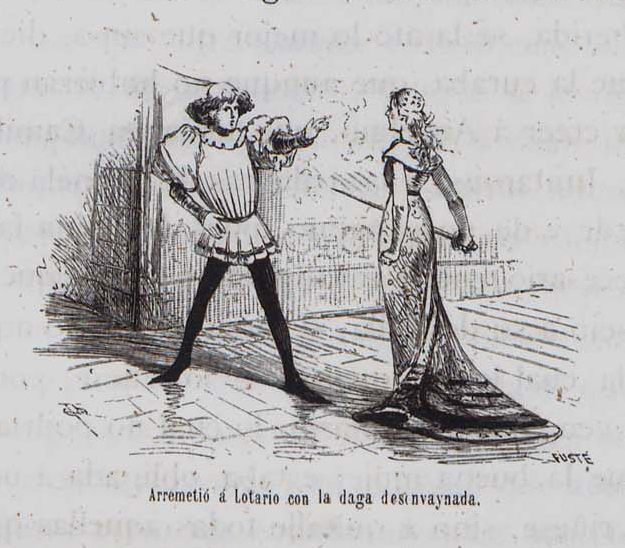 Camilla threatens Lothario with a dagger. Illustration by Apeles Mestres [ca], engraving by Francisco Fusté. |
ロタリオは、1703年にニコラス・ロウによって書かれた悲劇『公正な
懺悔者』の登場人物に基づく、女性を誘惑する不謹慎な人物の略称として使われるイタリア語の名前である[1][2]。
[ロウの戯曲では、ロサリオはカリスタを誘惑して裏切る自由主義者であり、彼の成功が、その後のイギリス文化におけるこの名前のことわざ的性質の源となっ
ている。 [ミゲル・デ・セルバンテスの1605年の小説『ドン・キホーテ』第一部に登場する物語の中の物語である
『不謹慎な好奇心』にも同名の人物が登場するが、そこでの「ロサリオ」は友人の妻を誘惑することを最も嫌がり、彼女の貞節を無謀にも試したがる前者の勧め
で誘惑するのみである。 現代的な意味で初めて言及されたのは1756年、18世紀のロンドンの週刊新聞『ザ・ワールド』の202号(「The gay [陽気な、愉快な]Lothario dresses for the fight」)である[5]。サミュエル・リチャードソンは小説『クラリッサ』(1748年)の中で、「高慢で、胆振りが強く、ゲイなLothario」 をわがままなロバート・ラブレスのモデルとして使い、カリスタはクラリッサ・ハーロウのキャラクターを提案した。 [4] エドワード・ブルワー=リットンは1849年の小説『The Caxtons』でこの名前を暗示的に使っている(「キャッスルトン夫人ほどロサリオやレディキラーに媚びへつらわれ、求愛された女性はいない」) [6]。アンソニー・トロロープは『Barchester Towers』(1857年)の中で「実践的なロサリオの優雅な流暢さ」について書いている[7]。 冗長な用法のため、名前は大文字で表記されないこともある[1]。  短剣でロタリオを脅すカミラ。挿絵:アペレス・メストレス[ca]、版画:フランシスコ・フステ。 |
★ モリエールのドン・ジュアン
【背 景】「「モ リエールはこのころ、私生活においては極めて波乱に満ちた生活を送っていた。1662年に結婚した妻・アルマンド・ベジャールとの夫婦関係はうまくいか ず、数年前から抱えていた胸部の疾患が悪化しており、健康状態も良くなかった。そこへ来て『タルチュフ』は上演を禁止され、その解禁を取り付けるための画 策に労力を費やさなければならない。そのうえ6月の公演で無料入場者を拒否したために、パレ・ロワイヤル入り口では流血騒ぎが起こり、多額の見舞金を支払 わされる羽目になった。9月には親友が、10月には南フランス修業時代から苦楽を共にしてきた団員のデュ・パルク(マルキーズの夫)が、11月10日には 息子のルイが1歳にもならずにこの世を去った。[77]。/ こうして肉体的にも精神的にも激しいダメージを負ったモリエールは、積極的に劇場で上演を行うよりも、王弟殿下や貴族の私邸で『タルチュフ』を含む自らの これまでの作品を上演にかけることが多くなった。劇場では11月に『エリード姫』の市民向け公演がパレ・ロワイヤルで始まり、ある程度は成功をおさめた が、その成功もいつまでも続くとは思えなかった[77]。/ だがモリエールは、こうして足踏みしているわけにもいかなかった。ライバルたちとの競争に敗けるわけにはいかないし、すでに彼は多くの座員を抱える劇団の 座長であり、その生活を保証しなければならない重い責任を抱えていたからである。こうして追い詰められたモリエールは、手っ取り早く成功を収めるためにド ン・ジュアン伝説に目を付けた。ちょうどパリで流行していたし、おあつらえ向きなことに喜劇的な題材でもある。そして何より、自分を苦しめるキリスト教狂 信者たちへの恨みを晴らし、奴らへの激烈な批判をも容易く盛り込める話の筋ではないか。これ以上ない題材を見つけたモリエールは、一気呵成に作品を書き上 げた。こうして完成したのが『ドン・ジュアン』である。短期間のうちに書き上げられ たために、当時戯曲を書く際に守るべき規則(アレクサンドラン、三一致の法則)などを悉く踏みにじっており、形式的な完成度は決して高くない[78]。/ 「ドン・ジュアン (戯曲)」 も参照/ 『ドン・ジュアン』は1665年2月15日に上演が開始された。モリエールの目論み通りに滑り出しから興行成績は絶好調であったが、やはり狂信者たちは 黙っていなかった。彼らの批判が早速始まったので、モリエールもこの批判内容の一部を汲んで、作品の場面を一部削除するなどして再び上演にかけたが、批判 は止むどころかますます強くなっていった。そのため、観客の反応が良いにも関わらず、わずか15回で上演を取りやめなければならなかった。一時的な上演自 粛であればまだよかったものの、この作品はこれ以後、モリエールの生存中には2度と上演・出版されなかった。その内容があまりに過激であったため、 1682年に初めてモリエール全集が世に出た時もこの作品は大幅な削除が加えられた形で収録された。徹底して忌避され続けたため、誰の手も加えられていな い、モリエールが書いたままの『ドン・ジュアン』は散逸しかけたが、再び1841年に舞台にかけられた。実に200年近くの眠りから覚めての舞台復帰で あった[79][80]」」
【シ ノプシス】
「■ 第1幕
舞
台はシチリア島。スペインの青年貴族ドン・ジュアンは、スガナレルを連れて旅に出ている。妻のドンヌ・エルヴィールに飽きたので、浮気をするためである。
スガナレルにそのことを諫められるが、ドン・ジュアンには最初にできた女とずっと一緒にいることなどは束縛でしかなく、とても耐えられないことなのであっ
た。エルヴィールが彼を追って来たが、ドン・ジュアンは彼女の嘆きを軽くいなしてしまう。ドン・ジュアンは、スガナレルさえも呆れかえるほどの放蕩者なの
であった。
■ 第2幕
舞
台は海岸に近い田舎。百姓・ピエロが婚姻関係にある恋人のシャルロットに手柄話をしている。海で溺れている男性2人を救助したのだという。身なりから察す
るに2人とも相当に立派な階級のもので、まさしくその2人はドン・ジュアンとスガナレルなのであった。新たに目を付けていた女性を追って船を出したが、強
風に呷られ転覆し、危うく死にかけたのである。ドン・ジュアンは早速シャルロットを口説きはじめ、成功しかかるが、ピエロは当然怒りを見せる。シャルロッ
トの不貞行為を言いつけようと、マチュリーヌを呼びよせるが、そのマチュリーヌまで口説きおとされ、まさに「ミイラ取りがミイラになった」のであった。ド
ン・ジュアンの言葉を信用していては、どのみち不幸になるのがわかっているので、彼のいない間に2人の女を優しく説得しようとするスガナレル。しかしそう
こうしているうちに、12名の騎士がドン・ジュアンを追ってきていることが判明する。
■ 第3幕
ド
ン・ジュアンは田舎者に、スガナレルは医者に変装しての幕開け。医術を信じるかどうかで、ドン・ジュアンはスガナレルを言い負かすが、議論に白熱して道に
迷ってしまう。そこで森の貧者に声をかけ、街への道を教えてもらうが、その見返りに施しを求められた。この貧者は信心深く、神への祈りに毎日明け暮れてい
るが赤貧に喘いでおり、ドン・ジュアンは「神様を呪ってみろ、そうすればルイ金貨を1枚恵んでやるぞ」と言い放つ[1]。結局金貨を恵んでやったドン・
ジュアンだが、今度は3人の賊を相手に孤軍奮闘する貴族を見かけ、助太刀に飛び入る。首尾よく救出に成功するのだが、なんとその男はエルヴィールの兄であ
るドン・カルロスであり、まさにドン・ジュアンを追ってやってきたのであった。そうと知って立場を「ドン・ジュアンの友人」と偽り、「彼に償いをつけさせ
る」と約束してしまう。が、その直後にドン・カルロスの弟ドン・アロンスが来てしまい、正体が露見してしまう。ドン・カルロスは騎士として命を救われた恩
を忘れず、その返礼として仇を討とうといきり立つ弟を宥めて、ドンヌ・エルヴィールとの約束を守るようにドン・ジュアンに告げて立ち去った。恐怖で隠れて
いたスガナレルをドン・ジュアンが叱りつけていると、今度は立派な建物が見えてきた。この建物は以前ドン・ジュアンが決闘で殺した騎士の墓なのであった。
大理石のその騎士の像を見てスガナレルが恐がるので、ふざけて晩餐に招かせたところ、なんと像がうなずき、それを承諾したのであった。
■
第4幕
晩
餐に現れた騎士の像(中央)、ドン・ジュアン(左)、スガナレル(右)
ドン・ジュアンの部屋から幕開け。像が頷いたのは、単なる錯覚だと気にも留めないドン・ジュアン。そこへ様々な人間が現れる。借金の返済を求めてディマン
シュが現れ、厳格な父ドン・ルイは息子の放蕩ぶりを説教しにやってきた。修道女になる覚悟も決め、ドン・ジュアンのためを思って心から身持ちを改めるよう
エルヴィールも勧めに来たが、何れもドン・ジュアンには何の効果もなく、ただ聞き流してしまう。ようやく晩餐をはじめるが、やたらと戸を叩く者がいる。戸
を叩いていたのは騎士の像で、晩餐に招いてもらったお礼に、ドン・ジュアンを晩餐に誘いに来たのであった。それを承諾して、第4幕終了。
■ 第5幕
舞
台は郊外。ドン・ジュアンは父に改宗を誓い、スガナレルは大変な喜びを見せるが、これは偽りだった。ドン・ジュアンは偽善者になることにしたのである。そ
こへドン・カルロスが現れる。妹のエルヴィールと共に暮らすことを要求しに来たのであるが、ドン・ジュアンは「エルヴィールは世を捨てる覚悟を決めたし、
神にお伺いを立てたところ、『エルヴィールのことは気にかけるな、一緒に暮らしてはお前の魂は救われぬ』とのことであったのでそれはできない」と返答し、
ドン・カルロスの怒りを買ってしまう。それどころか、決闘の約束までしたのだった。以前よりも性質が悪くなった主人の姿にあきれ返るスガナレルであった
が、そこへ亡霊がやってきた。亡霊は悔悛を進めるが、これを無下に断るドン・ジュアン。そこへ騎士の像が現れ、手を握った瞬間に、ドン・ジュアンの体の上
に雷が落ち、大きな炎が噴き出した。ドン・ジュアンが死んで誰もが満足し、丸く事は収まったが、長年仕えてきたスガナレルだけが報われない。「おれの給
料!おれの給料!」とスガナレルが連呼しているところで、幕切れ。」
★ ドン・ジョバンニ自身は反省していないというスラヴォイ・ジジェク師匠の御説
「モー ツァルトの『ドン・ジョヴァンニ』のことを思い起こそう。コメンダトーレ (騎士 長)の石像との最後の対面の場面で、ドン・ジョヴァンニは、彼の罪深い過去を悔い改め、 否認することを拒むとき、根源的な倫理的な立場としか呼ぶ以外にはない何かを完成させ るのである。そのときの彼の頑強さは、カント自身が『実践理性批判』で挙げた、代償が 絞首台であると知るや否やすぐさま自分の情熱の満足を断念する覚悟を決めるリベルタン という例を、嘲笑いながら転倒させるかのようなのだ。ドン・ジョヴァンニは、彼を待ち 受けているものが、ただ絞首台のみであって、いかなる満足でもないということをはっき りと知っているまさにそのときに、自らのリベルタン的態度に執着する。つまり、病理的 な利害の立場からするなら、なすべきことは改悛の身振りをかたちばかりしてみせるとい うことであったはずだ。ドン・ジョヴァンニは死が近いことを知っている、したがって 自 らの行いを悔い改めたところで失うものは何もなく、ただ得るばかりである(つまり、死 後に責め苛まれることを避けることができる)。しかし、彼は「原理にしたがって」リベ ルタンの反抗的なスタンスを一貫させることを選ぶ。石像に対する、この生ける死者に対 する、彼の不屈の「ノー」を、その内容が「悪」であるにもかかわらず、非妥協的な倫理 的態度のモデルとして経験しないことなど、どのようにしてできようか。pp.186-」否定的なもののもとへの滞留 : カント、ヘーゲル、イデオロギー批判 / スラヴォイ・ジジェク著 ; 酒井隆史, 田崎英明訳, 筑摩書房 , 2006.1. - (ちくま学芸文庫)
★ ジアコーモ・カサノーヴァ(Giacomo Casanova, 1725-1798)——リアルな人物像としての女たらしあるいは現実に存在した「性豪」
| Giacomo Girolamo
Casanova (/ˌkæsəˈnoʊvə, ˌkæzə-/,[1][2][3] Italian: [ˈdʒaːkomo
dʒiˈrɔːlamo kazaˈnɔːva, kasa-]; 2 April 1725 – 4 June 1798) was an
Italian adventurer and author from the Republic of Venice.[4][5] His
autobiography, Histoire de ma vie (Story of My Life), is regarded as
one of the most authentic and provocative sources of information about
the customs and norms of European social life during the 18th
century.[6] Casanova was known to use pseudonyms, such as baron or count of Farussi (the maiden name of his mother) or Chevalier de Seingalt (French pronunciation: [sɛ̃ɡɑl]).[7] After he began writing in French, following his second exile from Venice, he often signed his works as "Jacques Casanova de Seingalt".[a] He claims to have mingled with European royalty, popes, and cardinals, along with the artistic figures Voltaire, Goethe, and Mozart. He has become so famous for his often complicated and elaborate affairs with women, that his name "might be said to be synonymous with libertine".[8] His final years were spent in Dux Chateau (Bohemia) as a librarian in Count Waldstein's household, where he also wrote his autobiography. |
ジャコモ・ジロラモ・カサノヴァ
(/ˌkæsəˈnoʊə/,[1][2][3]イタリア語: [ˈdʒaːkomo dˈdʒ kazaˈnɔːva, kasa-];
1725年4月2日 - 1798年6月4日)はヴェネツィア共和国出身のイタリアの冒険家、作家である。
[4][5]彼の自伝であるHistoire de ma vie(Story of My
Life)は、18世紀のヨーロッパ社会生活の習慣や規範に関する最も信憑性が高く挑発的な情報源のひとつとみなされている[6]。 カサノヴァは、ファルシ男爵や伯爵(母親の旧姓)、シュヴァリエ・ド・セインガルト(フランス語発音:[sɛ̃ɑ])などの偽名を使うことで知られてい た。 [7]ヴェネツィアからの2度目の亡命後、フランス語で執筆を始めた後、彼はしばしば作品に「ジャック・カサノヴァ・ド・セインガルト」と署名した [a]。彼はヨーロッパの王族、教皇、枢機卿、芸術家であるヴォルテール、ゲーテ、モーツァルトらと交わったと主張している。 女性との複雑で手の込んだ情事をしばしば行ったことで有名になり、その名は「自由主義者(リベルタン) の代名詞と言えるかもしれない」[8]。晩年はワルトシュタイン伯爵家の司書として デュックス・シャトー(ボヘミア)で過ごし、そこで自伝も執筆した。 |
| Biography Youth 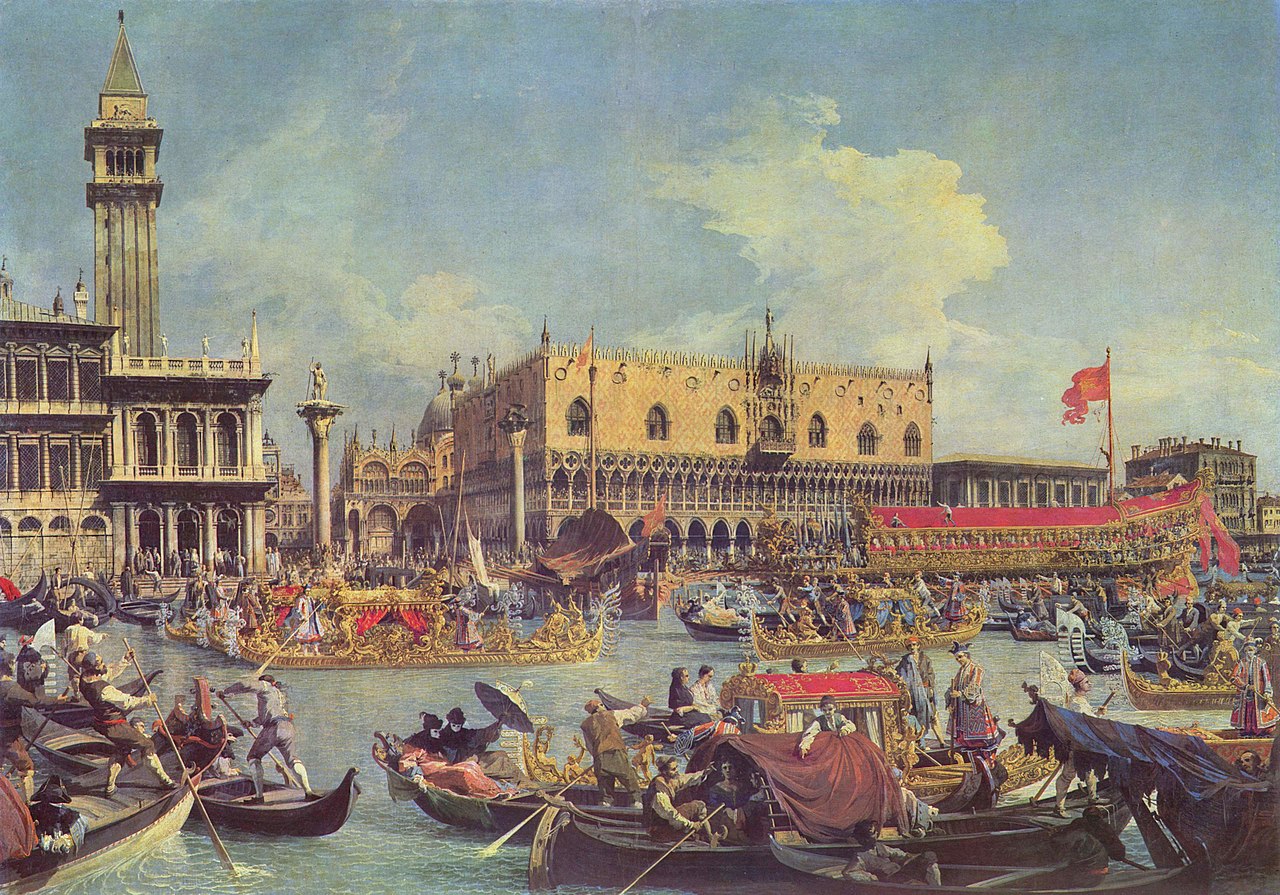 Venice in the 1730s Giacomo Girolamo Casanova was born in Venice in 1725 to actress Zanetta Farussi, wife of actor and dancer Gaetano Casanova. Giacomo was the first of six children, followed by Francesco Giuseppe (1727–1803), Giovanni Battista (1730–1795), Faustina Maddalena (1731–1736), Maria Maddalena Antonia Stella (1732–1800), and Gaetano Alvise (1734–1783).[9][10] At the time of Casanova's birth, the city of Venice thrived as the pleasure capital of Europe, ruled by political and religious conservatives who tolerated social vices and encouraged tourism.[11] It was a required stop on the Grand Tour, traveled by young men coming of age, especially those belonging to the British aristocracy. The famed Carnival, gambling houses, and beautiful courtesans were powerful drawcards. This environment provided many of his formative experiences.[12] 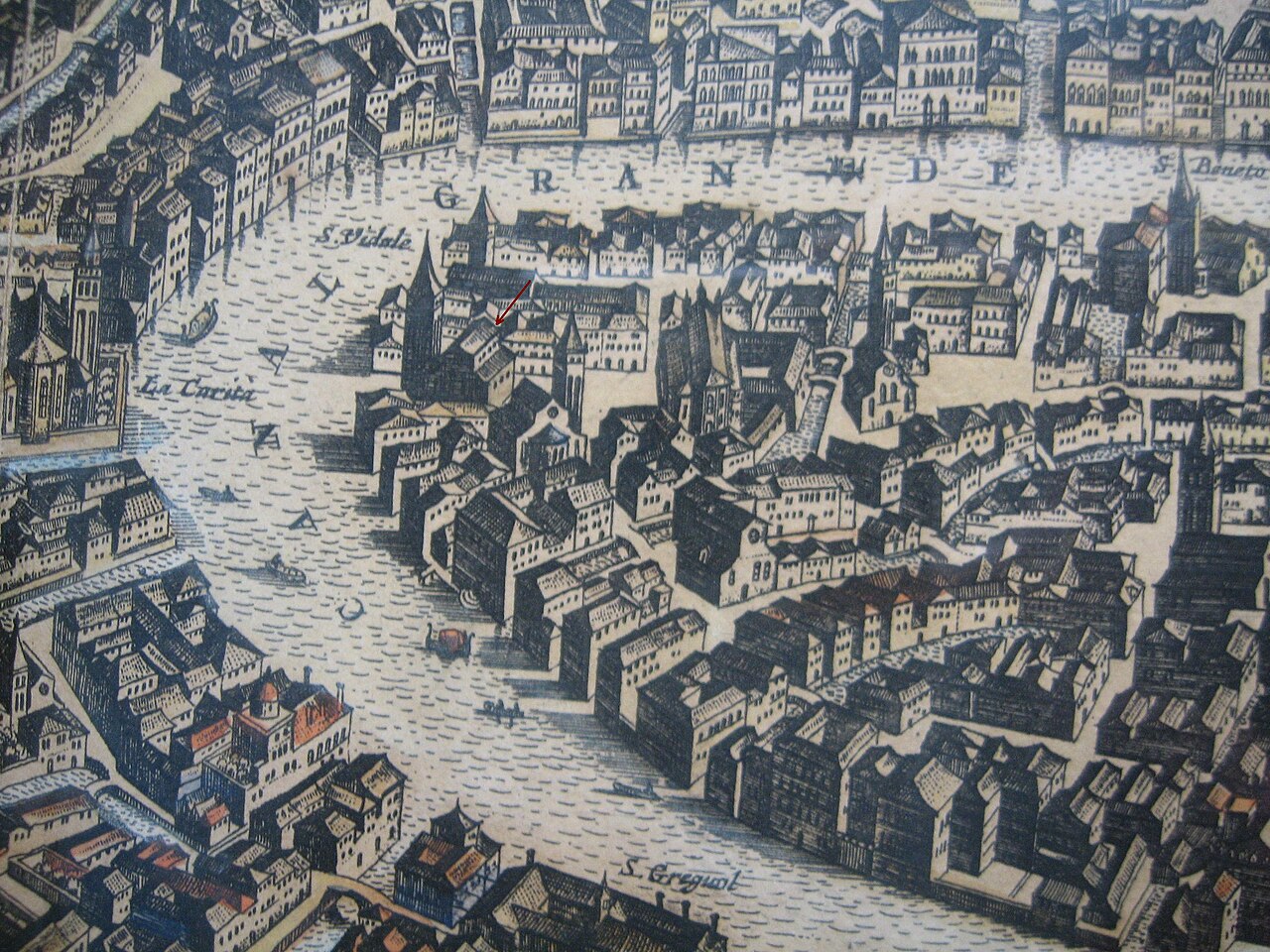 San Samuele – Casanova's childhood neighborhood His grandmother, Marzia Baldissera, cared for him while his mother toured about Europe in the theater. His father died when he was eight. As a child, Casanova suffered nosebleeds and his grandmother sought help from a witch: "Leaving the gondola, we enter a hovel, where we find an old woman sitting on a pallet, with a black cat in her arms and five or six others around her."[13] Though the unguent applied was ineffective, Casanova was fascinated by the incantation.[14] Perhaps to remedy the nosebleeds (a physician blamed the density of Venice's air), Casanova, on his ninth birthday, was sent to a boarding house on the mainland in Padua. For Casanova, the neglect by his parents was a bitter memory. "So they got rid of me," he proclaimed.[15] Conditions at the boarding house were appalling, so he appealed to be placed under the care of Abbé Gozzi, his primary instructor, who tutored him in academic subjects, as well as the violin. Casanova moved in with the priest and his family and lived there through most of his teenage years.[16] In the Gozzi household, Casanova first came into contact with the opposite sex, when Gozzi's younger sister Bettina fondled him at the age of 11. Bettina was "pretty, lighthearted, and a great reader of romances. ... The girl pleased me at once, though I had no idea why. It was she who little by little kindled in my heart the first sparks of a feeling which later became my ruling passion."[17] Although she subsequently married, Casanova maintained a lifelong attachment to Bettina and the Gozzi family.[18] Casanova boasts of having demonstrated from early on a quick wit, an intense appetite for knowledge, and a perpetually inquisitive mind. He entered the University of Padua at 12 and graduated at 17, in 1742, with a degree in law ("for which I felt an unconquerable aversion").[19] His guardian's hope was that he would become an ecclesiastical lawyer.[16] Casanova had also studied moral philosophy, chemistry, and mathematics, and was keenly interested in medicine. ("I should have been allowed to do as I wished and become a physician, in which profession quackery is even more effective than it is in legal practice.")[19] He frequently prescribed his own treatments for himself and friends.[20] While attending the university, Casanova began to gamble and quickly got into debt, causing his recall to Venice by his grandmother, but the gambling habit became firmly established. 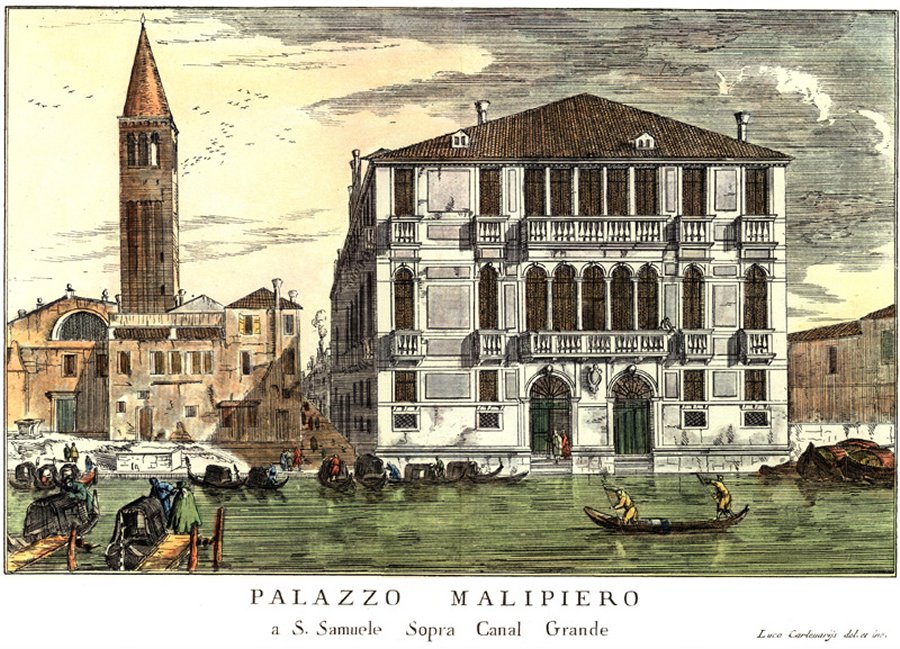 The Church of San Samuele, where Casanova was baptized, and Palazzo Malipiero c. 1716 Back in Venice, Casanova started his clerical law career and was admitted as an abbé after being conferred minor orders by the Patriarch of Venice. He shuttled back and forth to Padua to continue his university studies. By now, he had become something of a dandy—tall and dark, his long hair powdered, scented, and elaborately curled.[b] He quickly ingratiated himself with a patron (something he was to do all his life), 76-year-old Venetian senator Alvise Gasparo Malipiero, the owner of Palazzo Malipiero, close to Casanova's home in Venice.[23] Malipiero moved in the best circles and taught young Casanova a great deal about good food and wine, and how to behave in society. However, Casanova was caught dallying with Malipiero's intended object of seduction, actress Teresa Imer, and the senator drove both of them from his house.[18] Casanova's growing curiosity about women led to his first complete sexual experience, with two sisters, Nanetta and Marton Savorgnan, then 14 and 16, who were distant relatives of the Grimanis. Casanova proclaimed that his life avocation was firmly established by this encounter.[24] Early career in Italy and abroad Scandals tainted Casanova's short church career. After his grandmother's death, Casanova entered a seminary for a short while, but soon his indebtedness landed him in prison for the first time. An attempt by his mother to secure him a position with Bishop Bernardo de Bernardis was rejected by Casanova after a very brief trial of conditions in the bishop's Calabrian see.[25] Instead, he found employment as a scribe with the powerful Cardinal Acquaviva in Rome. On meeting Pope Benedict XIV, Casanova boldly asked for a dispensation to read the "forbidden books" and from eating fish (which he claimed inflamed his eyes). He also composed love letters for another cardinal. When Casanova became the scapegoat for a scandal involving a local pair of star-crossed lovers, Cardinal Acquaviva dismissed Casanova, thanking him for his sacrifice, but effectively ending his church career.[26] In search of a new profession, Casanova bought a commission to become a military officer for the Republic of Venice. His first step was to look the part: Reflecting that there was now little likelihood of my achieving fortune in my ecclesiastical career, I decided to dress as a soldier ... I inquire for a good tailor ... he brings me everything I need to impersonate a follower of Mars. ... My uniform was white, with a blue vest, a shoulder knot of silver and gold... I bought a long sword, and with my handsome cane in hand, a trim hat with a black cockade, with my hair cut in side whiskers and a long false pigtail, I set forth to impress the whole city. — Casanova (2006), p. 223. Constantinople in the 18th century He joined a Venetian regiment at Corfu, his stay being broken by a brief trip to Constantinople, ostensibly to deliver a letter from his former master the Cardinal.[27] Finding his advancement too slow and his duty boring, he managed to lose most of his pay playing faro. Casanova soon abandoned his military career and returned to Venice. At the age of 21, he set out to become a professional gambler, but losing all the money remaining from the sale of his commission, he turned to his old benefactor Alvise Grimani for a job. Casanova thus began his third career, as a violinist in the San Samuele theater, "a menial journeyman of a sublime art in which, if he who excels is admired, the mediocrity is rightly despised. ... My profession was not a noble one, but I did not care. Calling everything prejudice, I soon acquired all the habits of my degraded fellow musicians."[28] He and some of his fellows, "often spent our nights roaming through different quarters of the city, thinking up the most scandalous practical jokes and putting them into execution ... we amused ourselves by untying the gondolas moored before private homes, which then drifted with the current". They also sent midwives and physicians on false calls.[29] Good fortune came to the rescue when Casanova, unhappy with his lot as a musician, saved the life of a Venetian patrician of the Bragadin family, who had a stroke while riding with Casanova in a gondola after a wedding ball. They immediately stopped to have the senator bled. Then, at the senator's palace, a physician bled the senator again and applied an ointment of mercury—an all-purpose but toxic remedy at the time[30]—to the senator's chest. This raised his temperature and induced a massive fever, and Bragadin appeared to be choking on his own swollen windpipe. A priest was called as death seemed to be approaching. However, despite protests from the attending physician, Casanova ordered the removal of the ointment and the washing of the senator's chest with cool water. The senator recovered from his illness with rest and a sensible diet.[31] Because of his youth and his facile recitation of medical knowledge, the senator and his two bachelor friends thought Casanova wise beyond his years, and concluded that he must be in possession of occult knowledge. As they were cabalists themselves, the senator invited Casanova into his household and became a lifelong patron.[32] Casanova stated in his memoirs: I took the most creditable, the noblest, and the only natural course. I decided to put myself in a position where I need no longer go without the necessities of life: and what those necessities were for me no one could judge better than me.... No one in Venice could understand how an intimacy could exist between myself and three men of their character, they all heaven and I all earth; they most severe in their morals, and I addicted to every kind of dissolute living. — Casanova (2006), p. 247. For the next three years under the senator's patronage, working nominally as a legal assistant, Casanova led the life of a nobleman, dressing magnificently and, as was natural to him, spending most of his time gambling and engaging in amorous pursuits.[33] His patron was exceedingly tolerant, but he warned Casanova that some day he would pay the price; "I made a joke of his dire Prophecies and went my way." However, not much later, Casanova was forced to leave Venice, due to further scandals. Casanova had dug up a freshly buried corpse to play a practical joke on an enemy and exact revenge, but the victim went into a paralysis, never to recover. In another scandal, a young girl who had duped him[clarification needed] accused him of rape and went to the officials.[34] Casanova was later acquitted of this crime for lack of evidence, but by this time, he had already fled from Venice. 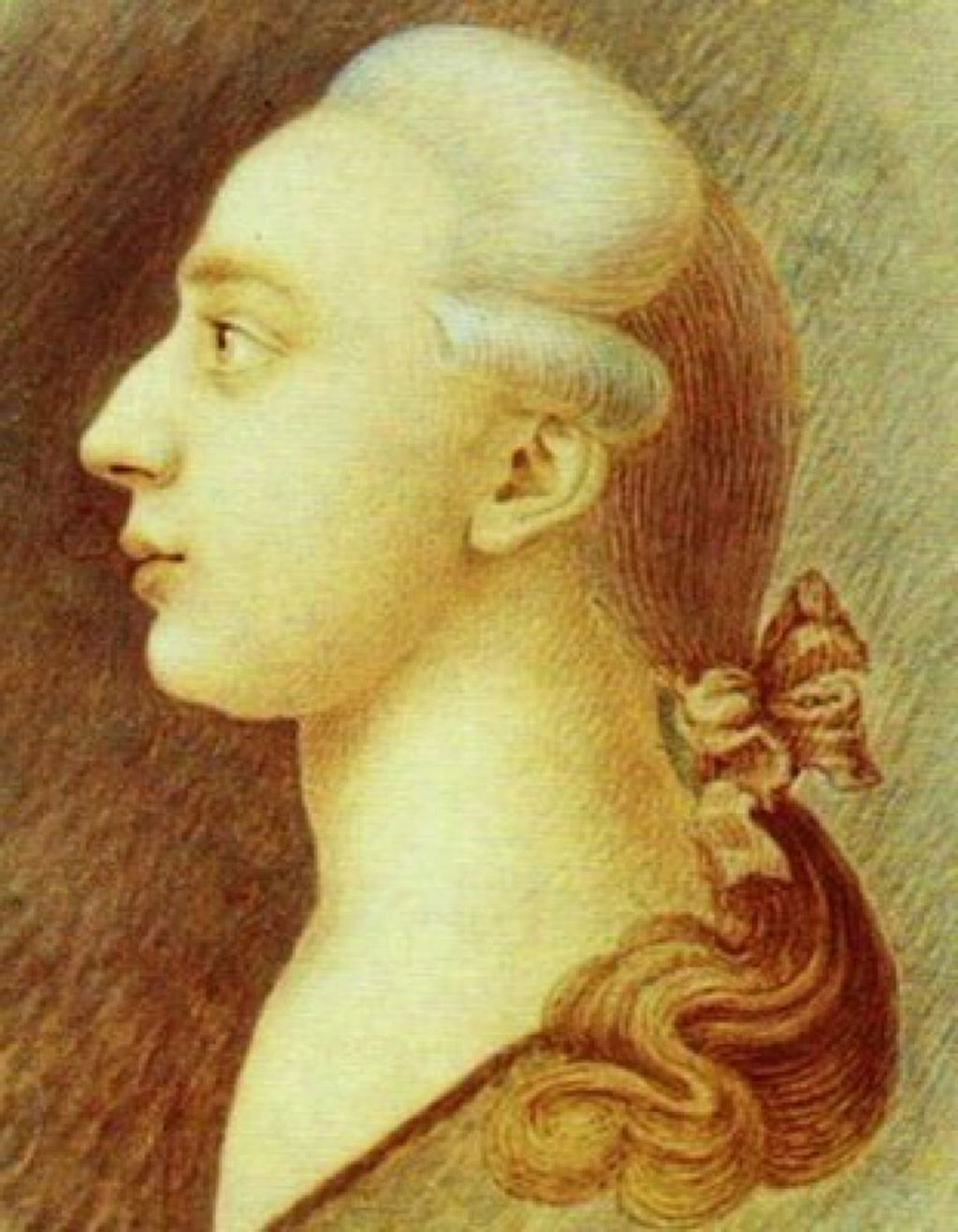 Drawing by his brother Francesco Escaping to Parma, Casanova entered into a three-month affair with a Frenchwoman he named "Henriette", perhaps the deepest love he ever experienced—a woman who combined beauty, intelligence, and culture. In his words, "They who believe that a woman is incapable of making a man equally happy all the twenty-four hours of the day have never known an Henriette. The joy which flooded my soul was far greater when I conversed with her during the day than when I held her in my arms at night. Having read a great deal and having natural taste, Henriette judged rightly of everything."[35] She also judged Casanova astutely. As noted Casanovist J. Rives Childs wrote: Perhaps no woman so captivated Casanova as Henriette; few women obtained so deep an understanding of him. She penetrated his outward shell early in their relationship, resisting the temptation to unite her destiny with his. She came to discern his volatile nature, his lack of social background, and the precariousness of his finances. Before leaving, she slipped into his pocket five hundred louis, mark of her evaluation of him. — Childs 1988, p. 46. Grand tour Crestfallen and despondent, Casanova returned to Venice, and after a good gambling streak, he recovered and set off on a grand tour, reaching Paris in 1750.[36] Along the way, from one town to another, he got into sexual escapades resembling operatic plots.[37] In Lyon, he entered the society of Freemasonry, which appealed to his interest in secret rites and which, for the most part, attracted men of intellect and influence who proved useful in his life, providing valuable contacts and uncensored knowledge. Casanova was also attracted to Rosicrucianism.[38] In Lyons, Casanova became companion and finally took the highest degree of Scottish Rite Master Mason.[39][40][8] Regarding his initiation to the Scottish Rite Freemasonry in Lyon, the Memoirs said: It was in Lyons that a respectable individual, whose acquaintance I made at the house of M. de Rochebaron, obtained for me the favour of being initiated in the sublime trifles of Freemasonry. I arrived in Paris a simple apprentice; a few months after my arrival I became companion and master; the last is certainly the highest degree in Freemasonry, for all the other degrees which I took afterwards are only pleasing inventions, which, although symbolical, add nothing to the dignity of master. — Memoirs of Jacques [Giovanni Giacomo] Casanova De Seingalt 1725–1798. To Paris and Prison, Volume 2A--Paris.[39][41] Casanova stayed in Paris for two years, learned the language, spent much time at the theater, and introduced himself to notables. Soon, however, his numerous liaisons were noted by the Paris police, as they were in nearly every city he visited.[42] In 1752, his brother Francesco and he moved from Paris to Dresden, where his mother and sister Maria Maddalena were living. His new play, La Moluccheide, now lost, was performed at the Royal Theatre, where his mother often played in lead roles.[43][44] He then visited Prague, and Vienna, where the tighter moral atmosphere was not to his liking. He finally returned to Venice in 1753.[45] There, Casanova resumed his escapades, picking up many enemies and gaining the scrutiny of the Venetian inquisitors. His police record became a lengthening list of reported blasphemies, seductions, fights, and public controversy.[46] A state spy, Giovanni Manucci, was employed to draw out Casanova's knowledge of cabalism and Freemasonry and to examine his library for forbidden books. Senator Bragadin, in total seriousness this time (being a former inquisitor himself), advised his "son" to leave immediately or face the stiffest consequences. Imprisonment and escape On 26 July 1755, at age 30, Casanova was arrested for affront to religion and common decency:[47] "The Tribunal, having taken cognizance of the grave faults committed by G. Casanova primarily in public outrages against the holy religion, their Excellencies have caused him to be arrested and imprisoned under the Leads."[48] "The Leads" was a prison of seven cells on the top floor of the east wing of the Doge's palace, reserved for prisoners of higher status as well as certain types of offenders—such as political prisoners, defrocked or libertine priests or monks, and usurers—and named for the lead plates covering the palace roof. The following 12 September, without a trial and without being informed of the reasons for his arrest and of the sentence, he was sentenced to five years imprisonment.[47][49] 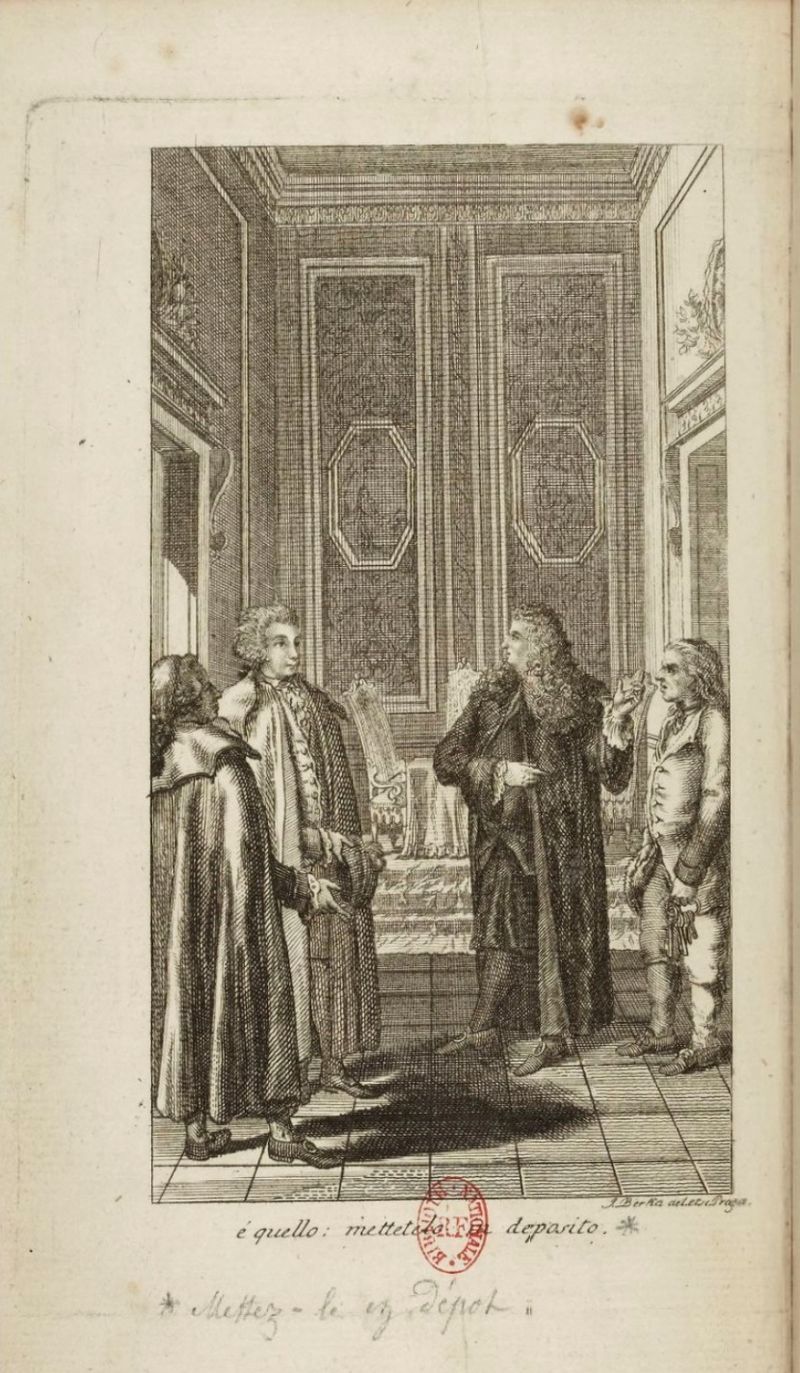 "It's him. Place him in custody!" He was placed in a single-person room with clothing, a pallet bed, table, and armchair in "the worst of all the cells",[50] where he suffered greatly from the darkness, summer heat, and "millions of fleas". He was later housed with a series of cellmates. After five months and a personal appeal from Count Bragadin, he was given warm winter bedding and a monthly stipend for books and better food. During exercise walks he was granted in the prison garret, he found a piece of black marble and an iron bar which he smuggled back to his cell; he hid the bar inside his armchair. When he was temporarily without cellmates, he spent two weeks sharpening the bar into a spike on the stone. Then he began to gouge through the wooden floor underneath his bed, knowing that his cell was directly above the Inquisitor's chamber.[51] Just three days before his intended escape during a festival, when no officials would be in the chamber below, Casanova was moved to a larger, lighter cell with a view, despite his protests that he was perfectly happy where he was. In his new cell, "I sat in my armchair like a man in a stupor; motionless as a statue, I saw that I had wasted all the efforts I had made, and I could not repent of them. I felt that I had nothing to hope for, and the only relief left to me was not to think of the future."[52] Casanova set upon another escape plan. He solicited the help of the prisoner in the adjacent cell, Father Balbi, a renegade priest. The spike, carried to the new cell inside the armchair, was passed to the priest in a folio Bible carried under a heaping plate of pasta by the hoodwinked jailer. The priest made a hole in his ceiling, climbed across and made a hole in the ceiling of Casanova's cell. To neutralize his new cellmate, who was a spy, Casanova played on his superstitions and terrorized him into silence.[53] When Balbi broke through to Casanova's cell, Casanova lifted himself through the ceiling, leaving behind a note that quoted the 117th Psalm (from the Latin Vulgate): "I shall not die, but live, and declare the works of the Lord".[54] 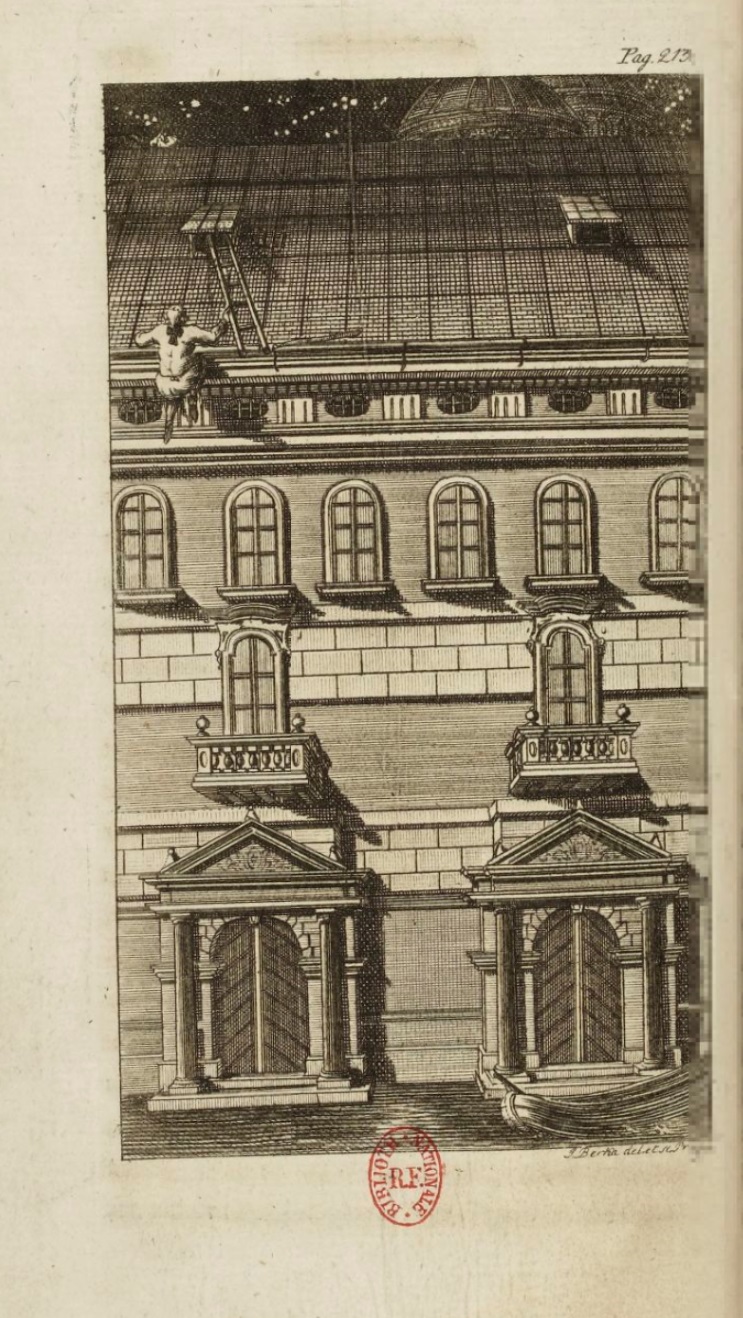 Illustration from Story of My Flight The spy remained behind, too frightened of the consequences if he were caught escaping with the others. Casanova and Balbi pried their way through the lead plates and onto the sloping roof of the Doge's Palace, with a heavy fog swirling. The drop to the nearby canal being too great, Casanova prised open the grate over a dormer window, and broke the window to gain entry. They found a long ladder on the roof, and with the additional use of a bedsheet "rope" that Casanova had prepared, lowered themselves into the room whose floor was 25 feet (7.6 m) below. They rested until morning, changed clothes, then broke a small lock on an exit door and passed into a palace corridor, through galleries and chambers, and down stairs, where, by convincing the guard they had inadvertently been locked into the palace after an official function, they left through a final door.[55] It was 6:00 in the morning and they escaped by gondola. Eventually, Casanova reached Paris, where he arrived on the same day (5 January 1757) that Robert-François Damiens made an attempt on the life of Louis XV.[56] (Casanova would later witness and describe his execution.) Thirty years later in 1787, Casanova wrote Story of My Flight, which was very popular and was reprinted in many languages, and he repeated the tale a little later in his memoirs.[57] Casanova's judgment of the exploit is characteristic: Thus did God provide me with what I needed for an escape which was to be a wonder if not a miracle. I admit that I am proud of it; but my pride does not come from my having succeeded, for luck had a good deal to do with that; it comes from my having concluded that the thing could be done and having had the courage to undertake it. — Casanova (2006), p. 502. Return to Paris He knew his stay in Paris might be a long one and he proceeded accordingly: "I saw that to accomplish anything I must bring all my physical and moral faculties in play, make the acquaintance of the great and the powerful, exercise strict self-control, and play the chameleon."[58] Casanova had matured, and this time in Paris, though still depending at times on quick thinking and decisive action, he was more calculating and deliberate. His first task was to find a new patron. He reconnected with his old friend de Bernis, now the Foreign Minister of France. Casanova was advised by his patron to find a means of raising funds for the state as a way to gain instant favor. Casanova promptly became one of the trustees of the first state lottery, and one of its best ticket salesmen.[59] The enterprise earned him a large fortune quickly.[60] With money in hand, he traveled in high circles and undertook new seductions. He duped many socialites with his occultism, particularly the Marquise Jeanne d'Urfé, using his excellent memory which made him appear to have a sorcerer's power of numerology. In Casanova's view, "deceiving a fool is an exploit worthy of an intelligent man".[61] 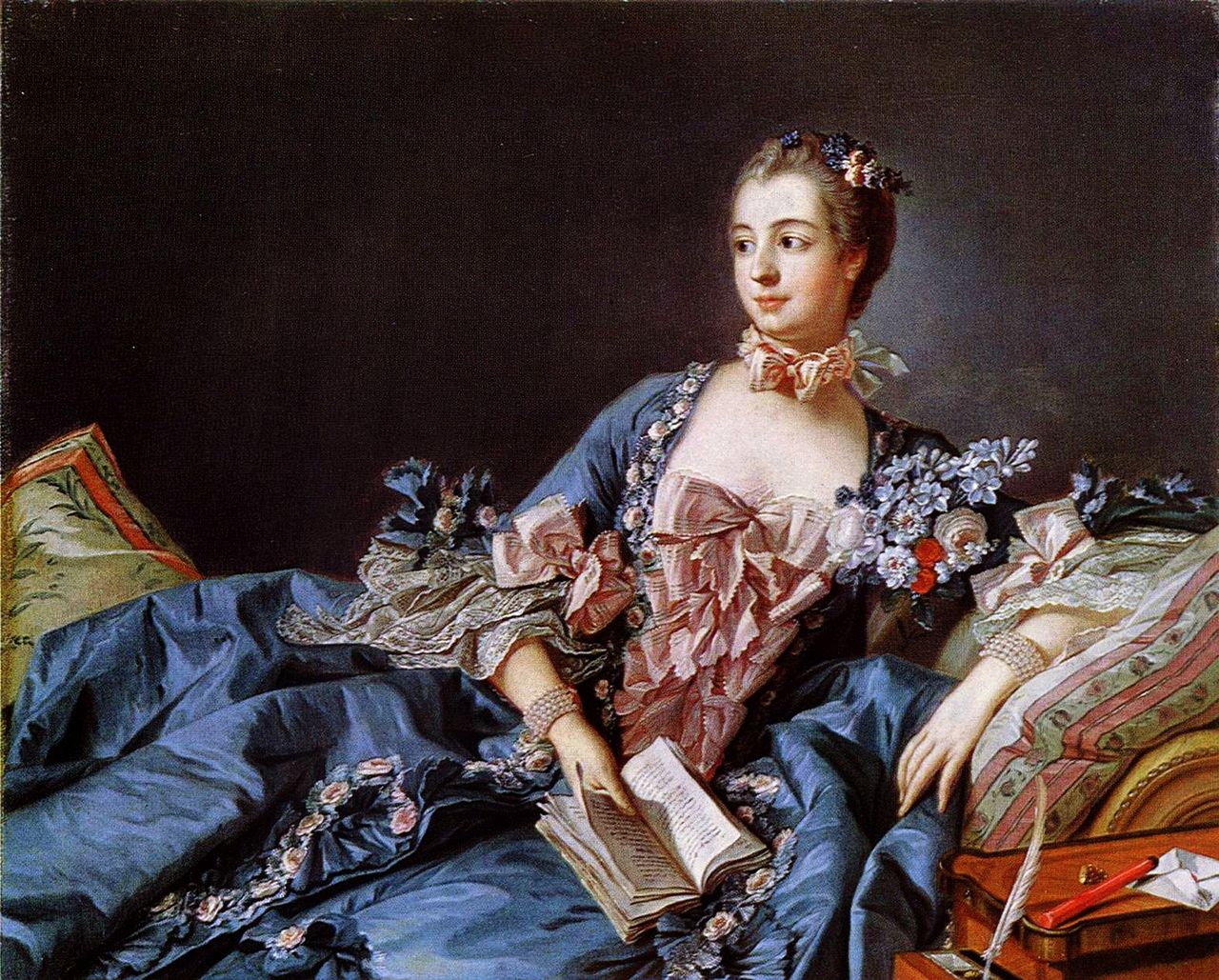 Madame de Pompadour, c. 1750 Casanova claimed to be a Rosicrucian and an alchemist, aptitudes which made him popular with some of the most prominent figures of the era, among them Madame de Pompadour, the Count of Saint-Germain, d'Alembert, and Jean-Jacques Rousseau. So popular was alchemy among the nobles, particularly the search for the "philosopher's stone", that Casanova was highly sought after for his supposed knowledge, and he profited handsomely.[62] He met his match, however, in the Count of Saint-Germain: "This very singular man, born to be the most barefaced of all imposters, declared with impunity, with a casual air, that he was three hundred years old, that he possessed the universal medicine, that he made anything he liked from nature, that he created diamonds."[63] De Bernis decided to send Casanova to Dunkirk on his first spying mission. Casanova was paid well for his quick work and this experience prompted one of his few remarks against the ancien régime and the class on which he was dependent. He remarked in hindsight, "All the French ministers are the same. They lavished money which came out of the other people's pockets to enrich their creatures, and they were absolute: The down-trodden people counted for nothing, and, through this, the indebtedness of the State and the confusion of finances were the inevitable results. A Revolution was necessary."[64] 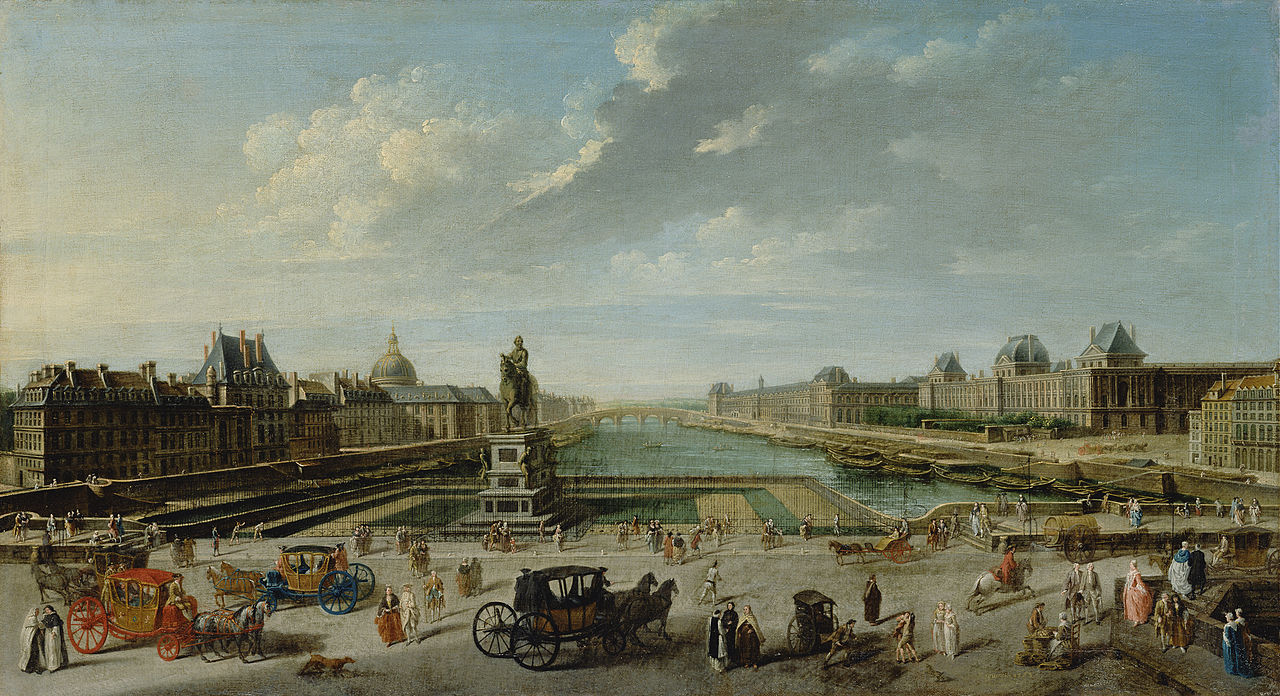 Paris in the 18th century As the Seven Years' War began, Casanova was again called[65] to help increase the state treasury. He was entrusted with a mission of selling state bonds in Amsterdam, the Netherlands being the financial center of Europe at the time.[66] He succeeded in selling the bonds at only an 8% discount, and the following year was rich enough to found a silk manufactory with his earnings. The French government even offered him a title and a pension if he would become a French citizen and work on behalf of the finance ministry, but he declined, perhaps because it would frustrate his wanderlust.[67] Casanova had reached his peak of fortune, but could not sustain it. He ran the business poorly, borrowed heavily trying to save it, and spent much of his wealth on constant liaisons with his female workers who were his "harem".[68] For his debts, Casanova was imprisoned again, this time at For-l'Évêque, but was liberated four days afterwards, upon the insistence of the Marquise d'Urfé. Unfortunately, though he was released, his patron de Bernis was dismissed by Louis XV at that time and Casanova's enemies closed in on him. He sold the rest of his belongings and secured another mission to Holland to distance himself from his troubles.[68] On the run This time, however, his mission failed and he fled to Cologne, then Stuttgart in the spring of 1760, where he lost the rest of his fortune. He was yet again arrested for his debts, but managed to escape to Switzerland. Weary of his wanton life, Casanova visited the monastery of Einsiedeln and considered the simple, scholarly life of a monk. He returned to his hotel to think on the decision, only to encounter a new object of desire, and reverting to his old instincts, all thoughts of a monk's life were quickly forgotten.[69] Moving on, he visited Albrecht von Haller and Voltaire, and arrived in Marseille, then Genoa, Florence, Rome, Naples, Modena, and Turin, moving from one sexual romp to another.[70] In 1760, Casanova started styling himself the Chevalier de Seingalt, a name he was to use increasingly for the rest of his life. On occasion, he would also call himself Count de Farussi (using his mother's maiden name) and when Pope Clement XIII presented Casanova with the Papal Order of the Golden Spur, he had an impressive cross and ribbon to display on his chest.[71] Back in Paris, he set about one of his most outrageous schemes—convincing his old dupe the Marquise d'Urfé that he could turn her into a young man through occult means. The plan did not yield Casanova the big payoff he had hoped for, and the Marquise d'Urfé finally lost faith in him.[72] 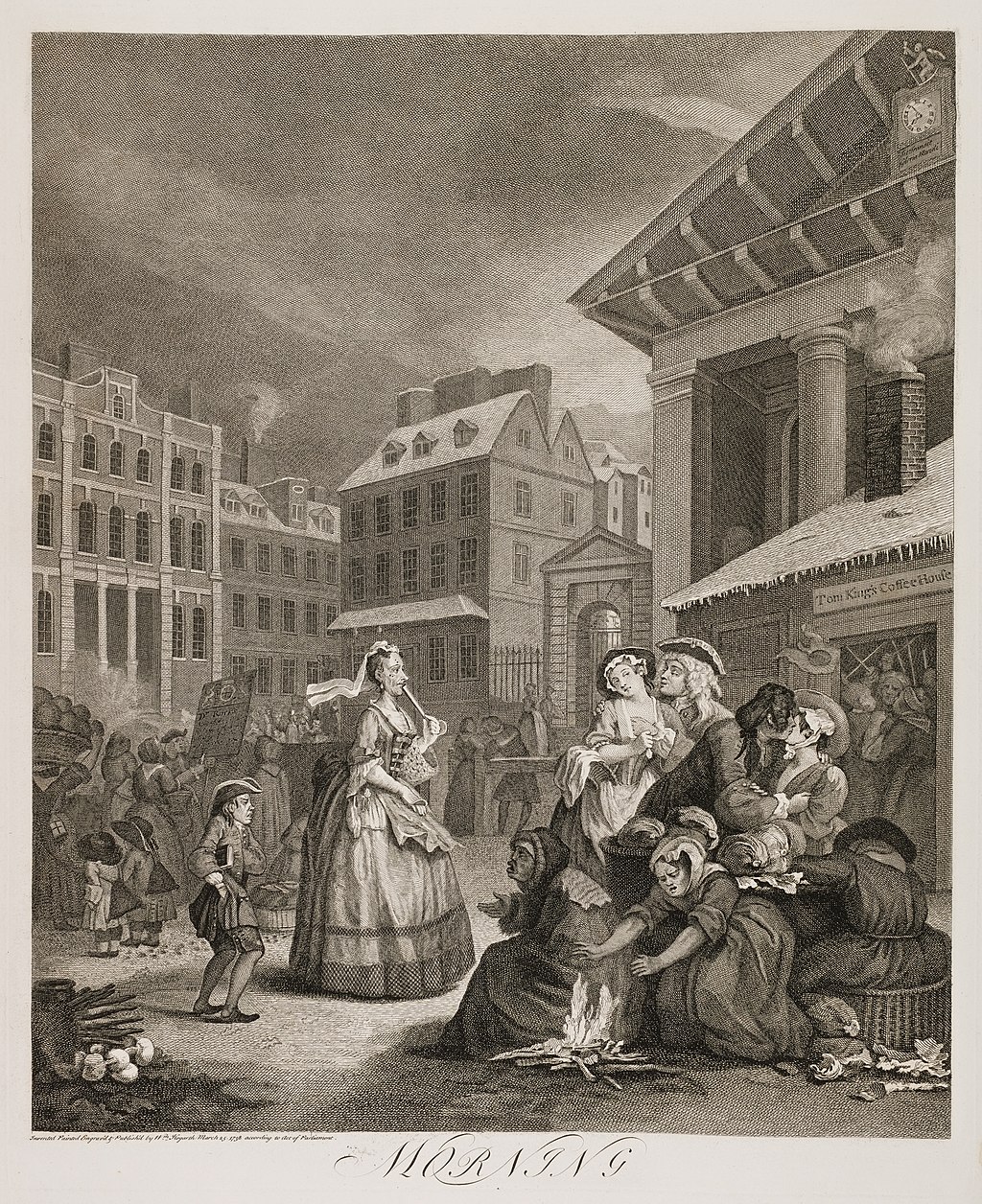 18th-century London by William Hogarth Casanova traveled to England in 1763, hoping to sell his idea of a state lottery to English officials. He wrote of the English, "the people have a special character, common to the whole nation, which makes them think they are superior to everyone else. It is a belief shared by all nations, each thinking itself the best. And they are all right."[73] Through his connections, he worked his way up to an audience with King George III, using most of the valuables he had stolen from the Marquise d'Urfé. While working the political angles, he also spent much time in the bedroom, as was his habit. As a means to find females for his pleasure, not being able to speak English, he put an advertisement in the newspaper to let an apartment to the "right" person. He interviewed many young women, choosing one "Mistress Pauline" who suited him well. Soon, he established himself in her apartment and seduced her. These and other liaisons, however, left him weak with venereal disease and he left England impoverished and ill.[74] He went on to the Austrian Netherlands, recovered, and then for the next three years, traveled all over Europe, covering about 4,500 miles (7,200 km) by coach over rough roads, and going as far as Moscow and Saint Petersburg (the average daily coach trip being about 30 miles (48 km)). Again, his principal goal was to sell his lottery scheme to other governments and repeat the great success he had with the French government, but a meeting with Frederick the Great bore no fruit and in the surrounding German lands, the same result. Lacking neither connections nor confidence, Casanova went to Russia and met with Catherine the Great, but she flatly turned down the lottery idea.[75] In 1766, he was expelled from Warsaw following a pistol duel with Colonel Franciszek Ksawery Branicki over an Italian actress, a lady friend of theirs. Both duelists were wounded, Casanova on the left hand. The hand recovered on its own, after Casanova refused the recommendation of doctors that it be amputated.[76] From Warsaw, he traveled to Breslau in the Kingdom of Prussia, then to Dresden, where he contracted yet another venereal infection.[77][78][79] He returned to Paris for several months in 1767 and hit the gambling salons, only to be expelled from France by order of Louis XV himself, primarily for Casanova's scam involving the Marquise d'Urfé.[80] Now known across Europe for his reckless behavior, Casanova would have difficulty overcoming his notoriety and gaining any fortune, so he headed for Spain, where he was not as notorious. He tried his usual approach, leaning on well-placed contacts (often Freemasons), wining and dining with nobles of influence, and finally arranging an audience with the local monarch, in this case Charles III. When no doors opened for him, however, he could only roam across Spain, with little to show for it. In Barcelona, he escaped assassination and landed in jail for 6 weeks. His Spanish adventure a failure, he returned to France briefly, then to Italy.[81] Return to Venice In Rome, Casanova had to prepare a way for his return to Venice. While waiting for supporters[82] to gain him legal entry into Venice, Casanova began his modern Tuscan-Italian translation of the Iliad, his History of the Troubles in Poland, and a comic play. To ingratiate himself with the Venetian authorities, Casanova did some commercial spying for them. After months without a recall, however, he wrote a letter of appeal directly to the Inquisitors. At last, he received his long-sought permission and burst into tears upon reading "We, Inquisitors of State, for reasons known to us, give Giacomo Casanova a free safe-conduct ... empowering him to come, go, stop, and return, hold communication wheresoever he pleases without let or hindrance. So is our will." Casanova was permitted to return to Venice in September 1774 after 18 years of exile.[83] At first, his return to Venice was a cordial one and he was a celebrity. Even the Inquisitors wanted to hear how he had escaped from their prison. Of his three bachelor patrons, however, only Dandolo was still alive and Casanova was invited back to live with him. He received a small stipend from Dandolo and hoped to live from his writings, but that was not enough. He reluctantly became a correspondent again for Venice, paid by piece work, reporting on religion, morals, and commerce, most of it based on gossip and rumor he picked up from social contacts.[84] He was disappointed. No financial opportunities of interest came about and few doors opened for him in society as in the past. At age 49, the years of reckless living and the thousands of miles of travel had taken their toll. Casanova's smallpox scars, sunken cheeks, and hook nose became all the more noticeable. His easygoing manner was now more guarded. Prince Charles de Ligne, a friend (and uncle of his future employer), described him around 1784: He would be a good-looking man if he were not ugly; he is tall and built like Hercules, but of an African tint; eyes full of life and fire, but touchy, wary, rancorous—and this gives him a ferocious air. It is easier to put him in a rage than to make him gay. He laughs little, but makes others laugh. ... He has a manner of saying things which reminds me of Harlequin or Figaro, and which makes them sound witty. — Masters 1969, p. 257 Venice had changed for him. Casanova now had little money for gambling, few willing females worth pursuing, and few acquaintances to enliven his craven, impulsive tendencies. He heard of the death of his mother and, more paining, visited the deathbed of Bettina Gozzi, who had first introduced him to sex and who died in his arms.[85] His Iliad was published in three volumes, but to limited subscribers and yielding little money. He got into a published dispute with Voltaire over religion.[86] When he asked, "Suppose that you succeed in destroying superstition. With what will you replace it?" Voltaire shot back, "I like that. When I deliver humanity from a ferocious beast which devours it, can I be asked what I shall put in its place." From Casanova's point of view, if Voltaire had "been a proper philosopher, he would have kept silent on that subject ... the people need to live in ignorance for the general peace of the nation".[87] In 1779, Casanova found Francesca, an uneducated seamstress, who became his live-in lover and housekeeper, and who loved him devotedly.[88] Later that year, the Inquisitors put him on the payroll and sent him to investigate commerce between the papal states and Venice. Other publishing and theater ventures failed, primarily from lack of capital. In a downward spiral, Casanova was expelled again from Venice in 1783, after writing a vicious satire poking fun at Venetian nobility. In it, he made his only public statement[89] that Grimani was his true father.[90] Forced to resume his travels again, Casanova arrived in Paris, and in November 1783 met Benjamin Franklin while attending a presentation on aeronautics and the future of balloon transport.[91] For a while, Casanova served as secretary and pamphleteer to Sebastian Foscarini, Venetian ambassador in Vienna. He also became acquainted with Lorenzo Da Ponte, Mozart's librettist, who noted about Casanova, "This singular man never liked to be in the wrong."[92] Notes by Casanova indicate that he may have made suggestions to Da Ponte concerning the libretto for Mozart's Don Giovanni.[93] Final years in Bohemia  Dux Castle In 1785, after Foscarini died, Casanova began searching for another position. A few months later, he became the librarian to Count Joseph Karl von Waldstein, a chamberlain of the emperor, in the Castle of Dux, Bohemia (now the Czech Republic). The count—himself a Freemason, cabalist, and frequent traveler—had taken to Casanova when they had met a year earlier at Foscarini's residence. Although the job offered security and good pay, Casanova describes his last years as boring and frustrating, though it was a productive time for him in writing.[94] His health had deteriorated dramatically, and he found life among peasants to be less than stimulating. He was only able to make occasional visits to Vienna and Dresden for relief. Although Casanova got on well with the count, his employer was a much younger man with his own eccentricities. The count often ignored him at meals and failed to introduce him to important visiting guests. Moreover, Casanova, the testy outsider, was thoroughly disliked by most of the other inhabitants of the Castle of Dux. Casanova's only friends seemed to be his fox terriers. In despair, Casanova considered suicide, but instead decided that he must live on to record his memoirs, which he did until his death.[95] 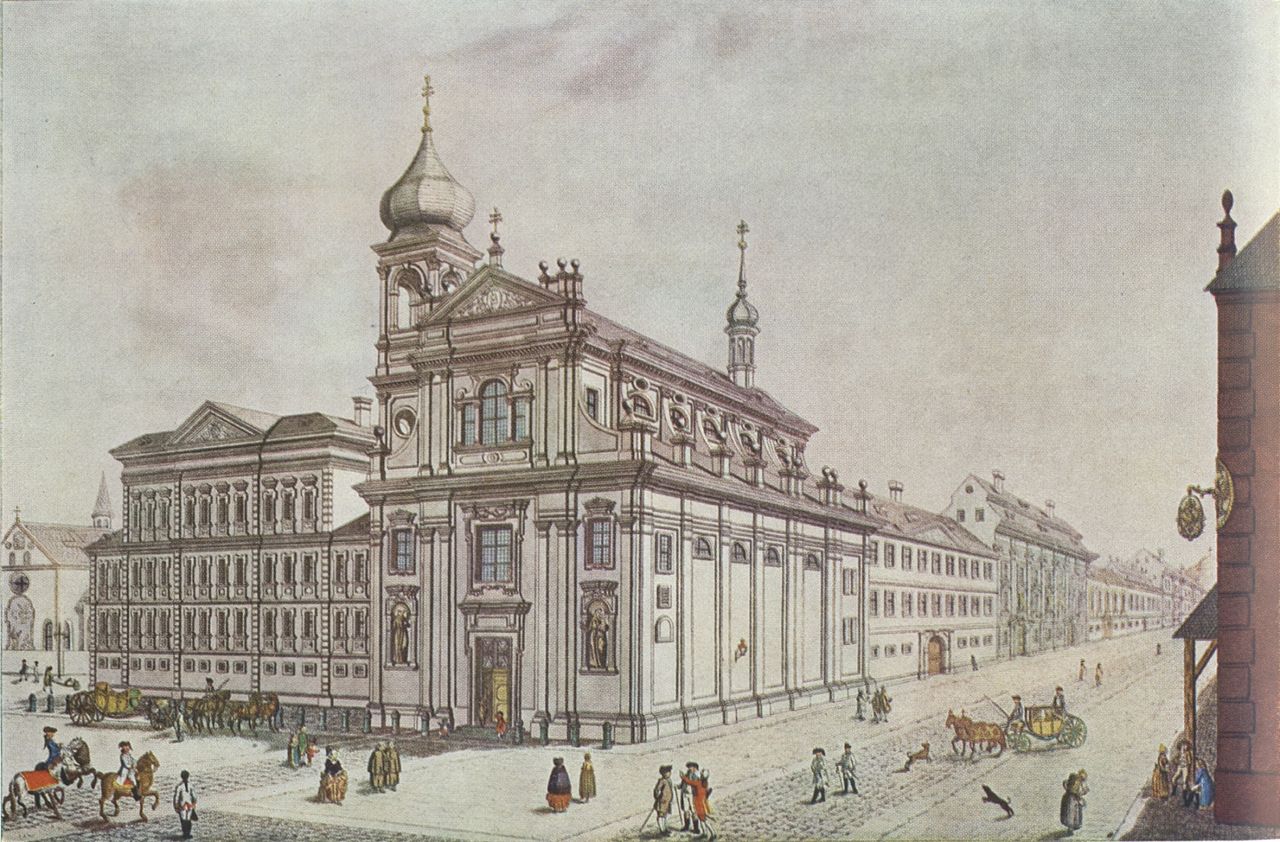 Prague in 1785 He visited Prague, the capital city and principal cultural center of Bohemia, on many occasions. In October 1787, he met Lorenzo da Ponte, the librettist of Wolfgang Amadeus Mozart's opera Don Giovanni, in Prague at the time of the opera's first production and likely met the composer, as well, at the same time. There is reason to believe that he was also in Prague in 1791 for the coronation of Holy Roman Emperor Leopold II as king of Bohemia, an event that included the first production of Mozart's opera La clemenza di Tito.[96] Casanova is known to have drafted dialogue suitable for a Don Juan drama at the time of his visit to Prague in 1787, but none of his verses were ever incorporated into Mozart's Don Giovanni.[97] In 1797, word arrived that the Republic of Venice had ceased to exist and that Napoleon Bonaparte had seized Casanova's home city. It was too late to return home. Casanova died on 4 June 1798 at the age of 73. His last words are said to have been "I have lived as a philosopher and I die as a Christian".[98] Casanova was buried at Dux (nowadays Duchcov in the Czech Republic), but the location of his grave has been forgotten. |
経歴[編集] 青年期[編集]  1730年代のヴェネツィア ジャコモ・ジロラモ・カサノヴァは1725年、俳優でダンサーのガエターノ・カサノヴァの妻で女優のザネッタ・ファルッシの子としてヴェネツィアに生まれ た。フランチェスコ・ジュゼッペ(1727-1803)、ジョヴァンニ・バッティスタ(1730-1795)、ファウスティーナ・マッダレーナ(1731 -1736)、マリア・マッダレーナ・アントニア・ステッラ(1732-1800)、ガエターノ・アルヴィーゼ(1734-1783)と続く。 カサノヴァが生まれた当時、ヴェニスはヨーロッパの享楽都市として繁栄しており、政治的・宗教的保守派が支配し、社会的悪徳を容認し、観光を奨励していた [11]。有名なカーニバル、賭博場、美しい花魁たちは、強力な魅力だった。このような環境は、カサノヴァに多くの形成的な経験をもたらした[12]。  サン・サムエーレ - カサノヴァが幼少期に住んでいた町 カサノヴァの祖母マルツィア・バルディセーラは、母親が演劇でヨーロッパを回っている間、カサノヴァの面倒を見ていた。父親はカサノヴァが8歳の時に亡く なった。子供の頃、カサノヴァは鼻血に悩まされ、祖母は魔女に助けを求めた: 「ゴンドラを降りて小屋に入ると、老婆が黒猫を抱いて藁の上に座っており、周囲には5、6人の老婆がいた。カサノヴァにとって、両親に無視されたことは苦 い思い出だった。「だから彼らは私を追い出した」と彼は宣言した[15]。 寄宿舎の環境はひどいものであったため、カサノヴァはゴッツィ大修道院長のもとで学ぶことを願い出た。ゴッツィ大修道院長は、カサノヴァにヴァイオリンだ けでなく学問も教えてくれた。カサノヴァはゴッツィ修道院長とその家族のもとに身を寄せ、10代のほとんどをそこで過ごした[16]。ゴッツィ家でカサノ ヴァが初めて異性と接触したのは、11歳のときにゴッツィ修道院長の妹のベッティーナがカサノヴァをもてあそんだときだった。 ベッティーナは「かわいくて、気さくで、ロマンスをよく読む子だった。... なぜかはわからなかったが、その少女はすぐに私を喜ばせた。その後、彼女は結婚したが、カサノヴァはベッティーナとゴッツィ家に生涯愛着を持ち続けた [18]。 カサノヴァは早くから機知に富み、知識欲が旺盛で、常に探究心を持っていた。12歳でパドヴァ大学に入学し、1742年に法学を専攻して17歳で卒業した (「私は克服できない嫌悪を感じていた」)[19]。保護者の希望は、彼が教会の弁護士になることだった[16]。(大学に在学中、カサノヴァはギャンブ ルを始め、すぐに借金を抱え、祖母によってヴェネツィアに呼び戻されたが、ギャンブルの習慣は定着した。  カサノヴァが洗礼を受けたサン・サムエーレ教会とマリピエロ宮殿(1716年頃 ヴェネツィアに戻ったカサノヴァは、聖職者としての法律家としてのキャリアをスタートさせ、ヴェネツィア総主教から小修道会を授与され、修道院長として認 められた。大学での勉強を続けるため、パドヴァを往復した。その頃、彼は背が高く、色黒で、長い髪をパウダーで固め、香りをつけ、手の込んだ巻き髪をし た、ダンディな男になっていた。 [23]マリピエーロは一流のサークルを渡り歩き、若いカサノヴァに美味しい料理やワイン、社交界での振る舞い方について多くのことを教えた。しかし、カ サノヴァは、マリピエロの誘惑の対象であった女優のテレサ・イメルと遊んでいるところを見つかり、元老院議員はふたりを家から追い出した[18]。カサノ ヴァは、女性に対する好奇心を募らせ、グリマーニ家の遠い親戚であった当時14歳と16歳のナネッタとマルトン・サヴォルニャンというふたりの姉妹と、初 めて完全な性的経験をすることになる。カサノヴァは、この出会いによって、自分の生涯の職業が確固たるものになったと公言している[24]。 イタリアと海外における初期のキャリア[編集]。 スキャンダルはカサノヴァの短い教会でのキャリアを汚した。祖母の死後、カサノヴァはしばらくの間神学校に入ったが、すぐに借金のために初めて刑務所に入 れられた。母親がベルナルド・デ・ベルナルディス司教のもとで職を得ようと試みたが、司教のカラブリア司教区でのごく短い試練の後、カサノヴァはこれを拒 否した[25]。代わりに、ローマの有力者アッカヴィーヴァ枢機卿のもとで書記として働くことになった。ローマ教皇ベネディクト14世に会うと、カサノ ヴァは大胆にも「禁書」を読むことと、魚(カサノヴァは目に炎症が起きると主張)を食べることの免除を求めた。また、別の枢機卿のためにラブレターを書い た。カサノヴァが地元の恋人同士のスキャンダルのスケープゴートになったとき、アッカヴィーヴァ枢機卿はカサノヴァを解任し、彼の犠牲に感謝したが、彼の 教会でのキャリアは事実上終わった[26]。 新たな職業を求め、カサノヴァはヴェネツィア共和国の軍人になることを命じられた。カサノヴァは、新しい職業を求め、ヴェネチア共和国の軍人になることを 依頼された: 教会でのキャリアで幸運を得る可能性はほとんどないと考え、兵士の格好をすることにした。良い仕立て屋を探すと......火星の従者になりすますのに必 要なものをすべて持ってきてくれた。... 私の軍服は白で、青いベスト、銀と金の肩の結び目があった・・・。私は長剣を買い、ハンサムな杖を手に、黒いコケードのついた刈り上げの帽子をかぶり、髪 を横ひげに切り、長いつけ髪をして、街中の人々に感銘を与えるために出発した。 -Casanova (2006), p. 223. 18世紀のコンスタンティノープル コルフ島でヴェネツィア連隊に入隊したカサノヴァは、表向きはかつての主人であった枢機卿からの手紙を届けるためにコンスタンティノープルに短期間滞在し た。カサノヴァはすぐに軍でのキャリアを捨て、ヴェネツィアに戻った。 21歳の時、プロのギャンブラーになることを目指したが、コミッションの売却で残った金をすべて失い、昔の恩人アルヴィーゼ・グリマーニに仕事を依頼し た。こうしてカサノヴァは、サン・サムエーレ劇場のヴァイオリニストとして、3度目のキャリアをスタートさせた。「卓越した者は賞賛され、凡庸な者は当然 軽蔑される、崇高な芸術の下働きである。... 私の職業は崇高なものではなかったが、気にしなかった。彼と彼の仲間の何人かは、「しばしば夜な夜な街のさまざまな地区を歩き回り、最もスキャンダラスな 悪ふざけを考え、実行に移した。彼らはまた、助産婦や医師を虚偽の呼び出しに送り込んだ[29]。 カサノヴァが音楽家としての自分の地位に不満を抱いていたとき、幸運が訪れた。結婚式の舞踏会の後、カサノヴァとゴンドラに乗っていたときに脳卒中で倒れ たブラガディン家のヴェネツィア貴族を救ったのだ。彼らはすぐに停車し、元老院議員に血を流してもらった。その後、元老院議員の宮殿で、医師が再び元老院 議員の血を抜き、水銀の軟膏-当時は万能薬であったが有毒であった[30]-を元老院議員の胸に塗った。これにより体温が上昇し、高熱が誘発され、ブラガ ディンは腫れた気管で窒息しているように見えた。死が近づいているように見えたため、司祭が呼ばれた。しかし、主治医の抗議にもかかわらず、カサノヴァは 軟膏を取り除き、冷たい水で議員の胸を洗うよう命じた。カサノヴァは、その若さと、医学的な知識を簡単に語ることから、元老院議員や彼の独身時代の友人2 人は、カサノヴァが年齢以上に賢く、オカルト的な知識を持っているに違いないと考えた[31]。自分たちも陰謀論者であったため、議員はカサノヴァを家庭 に招き入れ、生涯のパトロンとなった[32]。 カサノヴァは回想録の中でこう述べている: 私は最も信用でき、最も高貴で、唯一自然な道を選んだ。そして、その必需品が私にとってどのようなものであるかは、私以上に判断できる者はいな い......。ヴェニスの誰も、私と三人の男たちの間に、どうして親密な関係が存在しうるのか理解できなかった。 - カサノヴァ (2006), p. 247. その後3年間、元老院議員の庇護のもとで、名目上は法律家の助手として働きながら、カサノヴァは貴族の生活を送り、華美な服装をし、当然のようにギャンブ ルと情事に明け暮れた[33]。彼の庇護者は非常に寛容であったが、カサノヴァに、いつか代償を払う日が来ると警告した。しかし、それから間もなく、カサ ノヴァはさらなるスキャンダルのためにヴェネツィアを去らざるを得なくなった。カサノヴァは、敵に悪ふざけをして復讐するために埋められたばかりの死体を 掘り起こしたが、被害者は麻痺状態に陥り、回復することはなかった。別のスキャンダルでは、カサノヴァを騙した若い娘[要出典]がカサノヴァを強姦罪で告 発し、官憲に訴えた[34]。後にカサノヴァは証拠不十分で無罪となったが、この時すでにカサノヴァはヴェネツィアから逃亡していた。  兄弟のフランチェスコが描いた絵 パルマに逃れたカサノヴァは、「アンリエット」と名づけたフランス人女性と3ヶ月間関係を持ったが、おそらく彼が経験した中で最も深い愛であった。彼の言 葉を借りれば、「女が男を24時間同じように幸せにすることができないと信じる者は、アンリエットを知らないのだ」。私の魂に溢れる喜びは、夜彼女を腕に 抱いたときよりも、昼間に彼女と会話をしたときのほうがはるかに大きかった。多くの本を読み、天性のセンスを持っていたアンリエットは、すべてのことを正 しく判断していた」[35]。著名なカサノヴァ研究家J.リヴス・チャイルズはこう書いている: アンリエットほどカサノヴァを虜にした女性はいないだろう。彼女は二人の関係の初期に彼の外面的な殻を突き破り、彼と運命を一体にしようとする誘惑に抵抗 した。彼女は、彼の気まぐれな性格、社会的素養のなさ、経済的な不安定さを見抜くようになった。彼女は別れる前に、彼のポケットに500ルイを忍ばせた。 -Childs 1988, p. 46. 大旅行[編集] 落胆し、意気消沈したカサノヴァはヴェネツィアに戻り、ギャンブルに興じた後、立ち直り、大旅行に出発し、1750年にパリに到着した[36]。カサノ ヴァはまた薔薇十字主義にも惹かれていた[38]。リヨンでカサノヴァは仲間となり、最終的にスコティッシュ・ライトのマスター・メイソンの最高位を取得 した[39][40][8]。 リヨンでのスコティッシュ・ライト・フリーメイソンへの入門について、『回想録』は次のように述べている: ロシュバロン師の家で知り合った立派な人が、フリーメーソンの崇高な瑣末な儀式に入門させてくれるよう、私のために便宜を図ってくれたのはリヨンでのこと だった。パリに到着して数カ月後、私は仲間になり、マスターになった。最後の学位はフリーメーソンにおける最高の学位であることは間違いない。その後、私 が受けた他の学位はすべて、象徴的ではあってもマスターの威厳には何の足しにもならない、喜ばしい発明品にすぎない。 - ジャック[ジョヴァンニ・ジャコモ]・カサノヴァ・デ・セインガルト1725-1798年回想録。パリと牢獄へ、第2巻A--パリ[39][41]。 カサノヴァはパリに2年間滞在し、言葉を学び、劇場で多くの時間を過ごし、著名人に自己紹介した。しかし間もなく、彼が訪れたほとんどすべての都市でそう であったように、彼の数々の情事はパリの警察に指摘されるようになった[42]。 1752年、兄のフランチェスコと彼は、母と妹のマリア・マッダレーナが住んでいたドレスデンに移り住んだ。その後、プラハ、ウィーンを訪れたが、厳格な 道徳的雰囲気は彼の好みではなかった[43][44]。1753年、カサノヴァはついにヴェネツィアに戻った[45]。そこで逃亡を再開したカサノヴァ は、多くの敵を作り、ヴェネツィアの審問官の監視を受けるようになった。国家スパイのジョヴァンニ・マヌッチは、カサノヴァの陰謀論やフリーメーソンに関 する知識を引き出し、彼の蔵書に禁書がないか調べるために雇われた[46]。ブラガディン上院議員は、(自身も元審問官であったことから)今回は真剣な態 度で、「息子」に直ちに立ち去るか、最も厳しい結果に直面するよう忠告した。 投獄と逃亡[編集] 1755年7月26日、30歳であったカサノヴァは宗教と良識に対する冒涜の罪で逮捕された。 「48]"鉛牢 "とは、ドージェ宮殿の東翼の最上階にある7つの独房からなる牢獄のことで、身分の高い囚人や特定の種類の犯罪者(政治犯、脱獄した司祭や修道士、簒奪者 など)のために用意され、宮殿の屋根を覆っていた鉛の板にちなんで名付けられた。翌9月12日、裁判もなく、逮捕の理由も判決も知らされないまま、彼は5 年の禁固刑を言い渡された[47][49]。  「彼だ。彼を拘留しろ!」 彼は「独房のなかでも最悪」[50]の、衣服、パレットベッド、テーブル、肘掛け椅子を備えた一人部屋に入れられ、暗闇、夏の暑さ、「何百万匹ものノミ」 に大いに苦しめられた。その後、彼は何人かの同房者と一緒に収容された。5ヶ月後、ブラガディン伯爵から個人的な嘆願があり、暖かい冬の寝具と、本とより 良い食事のための月々の俸給が与えられた。牢獄のガレージを散歩したとき、彼は黒い大理石のかけらと鉄の棒を見つけ、それを肘掛け椅子の中に隠して独房に 持ち帰った。肘掛け椅子の中に鉄棒を隠した。一時的に独房の仲間がいなくなると、2週間かけて鉄棒を石の上でスパイク状に研いだ。そして、自分の独房が奉 行所の部屋の真上にあることを知りながら、ベッドの下の木の床をえぐり始めた[51]。下の部屋に役人がいないであろう祭りの時に脱獄しようと考えていた ちょうど3日前、カサノヴァは、今の場所に完全に満足しているという彼の抗議にもかかわらず、眺めの良い、より広くて明るい独房に移された。新しい独房で は、「私は茫然自失のように肘掛け椅子に座り、彫像のように動かず、自分がしてきたすべての努力を無駄にしたことを悟り、それを悔い改めることもできな かった。私には何も望みがないと感じ、私に残された唯一の救いは、将来のことを考えないことだった」[52]。 カサノヴァは別の逃亡計画を立てた。隣の監房にいた囚人、バルビ神父に助けを求めた。肘掛け椅子の中から新しい独房に運ばれたスパイクは、騙された看守に よってパスタの皿の下に運ばれたフォリオの聖書の中で神父に渡された。司祭は自分の天井に穴を開け、横切ってカサノヴァの独房の天井に穴を開けた。スパイ である新しい同房者を無力化するために、カサノヴァは彼の迷信を利用し、彼を脅して沈黙させた[53]。 バルビがカサノヴァの独房に侵入したとき、カサノヴァは天井を突き破り、詩篇117篇(ラテン語ヴルガータから)を引用したメモを残した: 「私は死なず、生きて、主の御業を告げ知らせる」[54]。  『私の逃亡物語』より スパイは、他の者と一緒に逃走しているのが見つかったらどうしようという恐怖に怯え、後に残った。カサノヴァとバルビは鉛板をこじ開け、霧が立ち込める ドージェ宮殿の傾斜した屋根の上に出た。近くの運河への落差が大きすぎたため、カサノヴァはドーマー窓の格子をこじ開け、窓を割って侵入した。屋根の上に 長いはしごを見つけ、カサノバが用意したベッドシーツの「ロープ」を使って、床から25フィート(7.6メートル)下の部屋に降りた。朝まで休み、服を着 替え、出口のドアの小さな錠を壊して宮殿の廊下に入り、ギャラリーや部屋を通り抜け、階段を降りた。やがてカサノヴァはパリに到着し、ロベール=フランソ ワ・ダミアンが ルイ15世の命を狙った同じ日(1757年1月5日)にパリに到着した[56](カサノヴァは後にダミアンの処刑を目撃し、その様子を描写することにな る)。 30年後の1787年、カサノヴァは『わが逃亡の物語』を書き、この物語は非常に人気があり、多くの言語で再版された: こうして神は、奇跡とまではいかなくても、不思議な脱出に必要なものを私に与えてくれた。しかし、私の誇りは、私が成功したことに由来するのではなく、運 も大いに関係していたからである。 -Casanova (2006), p. 502. パリに戻る[編集]。 カサノヴァはパリでの滞在が長期になることを知っており、それに従って行動した: 「何かを成し遂げるためには、自分の肉体的、道徳的能力をすべて発揮し、偉大な人々や権力者と知り合いになり、厳しい自制心を働かせ、カメレオンのように 振舞わなければならないと思った」[58]。 カサノヴァは成熟し、パリでのこの時期には、まだ機転と決断力に頼ることもあったが、より計算高く慎重になっていた。最初の仕事は新しいパトロンを見つけ ることだった。カサノヴァは、旧友のド・ベルニ(現在はフランス外相)と再会した。カサノヴァはパトロンから、即座に気に入られる方法として、国家のため に資金を集める手段を見つけるよう勧められた。カサノヴァはすぐに最初の宝くじの評議員の一人となり、その宝くじを売る最高のセールスマンの一人となった [59]。特にジャンヌ・ドルフェ侯爵夫人は、数秘術の魔術師のような優れた記憶力を持っているように見せかけた。カサノヴァの考えでは、「愚か者を欺く ことは、知的な男にふさわしい功績」であった[61]。  ポンパドゥール夫人、1750年頃 カサノヴァは薔薇十字団員であり、錬金術師であると主張していた。その適性から、ポンパドゥール夫人、サンジェルマン伯爵、ダランベール、ジャン=ジャッ ク・ルソーなど、当時の著名人に人気があった。貴族たちの間では錬金術、特に「賢者の石」を探すことが流行っていたため、カサノヴァはその知識を買われ、 大金を手にした[62]: 「この奇妙な男は、あらゆる詐欺師の中で最も素知らぬ顔をして生まれ、自分は300歳であること、万能薬を持っていること、自然から好きなものを何でも作 ること、ダイヤモンドを創造することを、平然と宣言した」[63]。 デ・ベルニスは、カサノヴァを最初のスパイ任務でダンケルクに派遣することを決めた。カサノヴァは、その迅速な仕事に対して高い報酬を得たが、この経験 は、アンシャン・レジームと彼が依存していた階級に対する彼の数少ない発言のひとつを促した。フランスの大臣はみな同じだ。彼らは、自分たちの生物を豊か にするために、他の人々のポケットから出た金を惜しみなく使った。革命が必要だった」[64]。  18世紀のパリ 七年戦争が始まると、カサノヴァは国庫を増やすために再び召集された[65]。彼は、当時ヨーロッパの金融の中心地であったアムステルダムで 国債を売る使命を負わされた[66]。彼はわずか8%の割引で国債を売ることに成功し、翌年にはその収入で絹織物工場を設立するほど裕福になった。フラン ス政府は、カサノヴァがフランス国籍を取得し、大蔵省のために働くのであれば、爵位と年金を与えるとまで言ったが、カサノヴァはそれを断った。彼は事業を うまく運営できず、それを救おうとして多額の借金をし、彼の「ハーレム」であった女工たちとの絶え間ない情事に富の多くを費やした[68]。 借金のために、カサノヴァは再びフォル=レヴェックに投獄されたが、その4日後にウルフェ侯爵夫人の強い要請で釈放された。残念なことに、釈放されたもの の、パトロンのド・ベルニがルイ15世によって解任されたため、カサノヴァの敵はカサノヴァに迫った。カサノヴァは残りの持ち物を売り払い、オランダへの 再度の使節団を確保し、トラブルから距離を置いた[68]。 逃亡[編集]。 1760年の春、彼は残りの財産を失い、ケルン、そしてシュトゥットガルトへと逃亡した。借金のために再び逮捕されたが、なんとかスイスに逃れた。放蕩生 活に疲れたカサノヴァは、アインジーデルンの修道院を訪れ、修道士の質素で学究的な生活を考えた。その後、アルブレヒト・フォン・ハラーと ヴォルテールのもとを訪れ、マルセイユ、ジェノヴァ、フィレンツェ、ローマ、ナポリ、モデナ、トリノと移り住み、次から次へと性的に奔放になった [70]。 1760年、カサノヴァは自らをシュヴァリエ・ド・セインガルトと名乗り始めた。ローマ教皇クレメンス13世がカサノヴァに教皇庁から 金棘 勲章を授与した際には、カサノヴァの胸には印象的な十字架とリボンが飾られた[71]。 パリに戻ったカサノヴァは、最も非道な計画のひとつに着手し、古くからのカモであったウルフェ侯爵夫人に、オカルト的な方法で彼女を青年に変身させること ができると説得した。この計画は、カサノヴァが期待していたような大きな報酬を得ることはできず、ウルフェ侯爵夫人はついにカサノヴァへの信頼を失った [72]。  ウィリアム・ホガースによる18世紀のロンドン カサノヴァは1763年にイギリスを訪れ、イギリス政府高官に宝くじのアイデアを売り込もうとした。彼はイギリス人について、「国民には、国民全体に共通 する特別な性格があり、それが自分たちを他の誰よりも優れていると思わせている。それはすべての国に共通する信念であり、それぞれが自分を最高だと考えて いる。そして、彼らはみな正しいのだ」[73]。彼は人脈を通じて、ダルフェ侯爵夫人から盗んだ貴重品のほとんどを使い、国王ジョージ3世に謁見するまで に上り詰めた。政界に進出する一方で、彼は習慣のように多くの時間を寝室で過ごした。英語も話せない彼は、自分の快楽のために女性を見つける手段として、 新聞に「適切な」人にアパートを貸すという広告を出した。多くの若い女性と面接し、その中から自分にぴったりの「ポーリン嬢」を選んだ。すぐに彼女のア パートに身を寄せ、彼女を誘惑した。しかし、こうした関係や他の関係によって、彼は性病に冒され、貧窮と病気でイギリスを去った[74]。 彼はオーストリアのオランダに行き、回復し、それから3年間、ヨーロッパ中を旅し、悪路を馬車で約4500マイル(7200km)走り、モスクワや サンクトペテルブルクまで行った(1日の平均的な馬車の旅は約30マイル(48km))。ここでも彼の主な目的は、自分の宝くじ計画を他の政府に売り込 み、フランス政府との大成功を繰り返すことだったが、フリードリヒ大王との会談は実を結ばず、周辺のドイツの土地でも同じ結果となった。コネも自信もな かったカサノヴァはロシアに行き、エカテリーナ大帝に会ったが、彼女は宝くじ計画をきっぱりと断った[75]。 1766年、友人のイタリア人女優をめぐってフランシシェク・クサヴェリー・ブラニツキ大佐とピストルで決闘し、ワルシャワから追放された。二人とも負傷 し、カサノヴァは左手を負傷した。ワルシャワからプロイセン王国のブレスラウに行き、ドレスデンに行ったが、そこでまた性病に感染した[77][78] [79]。 [77][78][79]1767年に数ヶ月間パリに戻り、ギャンブルサロンに通ったが、ルイ15世の命によりフランスから追放される。カサノヴァは、よ く知られた人脈(しばしばフリーメーソン)を頼り、影響力のある貴族たちと歓談し、最終的には現地の君主(この場合はシャルル3世)に謁見するという、い つも通りのアプローチを試みた。しかし、何の扉も開かれなかったとき、彼はスペイン全土を放浪することしかできなかった。バルセロナでは暗殺を免れ、6週 間牢獄に入れられた。スペインでの冒険は失敗に終わり、彼はフランスに一時帰国し、その後イタリアに戻った[81]。 ヴェネツィアに戻る[編集]。 ローマでは、カサノヴァはヴェネツィアに戻るための準備をしなければならなかった。ヴェネチアに合法的に入国するための支援者[82]を待つ間、カサノ ヴァは『イーリアス』のトスカーナ・イタリア語現代語訳、『ポーランド騒乱史』、喜劇に着手した。ヴェネツィア当局に気に入られるために、カサノヴァは当 局のために商業的なスパイ活動を行った。しかし、何ヶ月経っても罷免されなかったため、カサノヴァは奉行所に直訴状を書いた。ついに念願の許可を得たカサ ノヴァは、「われわれ国家奉行団は、われわれの知るところである理由により、ジャコモ・カサノヴァに自由な安全航行を与える......彼が望むところで あれば、どこへでも自由に行き来し、立ち止まったり、戻ったり、連絡を取り合ったりすることを許可する。それが我々の意志だ カサノヴァは18年間の亡命生活を経て、1774年9月にヴェネツィアに戻ることを許された[83]。 当初、カサノヴァのヴェネツィアへの帰還は友好的なものであり、カサノヴァは有名人であった。異端審問官たちでさえ、彼がいかにして牢獄から脱出したかを 聞きたがった。しかし、3人の独身パトロンのうち、ダンドロだけはまだ生きており、カサノヴァは彼の家に招かれた。カサノヴァはダンドロからわずかな俸給 を受け取り、自分の著作で生活することを望んだが、それだけでは足りなかった。カサノヴァはしぶしぶヴェネツィアの特派員となり、出来高払いで、宗教、風 俗、商業について報道した。経済的なチャンスは訪れず、かつてのように社交界で彼に開かれた扉はほとんどなかった。 49歳のとき、無謀な生活と何千キロにも及ぶ旅の歳月が祟った。カサノヴァの天然痘の傷跡、こけた頬、鉤鼻がいっそう目立つようになった。カサノヴァの気 さくな物腰は、より慎重になっていた。1784年頃、友人であったシャルル・ド・リーニュ王子(後の雇い主の叔父)は、カサノヴァについてこう語ってい る: 背が高く、ヘラクレスのような体格だが、アフリカ人のような色合いをしている。目は生命力と炎に満ちているが、気難しく、警戒心が強く、怒りっぽい。彼を ゲイにするよりも、激怒させる方が簡単だ。彼はほとんど笑わないが、他人を笑わせる。... 彼はハーレクインや フィガロを思い出させるような物言いをする。 - マスターズ1969年、257ページ ベネチアはカサノヴァにとって様変わりしていた。カサノヴァにはギャンブルに使う金も、追いかける価値のある女性も、そして、彼の気まぐれで衝動的な性向 を活気づける知り合いもほとんどいなくなっていた。カサノヴァは母の死を知り、さらに心を痛めたのは、カサノヴァに初めてセックスを紹介し、カサノヴァの 腕の中で亡くなったベッティーナ・ゴッツィの死に際を見舞ったことだった[85] 。宗教をめぐってヴォルテールと論争を繰り広げた[86]。迷信を何で置き換えるのか?ヴォルテールはこう言い返した。人類を貪り食う猛獣から救い出した ら、その代わりに何を置くかと聞かれてもいい」。カサノヴァからすれば、もしヴォルテールが「まっとうな哲学者であったなら、その話題について沈黙を守っ ていただろう......国民は、国家の一般的な平和のために、無知のうちに生きる必要がある」[87]。 1779年、カサノヴァは無学なお針子フランチェスカを見つけ、住み込みの恋人兼家政婦となり、彼を献身的に愛した[88]。その年の暮れ、カサノヴァは 異端審問官から給与を受け、ローマ教皇庁とヴェネツィア間の通商を調査するために派遣された。他の出版や演劇の事業は、主に資本不足から失敗した。下降の 一途をたどるカサノヴァは、1783年、ヴェネツィア貴族を揶揄する悪質な風刺を書いた後、再びヴェネツィアから追放された。その中で彼は、グリマーニが 自分の本当の父親であると唯一公言した[89]。 再び旅を再開することを余儀なくされたカサノヴァはパリに到着し、1783年11月、航空学と気球輸送の将来についてのプレゼンテーションに出席した際に ベンジャミン・フランクリンと知り合った[91]。しばらくの間、カサノヴァは在ウィーン・ヴェネツィア大使セバスチャン・フォスカリーニの秘書兼パンフ レット作成者を務めた。また、カサノヴァはモーツァルトの台本作家ロレンツォ・ダ・ポンテとも知り合いになり、カサノヴァはダ・ポンテについて「この特異 な男は決して間違ったことを好まない」と述べている[92]。 ボヘミアでの晩年[編集]  ダックス城 1785年、フォスカリーニが亡くなった後、カサノヴァは別の職を探し始めた。数ヶ月後、ボヘミア(現在のチェコ共和国)のデュックス城で、皇帝の侍従で あったヨーゼフ・カール・フォン・ヴァルトシュタイン伯爵の司書となった。伯爵自身もフリーメーソンであり、陰謀論者であり、頻繁に旅行していた。1年前 にフォスカリーニの邸宅で出会ったとき、カサノヴァに好意を抱いていた。カサノヴァは、この仕事は安全で給料もよかったが、晩年は退屈でいらだたしかった と語っている[94]。時折、ウィーンやドレスデンを訪れて休養を取ることしかできなかった。カサノヴァは伯爵とうまくやっていたが、彼の雇い主はずっと 若い男で、彼自身風変わりなところがあった。伯爵はしばしばカサノヴァを食事の席で無視し、重要な来客にカサノヴァを紹介しなかった。さらに、カサノヴァ は癇癪持ちのアウトサイダーであったため、ダックス城の他の住人のほとんどから徹底的に嫌われていた。カサノヴァの唯一の友人はキツネザルのようだった。 絶望の淵に立たされたカサノヴァは自殺を考えたが、その代わりに自分の回想録を記録するために生き続けなければならないと決心し、死ぬまでそれを続けた [95]。  1785年のプラハ カサノヴァは、ボヘミアの首都であり文化の中心地であるプラハを何度も訪れた。1787年10月には、ヴォルフガング・アマデウス・モーツァルトのオペラ 『ドン・ジョヴァンニ』の台本作家ロレンツォ・ダ・ポンテとオペラの初演時にプラハで会い、同じ時期に作曲家とも会っていたと思われる。カサノヴァは 1787年にプラハを訪れた際、ドン・ファン劇に適した台詞を草稿していたことが知られているが、モーツァルトのオペラ『 ドン・ジョヴァンニ』に彼の詩が取り入れられることはなかった[97]。 1797年、ヴェネツィア共和国が消滅し、ナポレオン・ボナパルトがカサノヴァの故郷を占領したという知らせが届いた。帰国するには遅すぎた。カサノヴァ は1798年6月4日、73歳で亡くなった。カサノヴァの最後の言葉は「私は哲学者として生き、キリスト教徒として死ぬ」であったと言われている [98]。 |
| Memoirs Main article: Histoire de ma vie 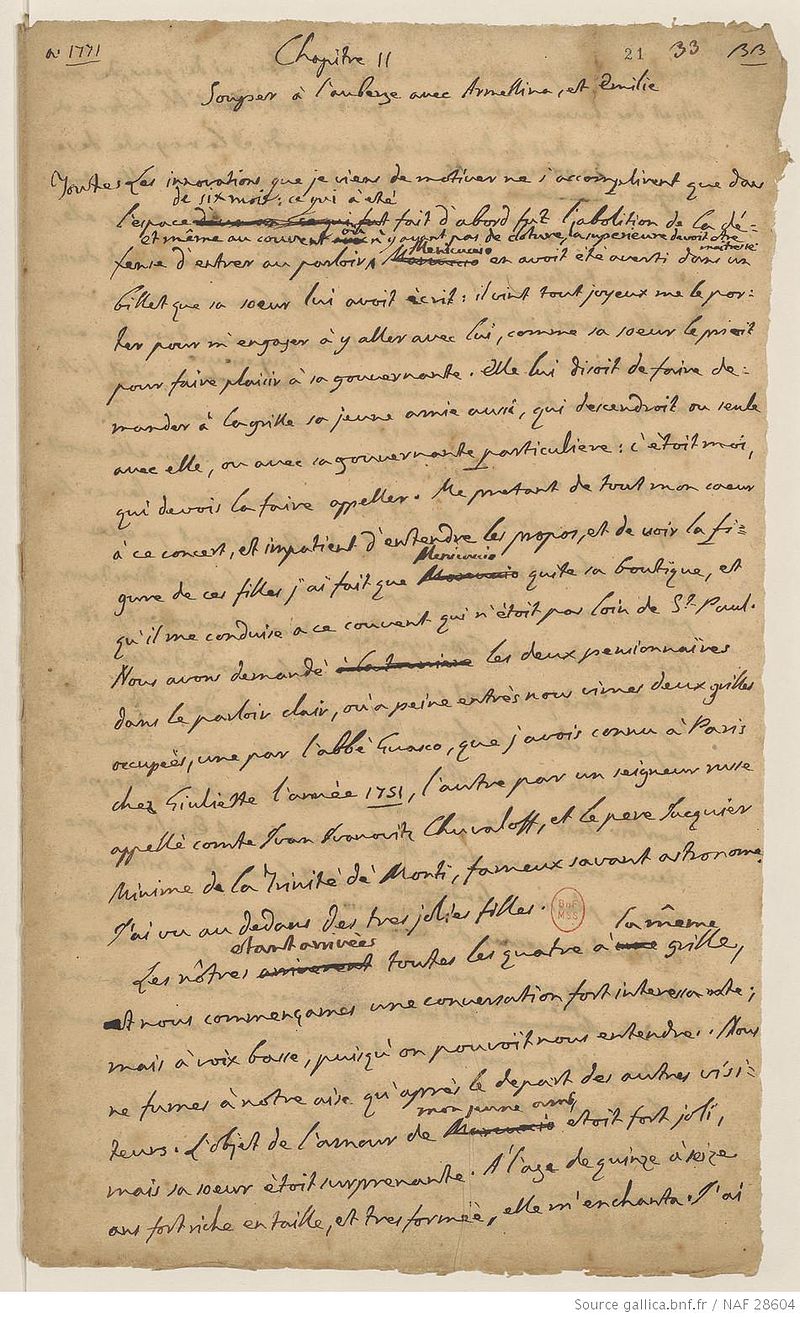 Page from the autograph manuscript of Histoire de ma vie The isolation and boredom of Casanova's last years enabled him to focus without distractions on his Histoire de ma vie, without which his memory would have been considerably diminished, if not blotted out entirely. He began to think about writing his memoirs around 1780 and began in earnest by 1789, as "the only remedy to keep from going mad or dying of grief".[99] The first draft was completed by July 1792, and he spent the next six years revising it. He puts a happy face on his days of loneliness, writing in his work, "I can find no pleasanter pastime than to converse with myself about my own affairs and to provide a most worthy subject for laughter to my well-bred audience."[100] His memoirs were still being compiled at the time of his death, his account having reached only the summer of 1774.[101] A letter by him in 1792 states that he was reconsidering his decision to publish them, believing that his story was despicable and he would make enemies by writing the truth about his affairs, but he decided to proceed, using initials instead of actual names and toning down the strongest passages.[102] He wrote in French instead of Italian because "the French language is more widely known than mine".[103] The memoirs open with: I begin by declaring to my reader that, by everything good or bad that I have done throughout my life, I am sure that I have earned merit or incurred guilt, and that hence I must consider myself a free agent. ... Despite an excellent moral foundation, the inevitable fruit of the divine principles which were rooted in my heart, I was all my life the victim of my senses; I have delighted in going astray and I have constantly lived in error, with no other consolation than that of knowing I have erred. ... My follies are the follies of youth. You will see that I laugh at them, and if you are kind you will laugh at them with me.[104] Casanova wrote about the purpose of his book: I expect the friendship, the esteem, and the gratitude of my readers. Their gratitude, if reading my memoirs will have given instruction and pleasure. Their esteem if, doing me justice, they will have found that I have more virtues than faults; and their friendship as soon as they come to find me deserving of it by the frankness and good faith with which I submit myself to their judgment without in any way disguising what I am.[105] He also advises his readers that they "will not find all my adventures. I have left out those which would have offended the people who played a part in them, for they would cut a sorry figure in them. Even so, there are those who will sometimes think me too indiscreet; I am sorry for it."[106] In the final chapter, the text abruptly breaks off with hints at adventures unrecorded: "Three years later I saw her in Padua, where I resumed my acquaintance with her daughter on far more tender terms."[107] In their original publication, the memoirs were divided into twelve volumes, and the unabridged English translation by Willard R. Trask runs to more than 3,500 pages. Though his chronology is at times confusing and inaccurate, and many of his tales exaggerated, much of his narrative and many details are corroborated by contemporary writings.[108] He has a good ear for dialogue and writes at length about all classes of society.[109] Casanova, for the most part, is candid about his faults, intentions, and motivations, and shares his successes and failures with good humor.[110] The confession is largely devoid of repentance or remorse. He celebrates the senses with his readers, especially regarding music, food, and women. "I have always liked highly seasoned food. ... As for women, I have always found that the one I was in love with smelled good, and the more copious her sweat the sweeter I found it."[111] He mentions over 120 sexual/romantic escapades with women and girls, with several veiled references to male lovers as well.[112][113] He describes his duels and conflicts with scoundrels and officials, his entrapments and his escapes, his schemes and plots, his anguish and his sighs of pleasure. He demonstrates convincingly, "I can say vixi ('I have lived')."[100] The manuscript of Casanova's memoirs was held by his relatives until it was sold to F. A. Brockhaus publishers, and first published in heavily abridged versions in German around 1822, then in French. During World War II, the manuscript survived the Allied bombing of Leipzig. The memoirs were heavily pirated through the ages and have been translated into some twenty languages. Not until 1960 was the entire text published in its original language of French.[114] In 2010 the manuscript was acquired by the National Library of France, which has started digitizing it.[115] |
回想録[編集] 主な記事 生い立ち  Histoire de ma vie』の自筆原稿のページ カサノヴァの晩年は孤独で退屈であったため、気が散ることなく回想録に集中することができた。カサノヴァは1780年頃から回想録を書こうと考え始め、 1789年には本格的に書き始めた。彼は孤独な日々を幸せな顔で過ごし、「自分自身のことについて自分自身と会話し、育ちの良い聴衆に笑いの最も価値ある 題材を提供することほど楽しい娯楽はない」[100]と作品に書いている。 [101]1792年の手紙によると、彼は自分の話は卑劣であり、自分の身の上について真実を書くことで敵を作ることになると考え、出版することを考え直 したが、実名の代わりにイニシャルを使い、強い箇所はトーンダウンして出版することを決めた[102]。 回想録はこう始まる: 私は読者に対して、私が生涯を通じて行ったすべての善悪によって、私は功労を得たか罪を負ったかを確信していること、それゆえ私は自分自身を自由意志の持 ち主と考えなければならないことを宣言することから始める。... 私の心に根を下ろした神の原理の必然的な果実である優れた道徳的基盤にもかかわらず、私は生涯、自分の感覚の犠牲者であった。私は道を踏み外すことを喜び とし、常に誤りの中で生きてきた。... 私の愚かさは若さゆえの愚かさだ。もしあなたが親切なら、私と一緒に笑ってくれるだろう[104]。 カサノヴァは自分の本の目的についてこう書いている: 私は読者の友情、尊敬、感謝を期待している。もし私の手記を読むことで、読者に教訓と喜びを与えることができれば、読者からの感謝の念を抱くだろう。そし て、読者が、私が自分のありのままの姿を隠すことなく読者の判断に従う率直さと誠実さによって、私がそれに値する人間であることを知るようになれば、すぐ に彼らの友情が得られるだろう[105]。 彼はまた、読者に「私の冒険のすべてを見つけることはできないだろう。私は、それに参加した人々の気分を害するようなものは省いてきた。それにしても、私 のことを軽率すぎると思う人もいるだろう。 オリジナルの出版では、回想録は12巻に分かれており、ウィラード・R・トラスクによる要約なしの英訳は3,500ページ以上に及ぶ。カサノヴァは、ほと んどの場合、自分の欠点、意図、動機について率直に語り、自分の成功と失敗をユーモアたっぷりに語っている[110]。彼は読者とともに感覚を謳歌し、特 に音楽、食べ物、女性について語る。「私はいつも味付けの濃い料理が好きだった。女性については、私が恋している女性はいつもいい香りがし、彼女の汗が多 ければ多いほど、私はそれを甘いと感じていた」[111]。彼は女性や少女との120以上の性的/恋愛的逃避行について言及し、男性の恋人についても何度 かベールに包まれた言及をしている。彼は「私はヴィクシ(『私は生きてきた』)と言うことができる」と説得力をもって証明している[100]。 カサノヴァの回想録の原稿は、F.A.ブロックハウス出版社に売却されるまで、彼の親族によって保管されていた。第二次世界大戦中、手記は連合軍のライプ ツィヒ爆撃を生き延びた。回顧録は時代を超えて海賊版が出回り、20カ国語に翻訳された。1960年まで、全文が原語であるフランス語で出版されることは なかった[114]。2010年、手記はフランス国立図書館に収蔵され、デジタル化が開始された[115]。 |
| Relationships For Casanova, as well as his local contemporaries of the upper class, love and sex tended to be casual and not endowed with the solemnity characteristic of other Romantic literary works of the 19th century.[116] Flirtations, bedroom games, and short-term liaisons were common among nobles who married for social connections rather than love. 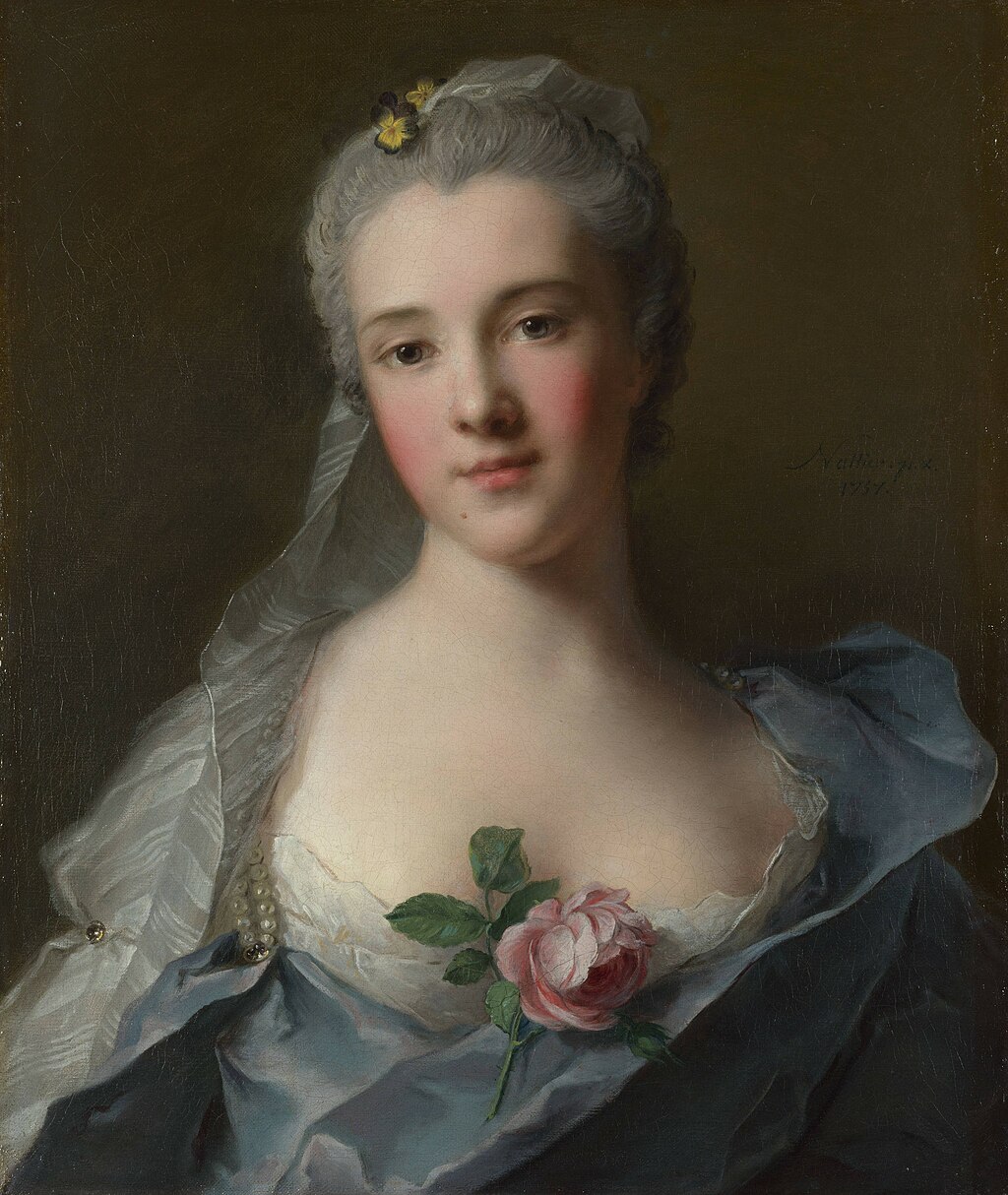 Portrait of Manon Balletti by Jean-Marc Nattier (1757) Multi-faceted and complex, Casanova's personality, as he described it, was dominated by his sensual urges: "Cultivating whatever gave pleasure to my senses was always the chief business of my life; I never found any occupation more important. Feeling that I was born for the sex opposite of mine, I have always loved it and done all that I could to make myself loved by it."[111] He noted that he sometimes used "assurance caps" to prevent impregnating his mistresses.[117] Casanova's ideal liaison had elements beyond sex, including complicated plots, heroes and villains, and gallant outcomes. In a pattern he often repeated, he would discover an attractive woman in trouble with a brutish or jealous lover (Act I); he would ameliorate her difficulty (Act II); she would show her gratitude; he would seduce her; a short exciting affair would ensue (Act III); feeling a loss of ardor or boredom setting in, he would plead his unworthiness and arrange for her marriage or pairing with a worthy man, then exit the scene (Act IV).[118] As William Bolitho points out in Twelve Against the Gods, the secret of Casanova's success with women "had nothing more esoteric in it than [offering] what every woman who respects herself must demand: all that he had, all that he was, with (to set off the lack of legality) the dazzling attraction of the lump sum over what is more regularly doled out in a lifetime of installments."[119] Casanova proclaims, "There is no honest woman with an uncorrupted heart whom a man is not sure of conquering by dint of gratitude. It is one of the surest and shortest means."[120] Alcohol and violence, for him, were not proper tools of seduction.[121] Instead, attentiveness and small favors should be employed to soften a woman's heart, but "a man who makes known his love by words is a fool". Verbal communication is essential—"without speech, the pleasure of love is diminished by at least two-thirds"—but words of love must be implied, not boldly proclaimed.[120] Casanova claimed to value intelligence in a woman: "After all, a beautiful woman without a mind of her own leaves her lover with no resource after he had physically enjoyed her charms." His attitude towards educated women, however, was an unfavorable one: "In a woman learning is out of place; it compromises the essential qualities of her sex ... no scientific discoveries have been made by women ... (which) requires a vigor which the female sex cannot have. But in simple reasoning and in delicacy of feeling we must yield to women."[35] Casanova's actions can be considered by many in modern times to be predatory, despite his own claims to the contrary ("my guiding principle has been never to direct my attack against novices or those whose prejudices were likely to prove an obstacle"), especially since he frequently targeted young, insecure or emotionally exposed women.[122] |
人間関係[編集] カサノヴァや同時代の上流階級の人々にとって、恋愛やセックスは気軽なものであり、19世紀の他のロマン主義文学作品に見られるような厳粛さはなかった [116]。  ジャン=マルク・ナティエによる マノン・バレッティの肖像画(1757年) 多面的で複雑なカサノヴァの性格は、彼が言うように、官能的な衝動に支配されていた: 「自分の感覚に喜びを与えるものを育てることが、常に私の人生の主要な仕事であった。私は自分とは反対の性のために生まれてきたと感じ、常にその性を愛 し、その性から愛されるためにできることはすべてしてきた」[111]。愛人を孕ませないために「保証帽」を使うこともあったと述べている[117]。 カサノヴァの理想的な逢瀬には、複雑な筋書き、英雄と悪役、勇敢な結末など、セックス以外の要素もあった。彼がしばしば繰り返したパターンでは、魅力的な 女性が残忍な、あるいは嫉妬深い恋人とトラブルに陥っているのを発見し(第1幕)、彼は彼女の困難を改善し(第2幕)、彼女は感謝の意を示し、彼は彼女を 誘惑し、短い刺激的な情事が続く(第3幕)、熱情の喪失や退屈を感じると、彼は自分の不甲斐なさを訴え、彼女の結婚やふさわしい男性とのペアを手配し、そ の場を去る(第4幕)。 [118] ウィリアム・ボリソが『神々に抗する12人』の中で指摘しているように、カサノヴァの女性との成功の秘訣は、「自分自身を尊重するすべての女性が要求しな ければならないこと、すなわち、彼が持っているものがすべてである。 「119]カサノヴァはこう宣言している。「男が感謝によって確実に征服できないような、心の汚れていない正直な女はいない。カサノヴァにとって、アル コールと暴力は誘惑の適切な道具ではなかった[121]。その代わり、女性の心を和らげるためには、気配りやささやかな好意を用いるべきだが、「言葉で愛 を知らせる男は愚か者である」。言葉によるコミュニケーションは不可欠であり、「言葉がなければ、愛の喜びは少なくとも3分の2に減少する」-しかし、愛 の言葉は暗示的でなければならず、大胆に宣言してはならない[120]。 カサノヴァは女性の知性を重視すると主張した: 「結局のところ、自分の心を持たない美しい女性は、肉体的に彼女の魅力を楽しんだ後、恋人に何の資源も残さない」。しかし、教養ある女性に対する彼の態度 は好ましくないものだった: 「女性にとって学問は場違いであり、性の本質を損なうものである......女性によって科学的な発見がなされたことはない......(それは)女性に は持ち得ない活力を必要とする。しかし、単純な推理と繊細な感情においては、我々は女性に譲らなければならない」[35]。 カサノヴァの行動は、彼自身の主張とは裏腹に(「私の指導的原則は、初心者や偏見が障害となりそうな人に対して攻撃を向けることはなかった」)、特に彼が 若く、不安定で、感情的にさらけ出された女性を頻繁にターゲットにしていたことから、現代では多くの人が略奪的であると考えることができる[122]。 |
| Gambling Gambling was a common recreation in the social and political circles in which Casanova moved. In his memoirs, Casanova discusses many forms of 18th-century gambling—including lotteries, faro, basset, piquet, biribi, primero, quinze, and whist—and the passion for it among the nobility and the high clergy.[123] Cheats (known as "correctors of fortune") were somewhat more tolerated than today in public casinos and in private games for invited players, and seldom caused affront. Most gamblers were on guard against cheaters and their tricks. Scams of all sorts were common, and Casanova was amused by them.[124] Casanova gambled throughout his adult life, winning and losing large sums. He was tutored by professionals, and he was "instructed in those wise maxims without which games of chance ruin those who participate in them". He was not above occasionally cheating and at times even teamed with professional gamblers for his own profit. Casanova claims that he was "relaxed and smiling when I lost, and I won without covetousness". However, when outrageously duped himself, he could act violently, sometimes calling for a duel.[125] Casanova admits that he was not disciplined enough to be a professional gambler: "I had neither prudence enough to leave off when fortune was adverse, nor sufficient control over myself when I had won."[126] Nor did he like being considered as a professional gambler: "Nothing could ever be adduced by professional gamblers that I was of their infernal clique."[126] Although Casanova at times used gambling tactically and shrewdly—for making quick money, for flirting, making connections, acting gallantly, or proving himself a gentleman among his social superiors—his practice also could be compulsive and reckless, especially during the euphoria of a new sexual affair. "Why did I gamble when I felt the losses so keenly? What made me gamble was avarice. I loved to spend, and my heart bled when I could not do it with money won at cards."[127] |
ギャンブル[編集] ギャンブルは、カサノヴァが身を置いていた社交界や政界では一般的な娯楽であった。カサノヴァは回顧録の中で、宝くじ、ファロ、バセット、ピケ、ビリビ、 プリメロ、クインツェ、ウィストなど、18世紀のギャンブルの様々な形態と、貴族や高位聖職者のギャンブルへの情熱について述べている[123]。ほとん どのギャンブラーは、イカサマやその手口に対して警戒していた。あらゆる種類の詐欺が一般的であり、カサノヴァはそれを面白がっていた[124]。 カサノヴァは大人になってからもギャンブルに興じ、大金を得たり失ったりした。彼はプロの手ほどきを受け、「偶然のゲームが参加する者を破滅させるよう な、賢明な極意を教え込まれた」。カサノヴァは時折イカサマをすることもいとわず、時にはプロのギャンブラーと組んで自分の利益を追求することもあった。 カサノヴァは、「負けたときはリラックスして微笑んでいた。カサノヴァは、自分がプロのギャンブラーになるには十分な規律がなかったことを認めている [125]: 「運が不利になったときに手を引くだけの慎重さも、勝ったときに自分をコントロールする十分な力もなかった」[126]: 「プロのギャンブラーたちからは、私が彼らの邪悪な集団の一員であることを証明することはできなかった」[126]。カサノヴァは、手っ取り早く金を稼ぐ ため、いちゃつくため、人脈を作るため、颯爽と振る舞うため、社会的な上司の間で紳士であることを証明するためなど、戦術的かつ抜け目なくギャンブルを利 用することもあったが、彼のやり方は強迫的で無謀なものであることもあり、特に新しい性的情事に陶酔しているときはそうであった。「損失を痛感しているの に、なぜギャンブルをしたのだろう?私をギャンブルに走らせたのは欲だった。私は浪費するのが好きで、カードで勝った金でそれができないと心が痛んだ」 [127]。 |
| Fame and influence This section has multiple issues. Please help improve it or discuss these issues on the talk page. (Learn how and when to remove these template messages) This section's tone or style may not reflect the encyclopedic tone used on Wikipedia. (August 2022) This section needs additional citations for verification. (August 2022) Casanova was recognized by his contemporaries as an extraordinary person and a man of far-ranging intellect and curiosity.[citation needed] Casanova has been recognized by posterity as one of the foremost chroniclers of his age. He was a true adventurer, traveling across Europe from end to end in search of fortune, seeking out the most prominent people of his time to help his cause.[citation needed] He was a servant of the establishment and equally decadent as his times, but also a participant in secret societies and a seeker of answers beyond the conventional. He was religious, a devout Catholic, and believed in prayer: "Despair kills; prayer dissipates it; and after praying man trusts and acts." Along with prayer he also believed in free will and reason, but clearly did not subscribe to the notion that pleasure-seeking would keep him from heaven.[128] He was, by vocation and avocation, a lawyer, clergyman, military officer, violinist, con man, pimp, gourmand, dancer, businessman, diplomat, spy, politician, medic, mathematician, social philosopher, cabalist, playwright, and writer.[citation needed] He wrote over twenty works, including plays and essays, and many letters. His novel Icosameron is an early work of science fiction.[112] Born of actors, he had a passion for the theater and for an improvised, theatrical life, but with all his talents he frequently succumbed to the quest for pleasure and sex, often avoiding sustained work and established plans, and got himself into trouble when prudent action would have served him better. His true occupation was living largely on his quick wits, steely nerves, luck, social charm, and the money given to him in gratitude and by trickery.[129] Prince Charles de Ligne, who understood Casanova well, and who knew most of the prominent individuals of the age, thought Casanova the most interesting man he had ever met: "there is nothing in the world of which he is not capable." Rounding out the portrait, the Prince also stated: The only things about which he knows nothing are those which he believes himself to be expert: the rules of the dance, the French language, good taste, the way of the world, savoir vivre. It is only his comedies which are not funny, only his philosophical works which lack philosophy—all the rest are filled with it; there is always something weighty, new, piquant, profound. He is a well of knowledge, but he quotes Homer and Horace ad nauseam. His wit and his sallies are like Attic salt. He is sensitive and generous, but displease him in the slightest and he is unpleasant, vindictive, and detestable. He believes in nothing except what is most incredible, being superstitious about everything. He loves and lusts after everything. ... He is proud because he is nothing. ... Never tell him you have heard the story he is going to tell you. ... Never omit to greet him in passing, for the merest trifle will make him your enemy.[130] "Casanova", like "Don Juan", is a long established term in the English language. According to Merriam Webster's Collegiate Dictionary, 11th ed., the noun Casanova means "Lover; esp: a man who is a promiscuous and unscrupulous lover". The first usage of the term in written English was around 1852. References in culture to Casanova are numerous—in books, films, theater, and music. |
名声と影響力[編集] このセクションには複数の問題がある。改善を手伝うか、トークページでこれらの問題について議論してほしい。(このテンプレートメッセージを削除する方法 とタイミングを学ぶ) このセクションの論調や文体は 、 ウィキペディアで使われている百科事典的な論調を 反映していないかもしれない 。(2022年8月) このセクションは検証の ために追加の引用が必要で ある。(2022年8月) カサノヴァは同時代の人々から、非凡な人物であり、幅広い知性と好奇心を持った人物であると認識されていた。彼は真の冒険家であり、幸運を求めてヨーロッ パを端から端まで旅し、その時代の最も著名な人物を探し出しては、自分の大義に協力させた[要出典]。彼は体制に仕え、その時代と同様に退廃的であった が、同時に秘密結社に参加し、既成概念にとらわれない答えの探求者でもあった。彼は信心深く、敬虔なカトリック教徒であり、祈りを信じていた: 「絶望は人を殺すが、祈りは絶望を消し去る。祈りとともに、彼は自由意志と理性も信じていたが、快楽を求めると天国から遠ざかるという考え方には明らかに 賛同していなかった[128]。 彼は天職と職業を問わず、弁護士、聖職者、軍人、ヴァイオリニスト、詐欺師、ポン引き、美食家、ダンサー、実業家、外交官、スパイ、政治家、医学者、数学 者、社会哲学者、陰謀論者、劇作家、作家であった。小説『イコサメロン』は初期のSF作品である[112]。 俳優の子として生まれた彼は、演劇と即興的で演劇的な生活への情熱を抱いていたが、その才能ゆえに快楽とセックスの追求に屈し、持続的な仕事や確立された 計画を避けることが多く、慎重な行動が彼のためになるはずなのにトラブルに巻き込まれることもあった。彼の真の職業は、素早い知恵、冷徹な神経、運、社交 的な魅力、そして恩義や策略によって彼に与えられた金で生活することであった[129]。 カサノヴァをよく理解し、当時の著名人のほとんどを知っていたシャルル・ド・リーニュ公は、カサノヴァをこれまで会った中で最も興味深い人物だと考えてい た: "この世で彼にできないことは何もない"。肖像画の最後に、王子はこうも語っている: カサノヴァが何も知らないのは、自分が専門家だと信じていることだけである。滑稽でないのは彼の喜劇だけであり、哲学に欠けているのは彼の哲学的作品だけ である。彼は知識の宝庫だが、ホメロスや ホレースの言葉を延々と引用している。彼のウィットと軽口はアッティックの塩のようだ。彼は繊細で寛大だが、少しでも気に入らないことがあると、不愉快 で、執念深く、嫌悪感を抱く。信じられないこと以外は何も信じず、あらゆることに迷信深い。あらゆるものを愛し、欲望する。自分が何者でもないことを誇り に思っている。彼が話そうとしていることを聞いたと言ってはならない。... ほんの些細なことで、彼はあなたの敵になるからである[130]。 「カサノバ」は「ドン・ファン」と同様、英語では古くから定着している言葉である。Merriam Webster's Collegiate Dictionary, 11th ed.によれば、名詞Casanovaは「恋人;特に:乱暴で不謹慎な恋人である男」を意味する。英語でこの言葉が最初に使われたのは1852年頃であ る。書籍、映画、演劇、音楽など、カサノヴァに関する文化的な言及は数多い。 |
Works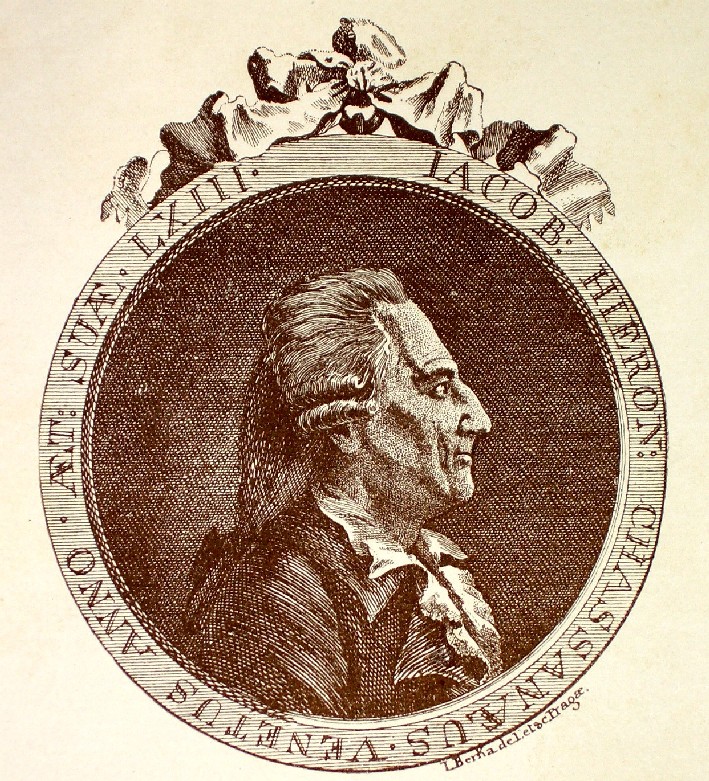 Casanova in 1788 1752 – Zoroastro: Tragedia tradotta dal Francese, da rappresentarsi nel Regio Elettoral Teatro di Dresda, dalla compagnia de' comici italiani in attuale servizio di Sua Maestà nel carnevale dell'anno MDCCLII. Dresden. 1753 – La Moluccheide, o Sia i gemelli rivali. Dresden. 1769 – Confutazione della Storia del Governo Veneto d'Amelot de la Houssaie. Lugano. 1772 – Lana caprina: Epistola di un licantropo. Bologna. 1774 – Istoria delle turbolenze della Polonia. Gorizia. 1775–78 – Dell'Iliade di Omero tradotta in ottava rima. Venice. 1779 – Scrutinio del libro Eloges de M. de Voltaire par différents auteurs. Venice. 1780 – Opuscoli miscellanei (containing Duello a Varsavia and Lettere della nobil donna Silvia Belegno alla nobil donzella Laura Gussoni). Venice. 1780–81 – Le messager de Thalie. Venice. 1782 – Di aneddoti viniziani militari ed amorosi del secolo decimoquarto sotto i dogadi di Giovanni Gradenigo e di Giovanni Dolfin. Venice. 1783 – Né amori né donne, ovvero La stalla ripulita. Venice. 1786 – Soliloque d'un penseur. Prague. 1787 – Icosaméron, ou Histoire d'Édouard et d'Élisabeth qui passèrent quatre-vingts un ans chez les Mégamicres, habitants aborigènes du Protocosme dans l'intérieur de nôtre globe. Prague. 1788 – Histoire de ma fuite des prisons de la République de Venise qu'on appelle les Plombs. Leipzig. 1790 – Solution du probléme deliaque. Dresden. 1790 – Corollaire à la duplication de l'hexaèdre. Dresden. 1790 – Démonstration géometrique de la duplication du cube. Dresden. 1797 – A Léonard Snetlage, docteur en droit de l'Université de Goettingue, Jacques Casanova, docteur en droit de l'Universitè de Padou. Dresden. 1822–29 – First edition of the Histoire de ma vie, in an adapted German translation in 12 volumes, as Aus den Memoiren des Venetianers Jacob Casanova de Seingalt, oder sein Leben, wie er es zu Dux in Böhmen niederschrieb. The first full edition of the original French manuscript was not published until 1960, by Brockhaus (Wiesbaden) and Plon (Paris). |
作品[編集] 1788年のカサノヴァ 1752 - 『ゾロアスター:悲劇』(フランス語訳)、ドレスデン王立劇場で上演される。ドレスデン 1753 - 『ラ・モルチェイデ』、または『サイア・イ・ジェメッリ・ライヴァリ』。ドレスデン。 1769 - ヴェネト州知事アメロ・デ・ラ・ハウゼの歴史に関する協議。ルガーノ。 1772 -ラナ・カプリーナ:ある放蕩者の叙事詩. ボローニャ。 1774 -Istoria delle turbolenze della Polonia. ゴリツィア。 1775-78 -Dell'Iliade di Omero tradotta in ottava rima. ヴェネツィア。 1779年 - ヴォルテール卿の『エローグ』を様々な作家が翻訳する。ヴェネツィア。 1780 -Opuscoli miscellanei(ヴァルサヴィアでの二重唱と、シルヴィア・ベレグノとラウラ・グッソーニの貴婦人の手紙を含む)。ヴェネツィア。 1780-81 -タリーの使者。ヴェネツィア。 1782年 - ジョヴァンニ・グラデニーゴと ジョヴァンニ・ドルフィンの 犬による、10世紀のヴィニツィア軍人と愛人に関する逸話 。ヴェネツィア。 1783 -Né amori né donne, ovvero La stalla ripulita. ヴェネツィア. 1786 -Soliloque d'un penseur. プラハ. 1787 -Icosaméron, ou Histoire d'Édouard et d'Élisabeth quatre qu4-vingts ans passedz les Mégamicres, habitants aborigènes du Protocosme d'intérieur de nôtre globe. プラハ 1788 -Histoire de ma fuite des prrison de la République de Venise qu'on appelle les Plombs. ライプツィヒ。 1790 -難問を解決する。ドレスデン。 1790年 -六角形の複製を作る 。ドレスデン。 1790 -立方体の複製による幾何学的実証。ドレスデン。 1797 -ゲッチュー大学博士レオナール・スネトラージュ、パドゥ大学博士ジャック・カサノヴァ。ドレスデン。 1822-29年 『Histoire de ma vie』の初版が、ドイツ語訳『Aus den Memoiren des Venetianers Jacob Casanova de Seingalt, or sein Leben, wie er es zu Dux in Böhmen niederschrieb』として全12巻で出版される。フランス語原本の初版は、1960年にブロックハウス(ヴィースバーデン)とプロン(パリ)か ら出版された。 |
| Manon Balletti Don Juan Lothario |
マノン・バレッティ ドン・ファン ロサリオ |
★ 審問:(冒頭の再掲)
(1) 「女たらしドン・ファンは、その悪業のゆえに罰せられるべきか?」
・ 全面的イエス:どうしてか、その理由
・ 部分的イエス/部分的ノー:どうしてか、その理由
・ 全面的ノー:どうしてか、その理由
(2) 女 たらしドン・ファンの歴史は、もはや過去のものか?
・ イエス:だったら、現在の男女のセクシュアリティと「騙しや籠絡」とはどのようなものか?
・ ノー:だったら、現在の男女のセクシュアリティと「騙しや籠絡」は変わっていないことに同意するか?
(3) ドン・ファン的気分にある男性を、逆にカモにする美人局(つつもたせ)を知っているか?
・ イエス:つつもたせとはなにか?
・ ノー:美人局の英語は、Beauty Bureauや Badger gameといいます。
※ 【美人局】女が自分の夫や情夫と共謀して、他の男を姦通に誘い、あわや、というときに共謀の男があらわれて、それを種にその男から金銭などをゆすり取るこ と(コトバンク)
| The badger game is an
extortion scheme or confidence trick in which the victims are tricked
into compromising positions in order to make them vulnerable to
blackmail. Its name is derived from the practice of badger-baiting. The trick was particularly effective in the 19th and earlier 20th century when social attitudes toward adultery were much harsher. A famous person known to have fallen victim of the scheme was the first United States Secretary of the Treasury, Alexander Hamilton, whose adulterous affair with Maria Reynolds was used by her husband to extort money and information from him. The badger game has been featured as a plot device in numerous books, movies and television shows. 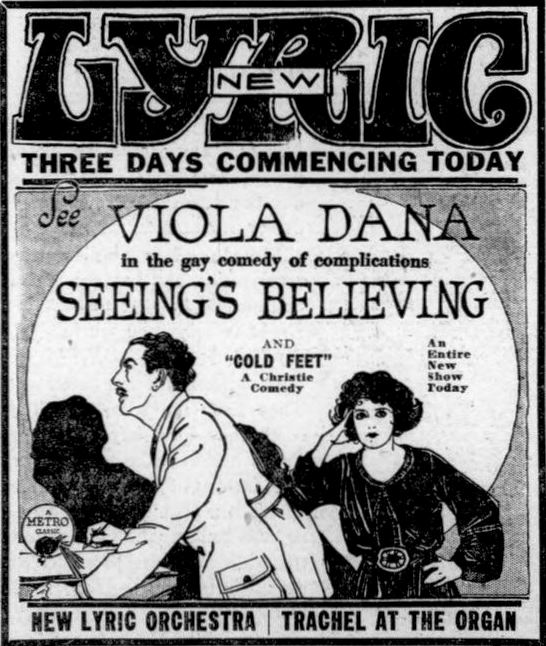 A badger game is often a plot device in American films such as Seeing's Believing (1922). |
アナグマ・ゲームとは、恐喝や
信用詐欺の手口で、被害者を騙して危うい立場に追い込み、恐喝の対象とするものである。その名前は、アナグマを餌にする行為に由来する。 この手口は、不倫に対する社会的態度がより厳しかった19世紀から20世紀初頭にかけて特に効果的だった。この手口の犠牲になった有名人として知られるの が、初代アメリカ合衆国財務長官アレクサンダー・ハミルトンである。彼はマリア・レイノルズとの不倫関係を夫に利用され、彼から金と情報を強要された。 アナグマ・ゲームは、数多くの本や映画、テレビ番組で筋書きとして取り上げられてきた。  アナグマ・ゲームは、『Seeing's Believing』(1922年)などのアメリカ映画でしばしば登場するプロット・デバイスである。 |
| Description In its simplest form, the badger game proceeds thus: a married man begins an extramarital affair. Another man, posing as the other woman's husband or brother, then "discovers" the affair; he then demands money from the man to keep the affair secret. Unknown to the man having the affair, both the woman and the man who demands the money had prearranged the situation and were conspiring against him. The woman may also claim that the sexual encounter was non-consensual and threaten the victim with a rape or sexual harassment charge. Variants of the trick involve luring the victim with the promise of a homosexual act, underage children, child pornography, a bizarre sexual fetish, or some other activity carrying a legal penalty and/or social stigma. In the most typical form of the trick, an attractive woman approaches a man, preferably a lonely married man of considerable financial means from out of town, and entices him to a private place with the intent of maneuvering him into a compromising position, usually sexual. Afterwards, an accomplice blackmails the victim with photographs or similar evidence. Another form involves accusations of professional misconduct. In an example of this form of the trick, a "sick" woman visits a physician, describing symptoms that require her to disrobe for the examination, require the doctor to examine the genitals, or ensure similar scrutiny from the doctor. During the examination an "outraged husband" or "outraged father" enters the room and accuses the doctor of misconduct. The "sick" woman, who is of course part of the deception, takes the side of her accomplice and threatens the doctor with criminal charges or a lawsuit. This form of the badger game was first widely publicized in an article in the August 25, 1930 edition of Time magazine.[1] Non-sexual versions of this trick also exist, particularly among ethnic and religious groups with strong social taboos, for example inducing a Mormon to gamble or drink alcohol in violation of his religious vows, and then demanding money to keep the indulgence secret and thus preserve his reputation.[2][3] |
説明[編集]。 最も単純な形では、アナグマ・ゲームは次のように進行する:既婚男性が婚外恋愛を始める。そして、相手の女性の夫か兄弟を装った別の男が不倫を「発見」 し、不倫を秘密にするために男に金を要求する。不倫をしている男性にはわからないが、女性と金を要求する男性の両方が、この状況を事前に準備し、男性に対 して共謀していたのである。 女性はまた、性的な出会いは合意のないものだったと主張し、被害者をレイプや セクハラで脅すこともある。 この手口のバリエーションには、同性愛行為、未成年の子ども、児童ポルノ、奇妙な性的フェチ、あるいは法的処罰や社会的汚名を伴うその他の行為を約束して 被害者を誘い出すものがある。最も典型的な手口では、魅力的な女性が男性、できれば町外から来た経済的に余裕のある孤独な既婚男性に近づき、通常性的な危 うい立場に誘導する目的で、人目につかない場所に誘い込む。その後、共犯者が写真や同様の証拠で被害者を脅迫する。 もう一つの形態は、仕事上の不正行為を告発するものである。この手口の一例では、「病気の」女性が医師を訪れ、診察のために服を脱ぐ必要がある、医師に性 器を調べる必要がある、あるいは医師から同様の監視を受ける必要がある症状を説明する。診察中に「憤慨した夫」または「憤慨した父親」が部屋に入ってき て、医師の不正行為を非難する。病気の」女性は、もちろん欺瞞の一部であり、共犯者の味方をし、医師を刑事告訴や訴訟で脅す。この形のアナグマ・ゲーム は、『タイム』誌1930年8月25日号の記事で初めて広く知られるようになった[1]。 このトリックの非性的なバージョンも、特に社会的タブーの強い民族や宗教集団の間に存在する。例えば、モルモン教徒が宗教的誓約に反してギャンブルや 飲酒をするように誘導し、その耽溺を秘密にして評判を保つために金銭を要求するようなものである[2][3]。 |
| Clip joint Entrapment Hamilton–Reynolds affair "The Medicine Man" Romance scam |
クリップジョイント エントラップメント ハミルトン-レイノルズ事件 "メディスン・マン" ロマンス詐欺(→結婚詐欺) |
| https://en.wikipedia.org/wiki/Badger_game |
★ ロ マンス・スカム(ロマンス詐欺)→「新宿タワマン殺人 事件」
リ ンク
文 献
そ の他の情報
Copyleft, CC, Mitzub'ixi Quq Chi'j, 1996-2099
☆
 ☆
☆
++
Copyleft,
CC, Mitzub'ixi Quq Chi'j, 1996-2099